
Blog 76 by Tan: Cameroonian Christmas
The next morning, we woke up and casually packed before tracking down some breakfast and heading for the border. Although we’d had some memorable experiences in the country, I can’t say I was sad to be leaving Republic of Congo. The obvious highlight of traveling RoC was taking our new friend Jack to visit the Bayaka, and it more than made up for any of the challenges we had faced. However, our time in both Congos had been intense. We were looking forward to moving on to something different and hopefully a bit easier.
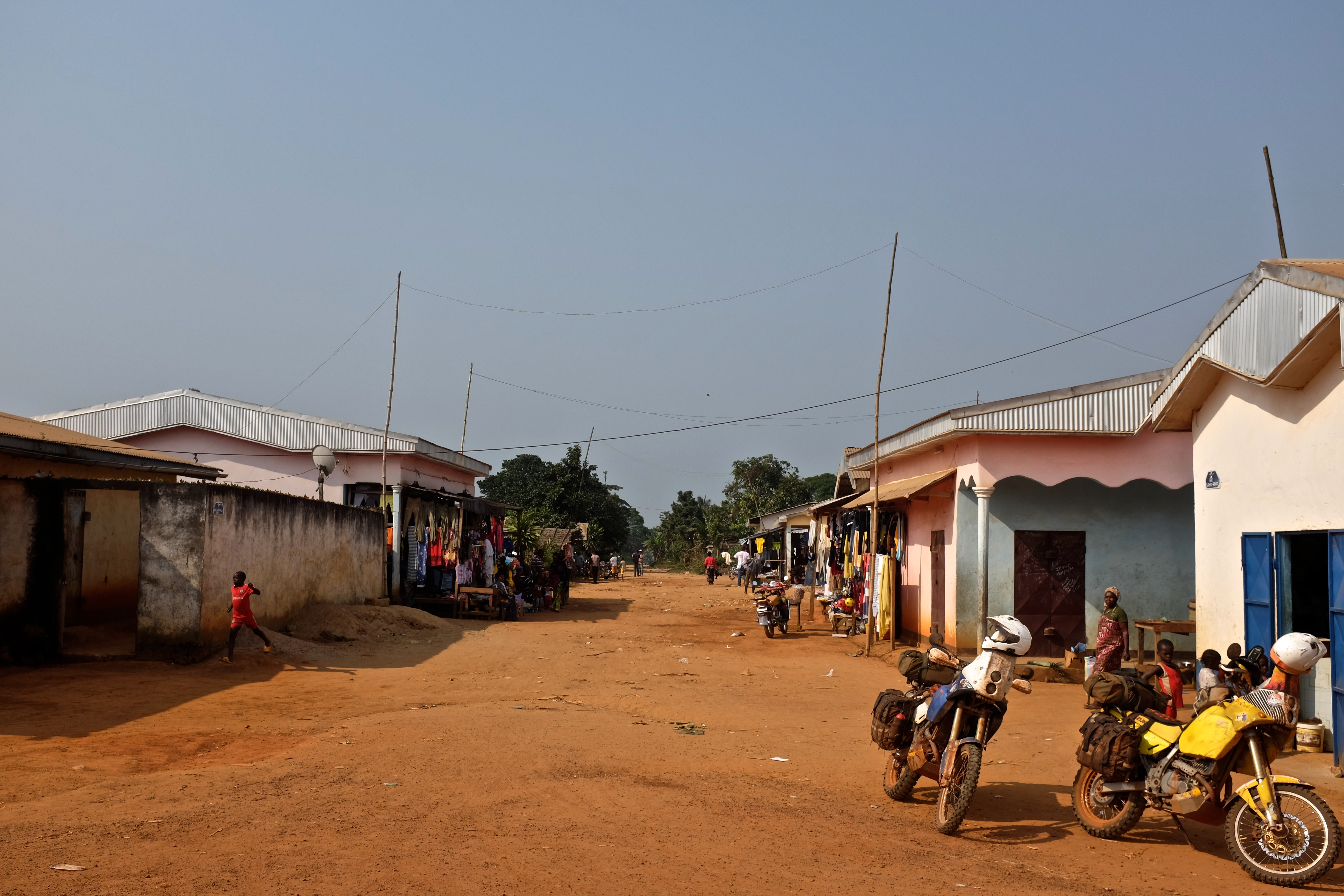 Souanke – Republic of Congo. Sadly, we didn’t stay long enough to get the measure of the place.
Souanke – Republic of Congo. Sadly, we didn’t stay long enough to get the measure of the place.
According to my reading, Cameroon was described as ‘Africa in miniature’ based on its geographical and cultural diversity. We saw it as a gateway between Central Africa and West Africa, and a kind of fusion of the two. We couldn’t have been keener to get there.
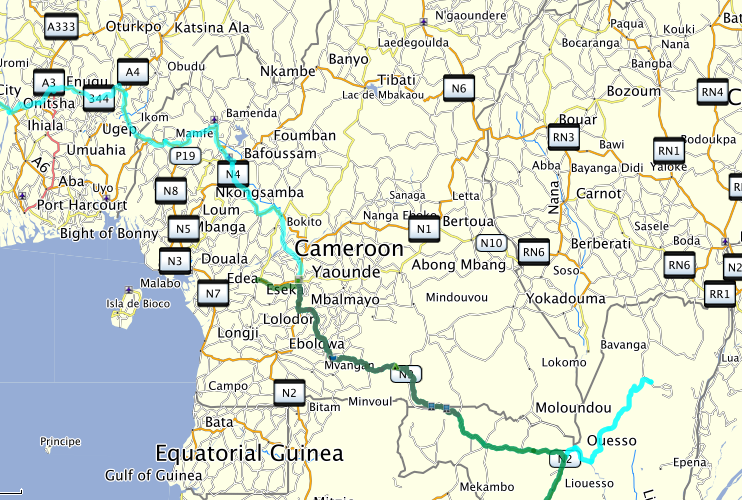 Fun fact – Cameroon was named by a Portuguese sailor who arrived at a river in Douala and noticed it was full of prawns, so he called it Rio Dos Camarones (River of Prawns). Let’s face it, the sailor in question, Fernando Poo, could hardly name the place after himself.
Fun fact – Cameroon was named by a Portuguese sailor who arrived at a river in Douala and noticed it was full of prawns, so he called it Rio Dos Camarones (River of Prawns). Let’s face it, the sailor in question, Fernando Poo, could hardly name the place after himself.
As with many borders in Central Africa, you don’t need to wait long for the almost inevitable request for cash. Ours didn’t happen on the immigration side. Instead, we were swiftly stamped into the country. But the moment this was done, things went quiet between the immigration and the customs blokes with words conveyed through a few furtive looks. We knew it was coming. Immigration guy stopped making eye contact, and the more assertive customs guy took the reins.
As was our border crossing modus operadi, we had chosen a lesser-used crossing into Cameroon. It was narrow dirt roads through the forest most of the way. The immigration offices were small and basic as you’d expect for a minor border crossing. The Customs guy took on a typical big man pose and let us know in no uncertain terms that we would be giving him a bunch of money, or he wouldn’t be stamping our documents. He was particularly brazen and made no attempt to conceal the shakedown behind trumped-up, non-existent taxes or levies.
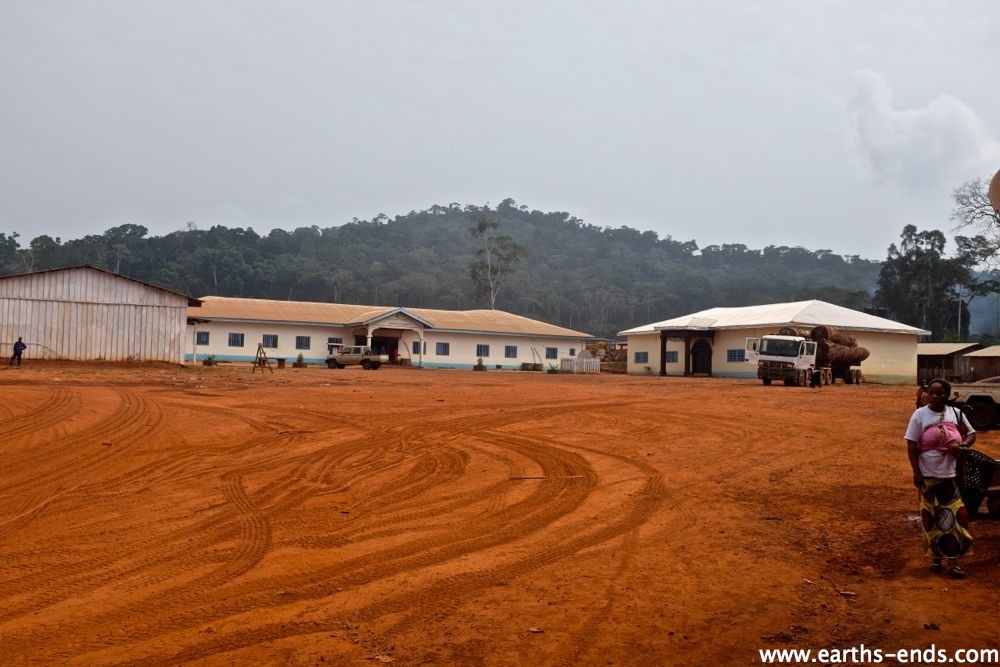 The RoC border – the building on the left is the Department of Forestry office. The building on the right are the same construction but with an ornate Chinese entrance. It appears to be a logging company office. Cosy bedfellows.
The RoC border – the building on the left is the Department of Forestry office. The building on the right are the same construction but with an ornate Chinese entrance. It appears to be a logging company office. Cosy bedfellows.
It was a straightforward proposition – we wanted a stamp, he had a stamp, we had money, he wanted money….Simples! He wouldn’t say how much. He just wore a sly smile and said it would be a lot. While the audacity was new and irritating, the most striking thing about it was that it took place under the watchful eyes of Jesus. Right behind him was a near 10ft high technicolour canvas of a literal larger than life-size, open-palmed, white-skinned, blue-eyed, haloed Jesus.
Fatigue, frustration, and anger hit us like a ton of bricks. I lost my temper. Seconds later, Mick lost his. It wasn’t a pretty sight as we turned into a couple of jerks. At one stage, I explained to the Customs guy he was being corrupt in front of Jesus. Really not the way to go about things. We’d developed hair triggers, and worse than that, we had developed them simultaneously.
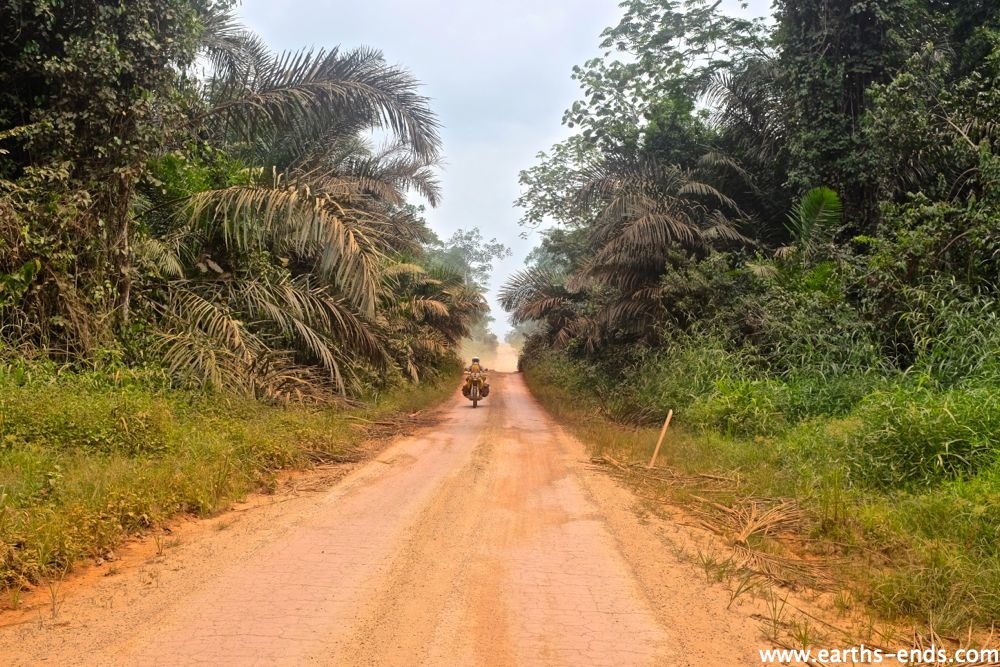 The road from the border.
The road from the border.
In the Republic of Congo we experienced the most overt corruption of anywhere we had been on the trip so far. In Transparency International’s 2015 Corruption Perception Index had the Republic of the Congo, the Democratic Republic and Chad all tied for position 147 out of 167 countries. But we found what we experienced in Republic of Congo harder to deal with. Our encounters with people in uniform wielding power here were just far more aggressive than anything we experienced in DRC.
The requests for kickbacks were gentler and sometimes with a sense of desperation in DRC. Deep in the DRC interior, it was hard to be angry at the disheveled, sometimes barefooted Gendarmes meekly asking for cash or cigarettes. Who knows when the last time they were paid. It was a world apart from the hostile, well-oiled shakedown racket of the Republic of Congo. We gently refused requests for bribes in DRC and often shared snacks, cigarettes, and handshakes there. It was a different scene here in RoC. And not very nice.
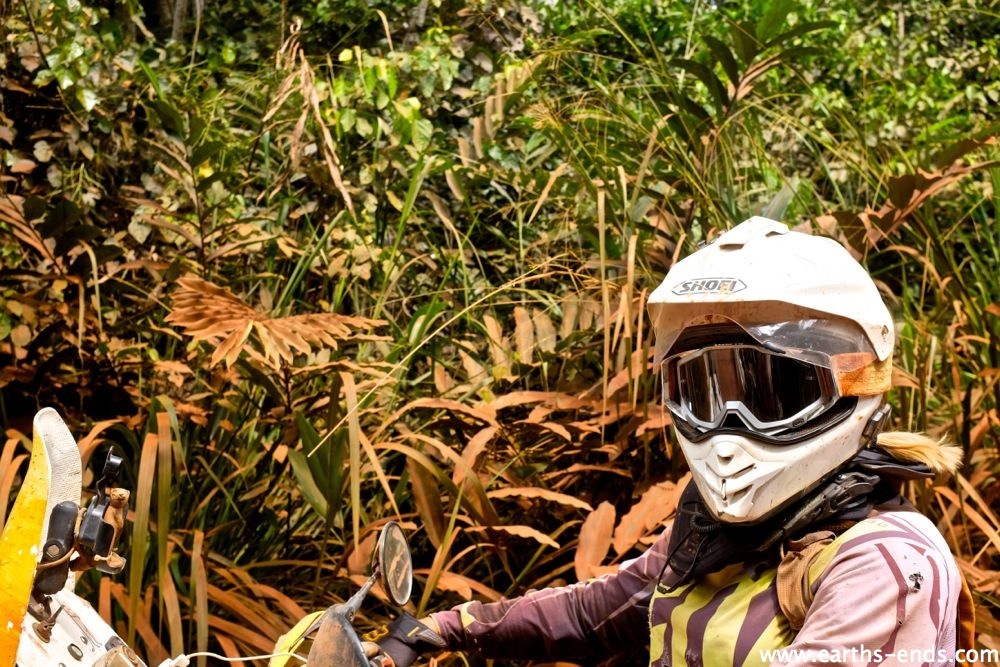 We barely saw another vehicle at all.
We barely saw another vehicle at all.
Riding through the more trying parts of Africa can get frustrating at times. We’ve always managed this well being a duo. When one of us hit our patience limit, we could tap out and have the other person take over. This kept situations and heads cool and us travelling on our merry way. But that natural balance had been eroded by the background stress of the last month. The slightest provocation (always in the form of shakedowns) had us mad as cut snakes. It was a recipe for trouble in these parts that we were both struggling (and often failing) to keep our cool.
It was a significant cause for concern. We knew we needed to take some time off riding as soon as possible. We had been waiting to take a break somewhere low-key on the coast of Benin or Togo. However, our behaviour (and apparent lack of control over it) had us planning some immediate downtime. We had some errands to take care of in the capital Yaoundé. So we resolved to keep our shit together until then and find a decent place to rest up and decompress before taking on Nigeria.
Still feeling surly from our nasty border experience, we were keen to put some distance between it and us. We didn’t end up paying anything, and they soon got sick of the sight of us and sent us on our way.
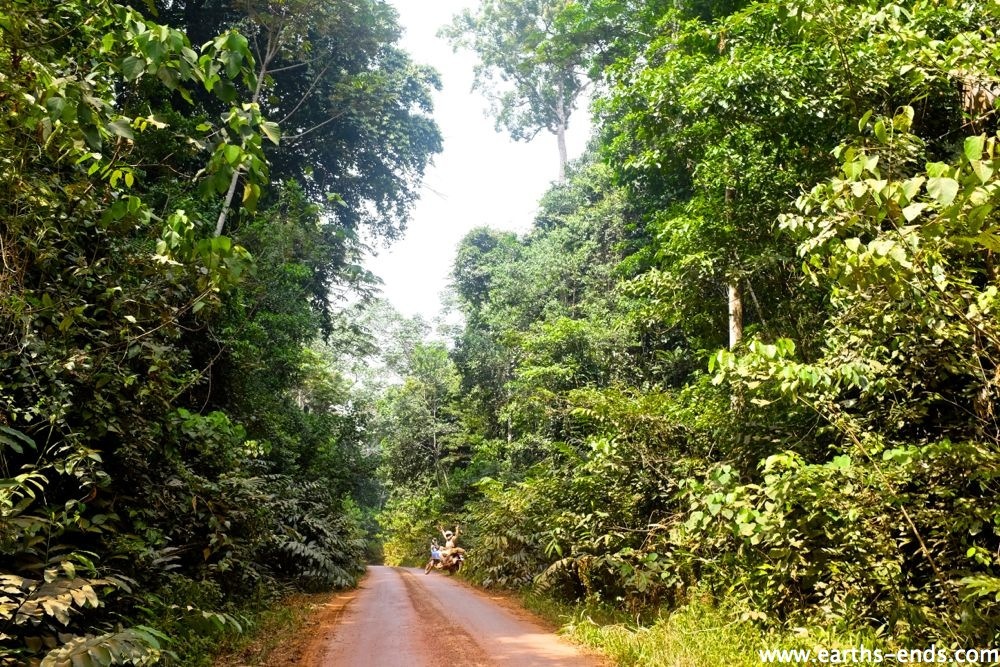 The road would be a handful with a bit of water on it. But in the dry, it was a dream.
The road would be a handful with a bit of water on it. But in the dry, it was a dream.
Cameroon’s border was a breeze and a picture of professionalism. The Cameroonian officials had an air of efficiency and no-nonsense. We were processed straight away and were once again moving.
The road from the border continued past logging areas where Chinese supervisors stuck out like sore thumbs. The forest road was simple fun riding. The only downside was the sneaking suspicion large tracts of the forest we were enjoying were not long for this world.
At one point, we encountered a lonely roadblock where an imposing Cameroonian soldier asked to check our documentation. After the usual questions, he asked us if we had children. We answered no, and he seemed both pained and confused by the fact. He told us that he had 13 children and bid us farewell with the question sincerely asked, “What is a man without children?”
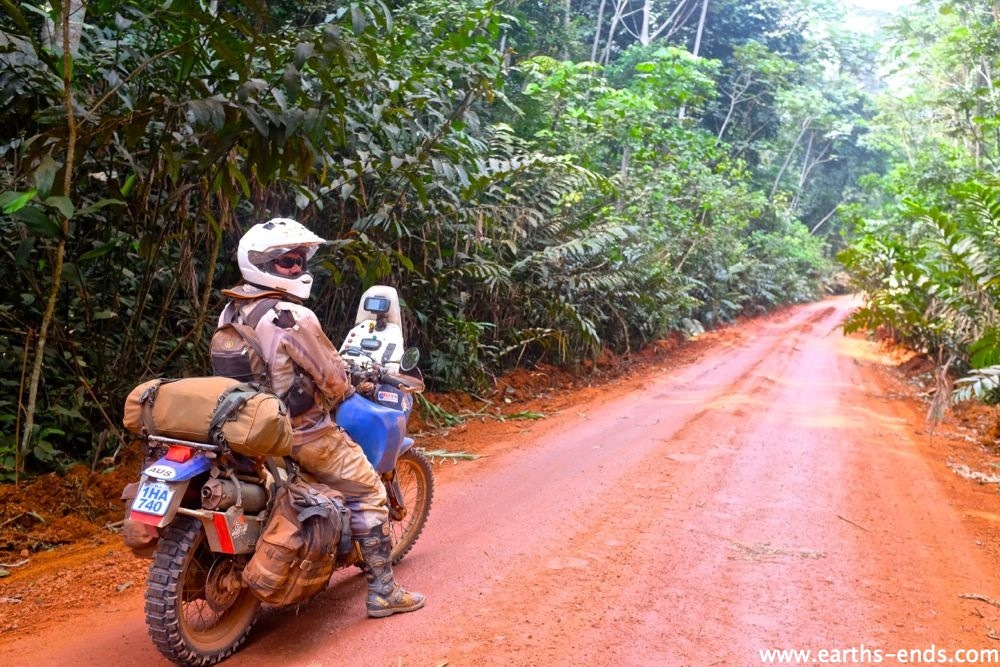 An orange-hued Mick.
An orange-hued Mick.
In the late afternoon, we came across a small town. After fueling up and downing some service station snacks, we set off on the remaining 110kms to Sangmelima. The road from the border had turned to brand new tar 30km back, so we figured it would be tar from now on. That thought was soon dispelled when we found ourselves on an appalling dusty road, badly chopped up by countless logging trucks. And so began the most frightening section of riding of all our time in Africa.
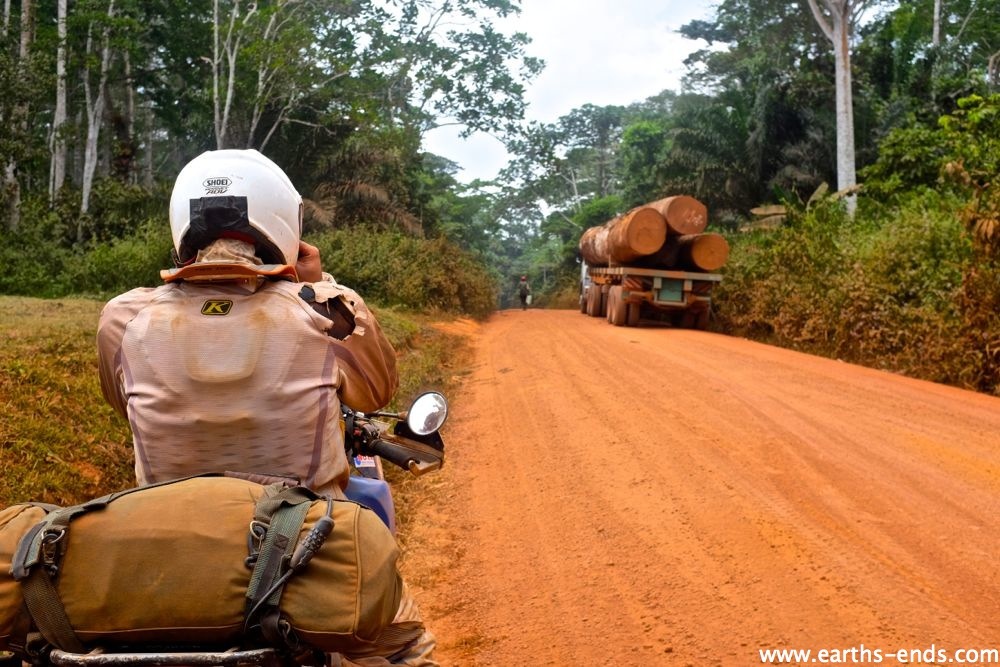
There were plenty signs of logging.
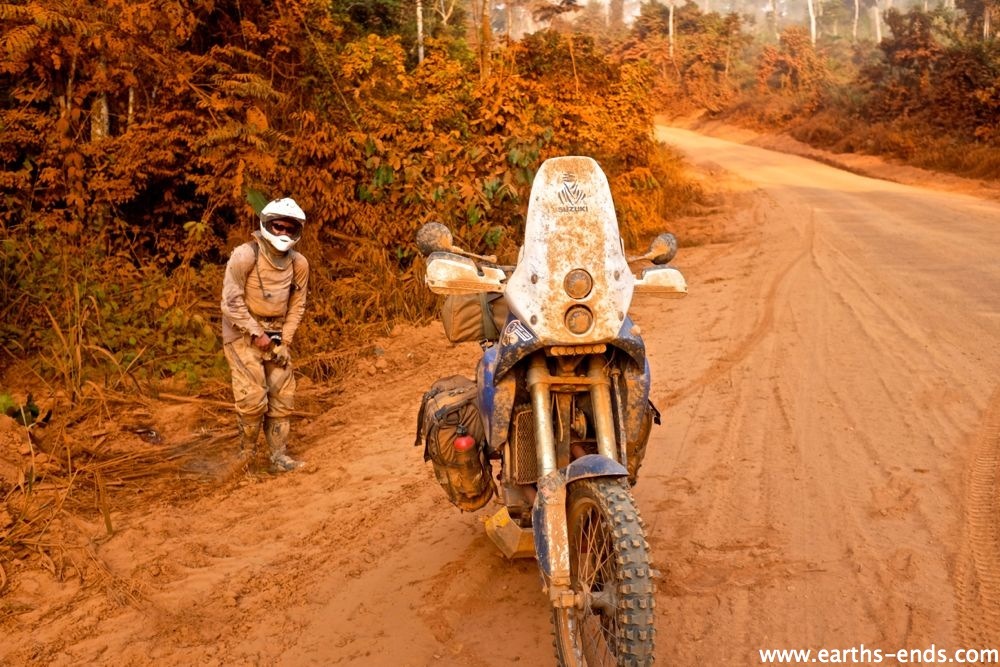
Mick answering nature’s call at one of the calmer parts of the terrifying road.
I remembered thinking that if one of us was to have a fatal accident on this trip, it would be here and now, on this road. It’s with this thought in my head and eyes the size of saucers that I rode in near to no visibility, through invisible deep dust bowls with a procession of thundering logging trucks in both directions. The unhelpful words playing through my mind “this is where we die.” Mick was likely far braver but recorded the following notes in our diary that night:
“Dusty as f@!k. Dusty like crazy. Motherf@!king dusty as hell. That’s how dusty. F@!k.”
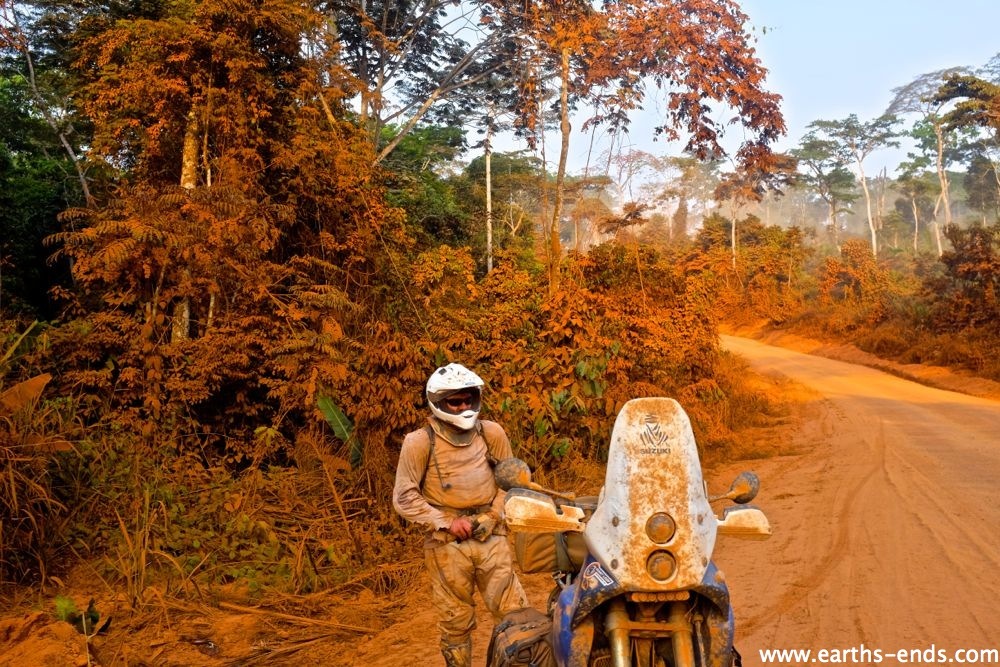
Road doesn’t look too bad here. Trust me it was a nightmare.
Our slow progress had us arrive in Sangmelima after 7pm, about 40 minutes after sundown. At one of the police checkpoints just outside the town, I made the silly move of asking the copper the name of a good hotel. He gave me the name of a place. It was now just a matter of finding it.
It was long past dark, and the town’s lighting was not conducive to finding the hotel or any alternative. We were a bit stuck before I had the bright idea of finding the town’s ‘China shop’ and asking the owners in Chinese for a recommendation of a place to stay. This was to become a tried and true method for getting the information we needed quickly when my French wasn’t getting us over the line. English was not common here. It worked like a charm, and we actually had a guide from the shop to lead us there. We got a room and a beer and went to bed grateful to have made it there in one piece.
The next morning the front desk staff informed us the policeman from the previous night had come looking for us, but they had managed to get him to clear off. He had decided that we owed him some cash for one word of assistance in giving us the hotel’s name. Luckily we didn’t see him again. The hotel had enough pull, it seemed.
We ended up staying a couple of days rather than arrive in the capital Yaoundé at the start of the weekend. Capital cities tend to be busy, less pleasant, less secure, and expensive. We, therefore, try to minimise our time in them. But when visas are required, there is no option. The trouble for us was being unemployed nomads, we seldom know what day it is. A strange phenomenon seemed to be at play on the trip. Invariably, if we were a day off arriving in a capital city, we would almost certainly find it to be Friday.
We were comfortable in the nice, reasonably priced hotel, so spent a couple of days chilling, eating excellent food, using sad wifi, and allying the front desk staff’s fears about our impending travel through Nigeria.
In between lounging around, Mick saw to the ever-present bike maintenance. He tried to seal the fork seals, succeeding with mine, failing with his own. After all the fine dust of the ‘logging road of doom,’ Mick made sure he cleaned and replaced the filter skins and cleaned, lubed, and tensioned the chains. He also replaced an indicator that had vibrated itself off somewhere in one of the Congos.
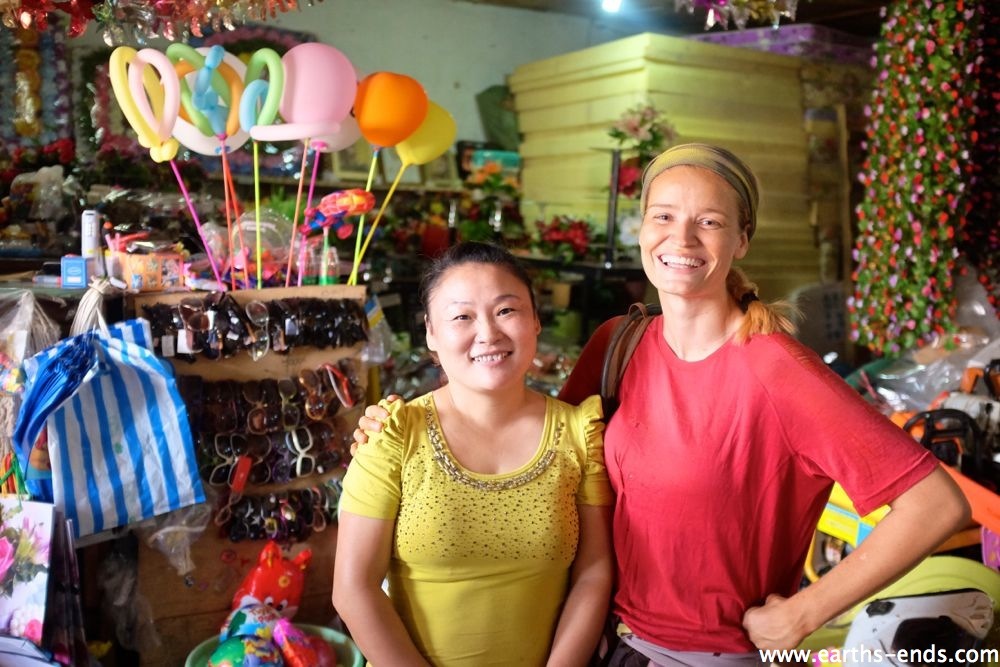
Before leaving town, we revisited the China shop and had a chat with the owner. It was the usual story of constant work, isolation, and infrequent visits home. She worked 7 days a week and only took 2 weeks off every 2 years when she returned home to visit her son, who lived with parents in rural China. How fortunate we were in Australia with weekends, public holidays, and minimum 4 weeks vacation a year.
Mick replaced his broken sunglasses with a pair of knock off designer ones, and we set forth for the capital. Before leaving, the woman gave us the name of her sister’s Chinese restaurant in Yaoundé. We committed to dropping in to treat ourselves to some authentic Chinese cuisine.
After 175kms we arrived in Yaoundé. Traffic and navigation was nice and manageable for a reasonably big city. Unfortunately, our Sena batteries went flat right before arriving, so we were without comms. This made for an unpleasant time when a taxi driver got it in his head that Mick had grazed against his cab in traffic. I was behind and saw he was actually a good foot away from the cab. When the angry taxi driver couldn’t catch Michael, he started tormenting me by chasing me through traffic, trying to run me off the road and into oncoming traffic. It was pretty scary and had me shaking by the time I caught up with Mick. It didn’t make for the best of introductions to the place.
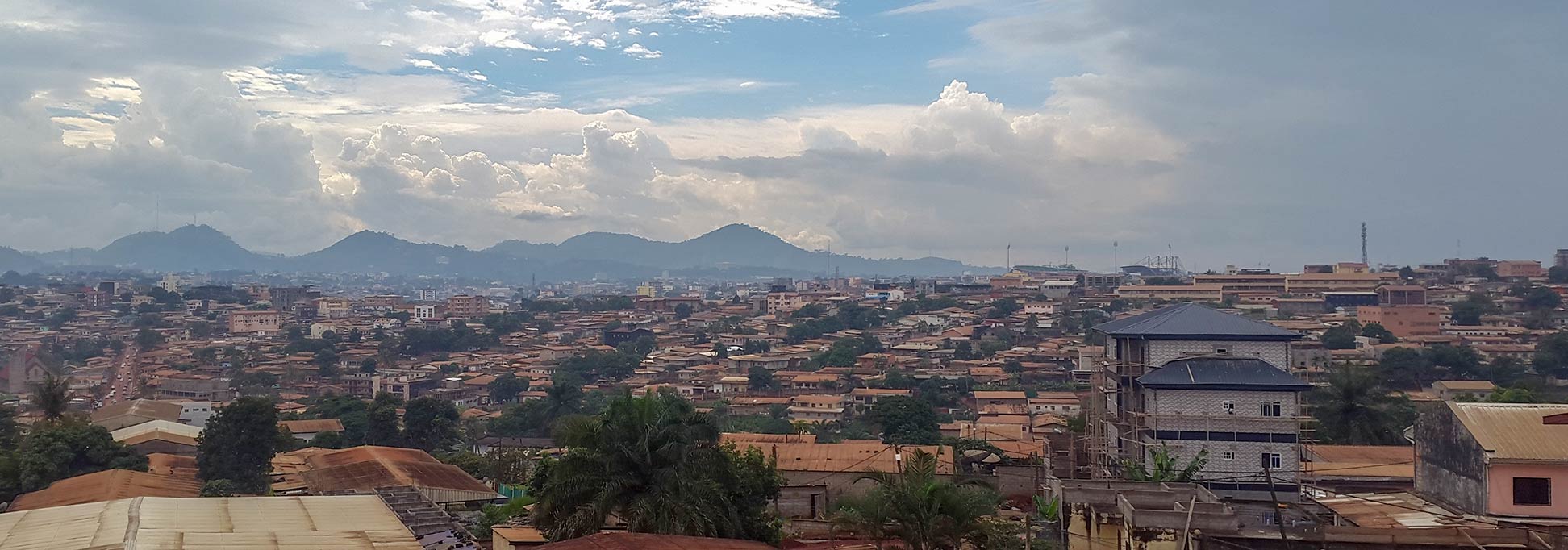 View of the outskirts of Yaoundé. We didnt take nearly enough photos at this point in our travels so have borrowed. Image: Frederic Papy
View of the outskirts of Yaoundé. We didnt take nearly enough photos at this point in our travels so have borrowed. Image: Frederic Papy
We were all set for upcoming visas and only needed to find some rear tyres. There isn’t much availability for motorcycle spares in West Africa if you’re riding anything but a little 150cc local bike. Planning resupply points, therefore, takes a bit of thought. We intended to replace them at the KTM dealer in Togo, but it was looking like the current tyres wouldn’t make it. Call us over-cautious, but we aren’t the type to ride a tyre down to fibres. I’d once come off the road and into a ditch on a bald tyre, and had no desire to add to already decent risks presented on African roads.
We tried the Yamaha dealer with no luck. Tyres could only be procured with 2 months’ lead-time… no good. We got some rough directions for an area that might have second-hand tyres, and went to a nearby hotel and checked in for a rest. In the end the second-hand options were a couple of half worn motocross tyres that wouldn’t last long on the upcoming tar roads. Or there were a couple tyres in worse condition than our current ones. So we just needed to ride carefully on the ones we had until Togo.
While we were in town, we thought we’d try to track down the Chinese restaurant of the China shop seller’s sister in Sangmelima. With scant directions, we found the restaurant despite its obscure location. The prospect of knocking back a beer and some Sichuan chicken and chao mian compelled us into performing a navigational near-miracle. Much pleasure was derived from that meal, believe me!
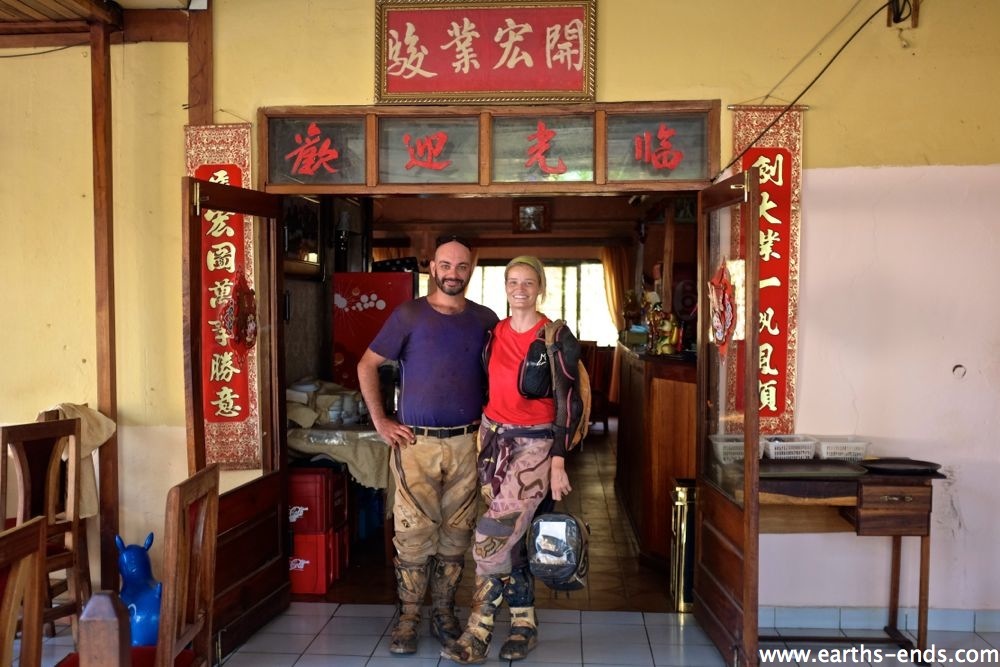
The hidden gem of a Chinese restaurant.
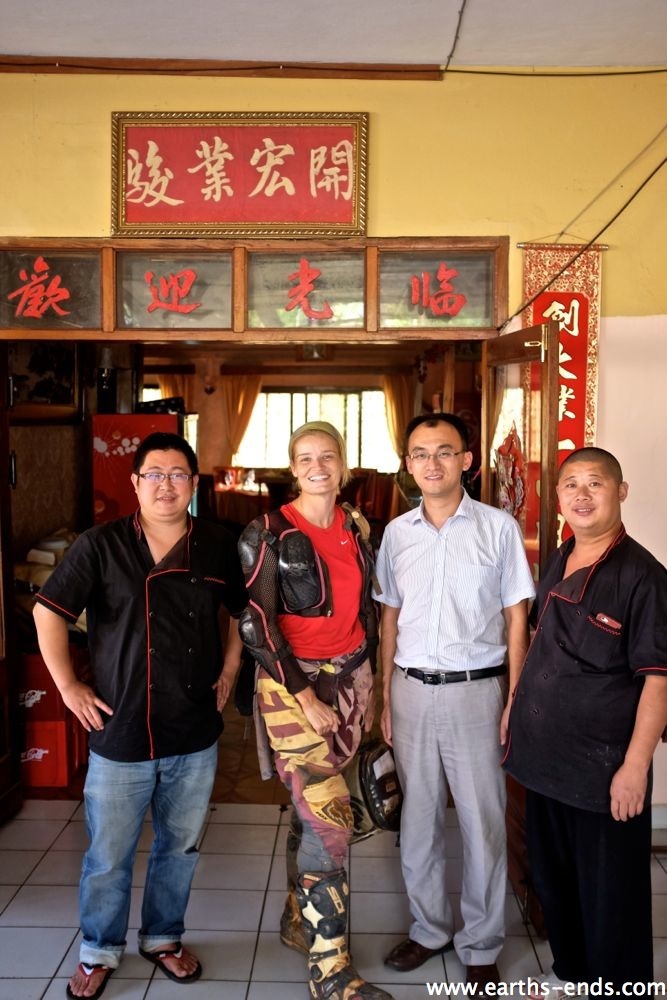
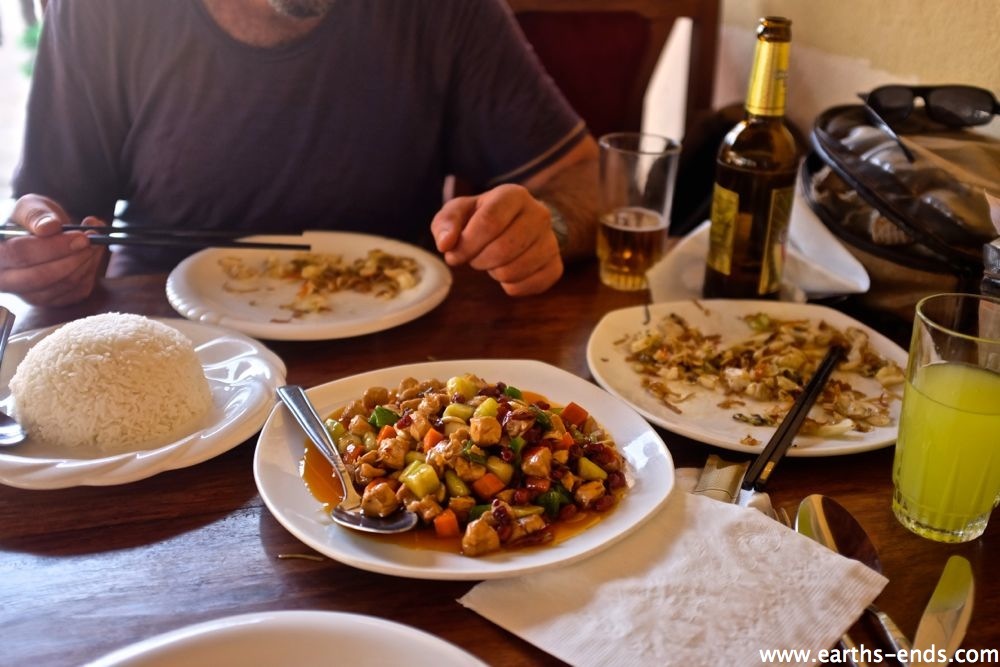
The feast.
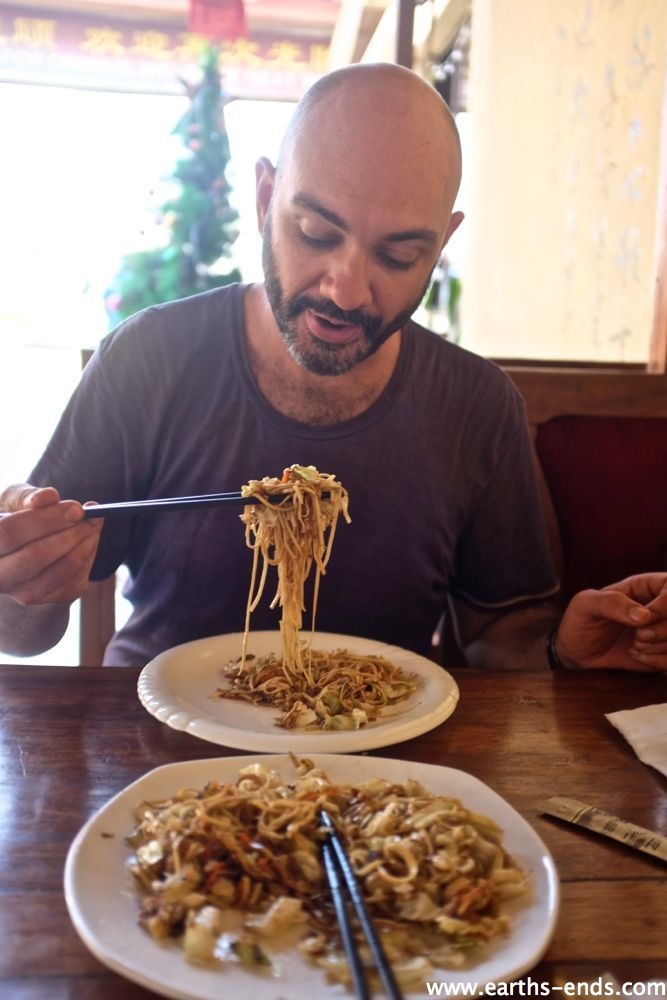
We annihilated it.
Having failed at sourcing tyres we couldn’t see much of a reason to stay on in the capital. After a couple days, we checked out of the hotel, packed up the bikes, and got dressed. It was only after this 90-minute ritual was complete that we realised that we were dog-tired and not all that interested in traveling to the beach at Limbe for Christmas as planned. It wouldn’t be the first time we did this dance. And with that, we checked in once more and carted all our gear up an obscene amount of stairs and settled in for Christmas in Yaoundé.
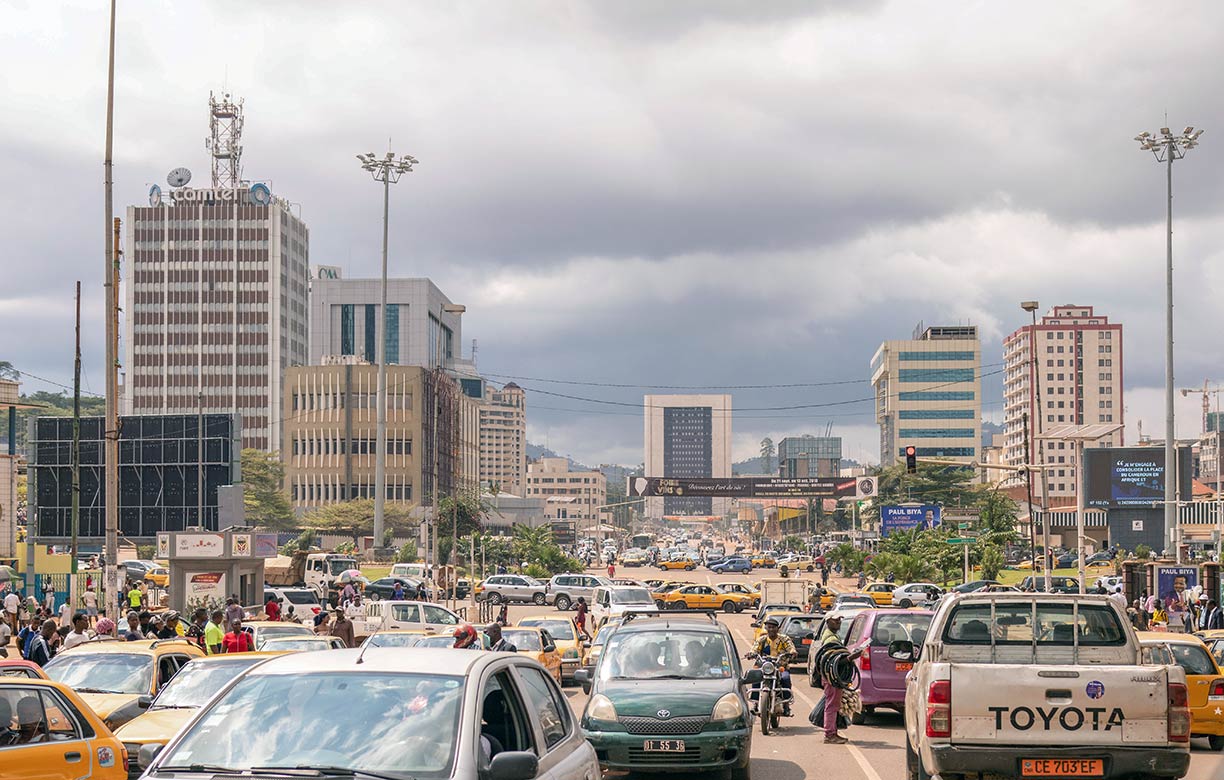 Downtown Yaoundé. Image: Gilles van Leeuwen
Downtown Yaoundé. Image: Gilles van Leeuwen
While far from the most scenic place to stay, the inner city hotel we chose was not too expensive at 15,000 XOF (~25USD) a night and suited our needs. And it was quiet. It was everything we needed. It was time to do nothing but restore our energy reserves that had fallen off a cliff of late. We were so drained we thought we might be playing host to some kind of parasite, so knocked back a couple de-worming tablets and engaged rest mode.
We found Yaoundé to be a pretty nice city. Unlike most African capitals, Yaoundé was picturesque as the city was spread over several hills. It reminded me somewhat of Kigali, Rwanda but less green. The largest buildings were your typical 70s-era chic, but some of them had flair and made for the most interesting architecture we’d seen all trip.
 Just some of Yaoundé’s distinctive architecture. A bunch of government buildings on the left. Bank of Central African States on the right. These are just pics from the internet.
Just some of Yaoundé’s distinctive architecture. A bunch of government buildings on the left. Bank of Central African States on the right. These are just pics from the internet.
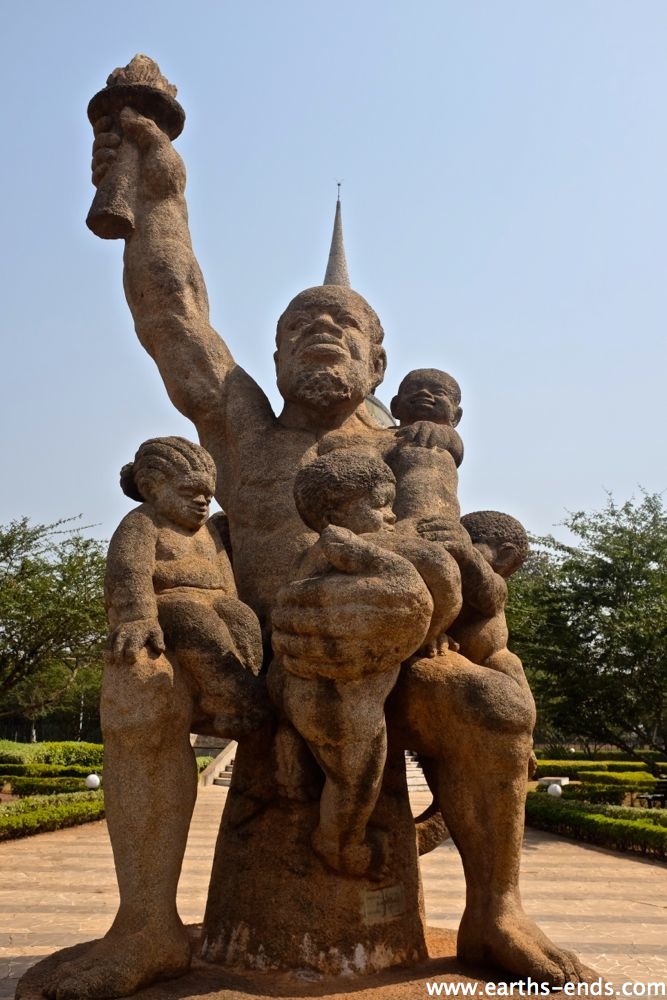 The Monument de la Reunification (Reunification Monument) was constructed to celebrate post-colonial merging of British and French Cameroon that occurred in 1961.
The Monument de la Reunification (Reunification Monument) was constructed to celebrate post-colonial merging of British and French Cameroon that occurred in 1961.
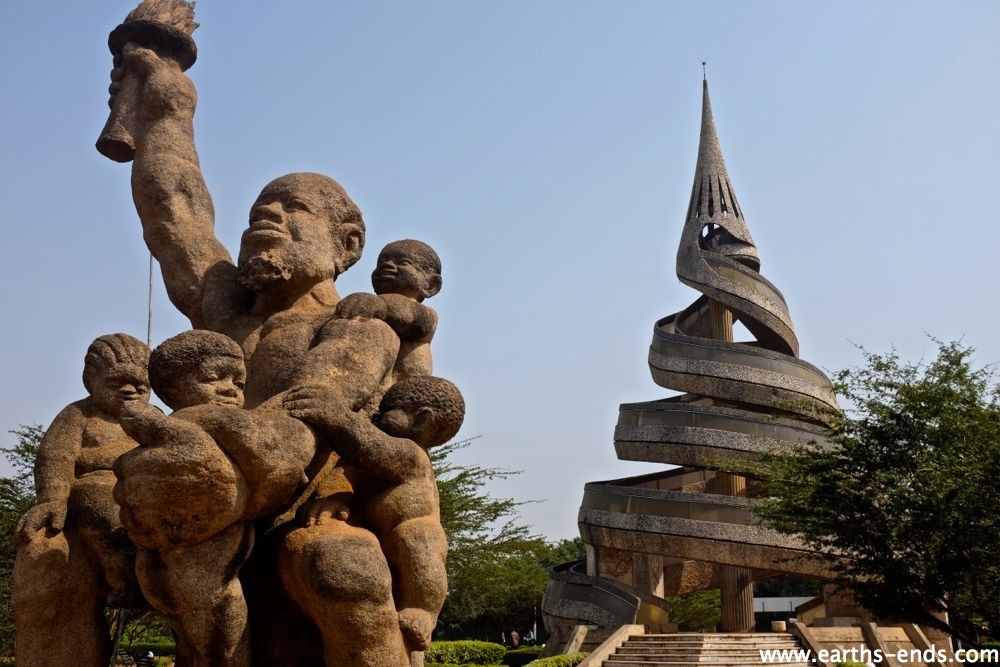
The spiral structure has two serpents (representing France and England) merging into one at the top. The man in the statue represents the generation that fought for reunification. There are for children, 2 girls and 2 boys, said to emphasise the equality of opportunities between girls and boys.
Over the next week, we did little but sleep, eat, surf the net, read and work on the blog. Every now and then we’d jump on the bikes and attack with relish the incredible Greek run bakery in the middle of town. We weren’t overly enthused for the festive season but figured we should do something to mark our second Christmas on the road. We tracked down a fancy Indian restaurant for Christmas Eve dinner. Non-traditional but great.
Christmas day passed in the usual manner of doing little more than chilling, eating and watching copious amounts of French dubbed Mexican telenovelas. These Mexican telenovelas were huge in Cameroon, with the same episode playing at least 4 times throughout the day. The hotel restaurant where we set ourselves up had a TV busting out these shows from dawn till dusk. Watching them was unavoidable. With intense over-acting and sheer repetition, I had managed to piece together what was going on, and it did wonders for my limited French. When I noticed myself eagerly anticipating the next day’s episode, I realised it was probably time to get moving again. So we checked out, packed up the bikes and got dressed yet again. But this time we actually left.
 I will always associate my time in Yaoundé with the 2012 Mexican drama Corazón Valiente (Fearless heart). The premise was two hot bodyguard sisters falling in love with the rich men they were protecting. I kept waiting for a scene where someone from HR found out about, but it never came.
I will always associate my time in Yaoundé with the 2012 Mexican drama Corazón Valiente (Fearless heart). The premise was two hot bodyguard sisters falling in love with the rich men they were protecting. I kept waiting for a scene where someone from HR found out about, but it never came.
https://www.youtube.com/watch?v=iisT9g0sjlw
On the subject of Cameroonian cultural phenomena I have to share this song – Collet la Petit by Franko. We heard in multiple times a day all through Central Africa. LOVED IT!!!!
We were blessed with manageable traffic out of the city, and it felt excellent to be moving again. We made it as far as Bafoussam, where we had more trouble than usual finding a hotel that was secure and had a place nearby to eat. After a fair few attempts, we found a nice, secure place for just 10,000 francs. Dinner was excellent street food of grilled fish with spicy peanut sauce and manioc served on a palm leaf. It was one of the most fantastic meals to date in the most modest of food stalls and all for 1000francs – $1.66. Bellies full we slept like babes.
After a nice sleep in, we packed up and went to the food stalls from the previous night to have breakfast. Not long after arriving, we started to get hassled by a very drunk, possibly crazy guy that wouldn’t leave us alone. He was loudly demanding money and seemed to be saying that his mother was a dangerous woman and he would get her to curse us if we didn’t give money to him now. It was always drunk men (or men keen to get that way) that caused us this kind of trouble.
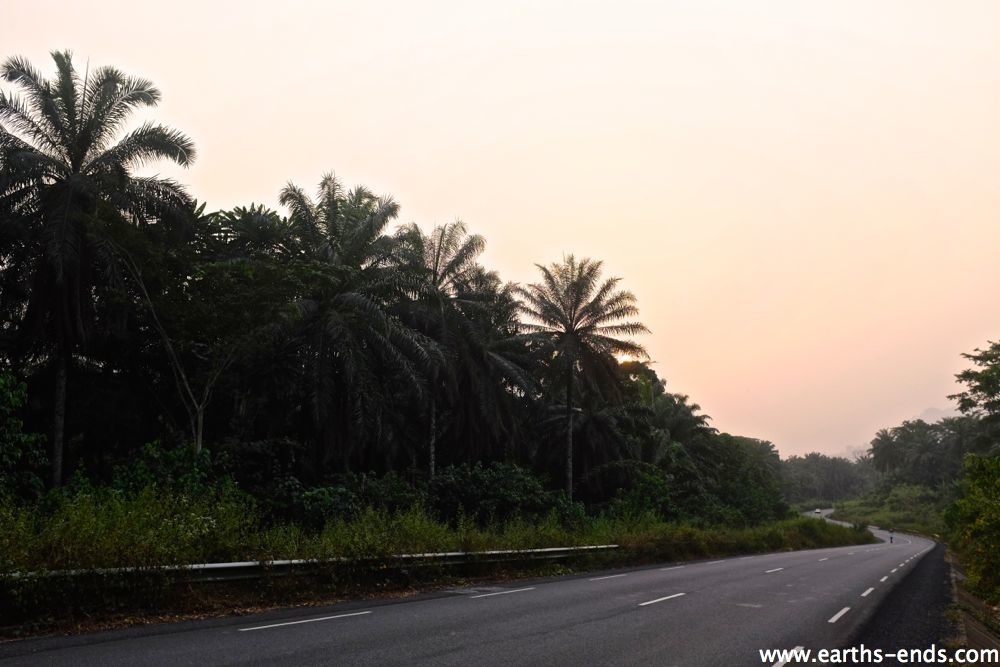
It was smooth and we had it almost all to ourselves.
We went back to the hotel and checked out only for the same guy to follow us threatening more curses and harm. Luckily the curse didn’t stick, and we managed the hideously pot-holed road to Bamenda without a hitch. The ride made for very slow, very exhausting riding. We stopped in Bamenda for lunch and a rest. We found a small health food restaurant (of all places) where we had a colossal shwarmer (not sure how that got on the menu), juice and a couple cups of good coffee. Food-wise things were really on the up and up after Central Africa.
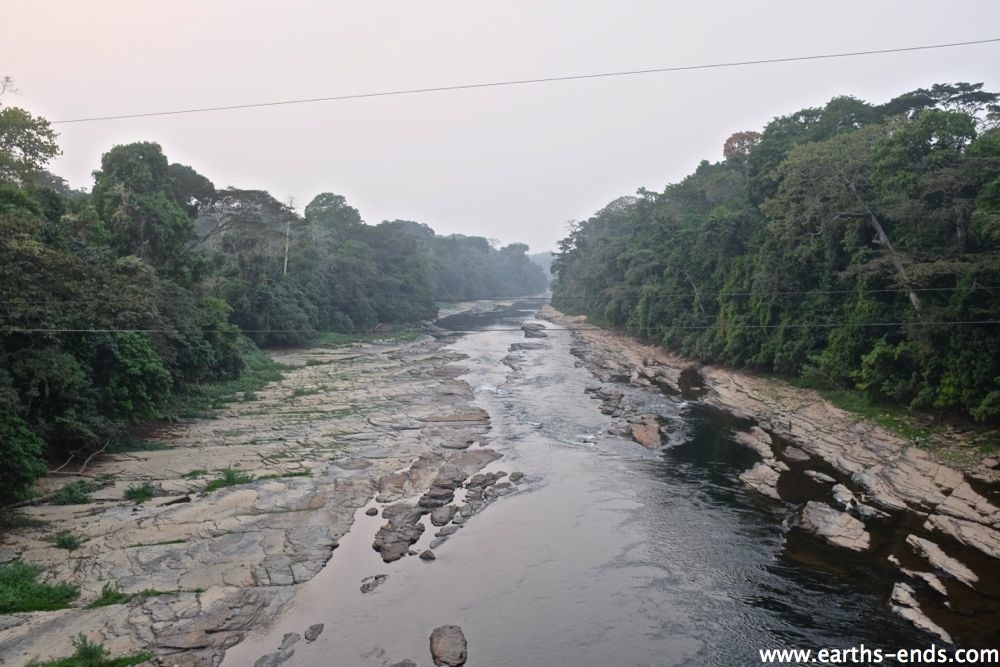
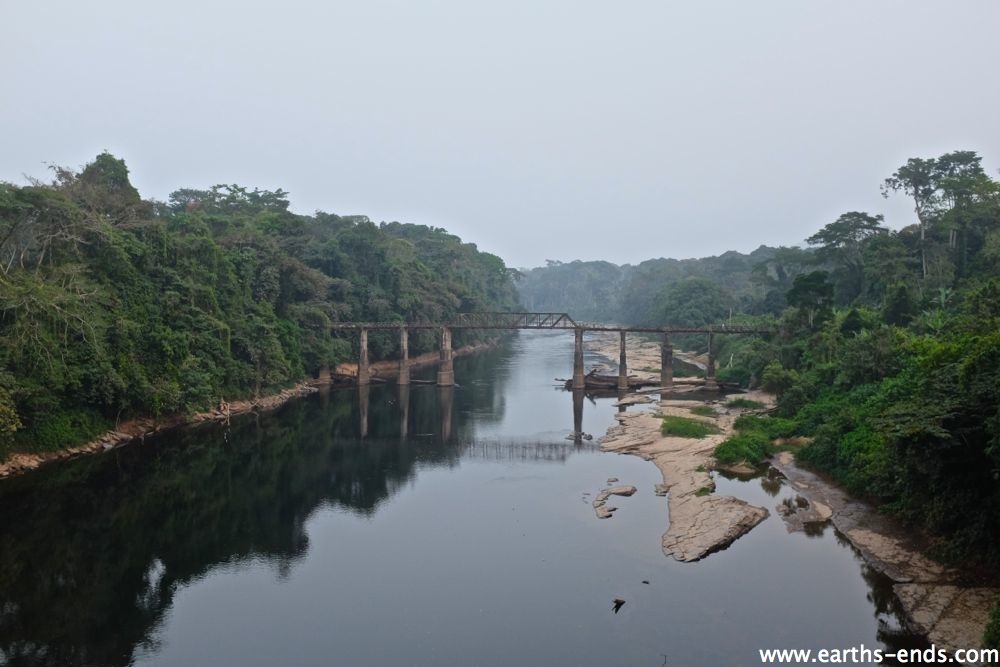
View of an old bridge from a new one.
We jumped on the bikes again and cruised along a new road, free of traffic and erratic drivers. To top it off, we were greeted with scenic views at the end of the day. The great day of riding in Africa was sealed when we secured ourselves a hotel in Mamfe for 10,000 francs. The rich day’s riding had us feeling good about being moving again and feeling ready for Nigeria….or as ready as you could be, I guess. We’d be crossing the border into Nigeria the next day.
As we were getting to bed that night, I heard a resounding yelp come from Mick in the bathroom. Mick had copped his second electric shock of the trip. This one, also from dodgy wiring, was an absolute whopper. He alarmed me with comments on how his chest felt funny, and this strange sensation lingered for hours. It was the kind of thing you’d be heading to the emergency room back home to make sure a heart rhythm hadn’t been badly messed with. But as we were in ‘Nowhere-Ville’ Cameroon, there was nothing for it, but some swear words (him) and some sympathy (me). We went to bed hoping for a better start to tomorrow than the finish to today.
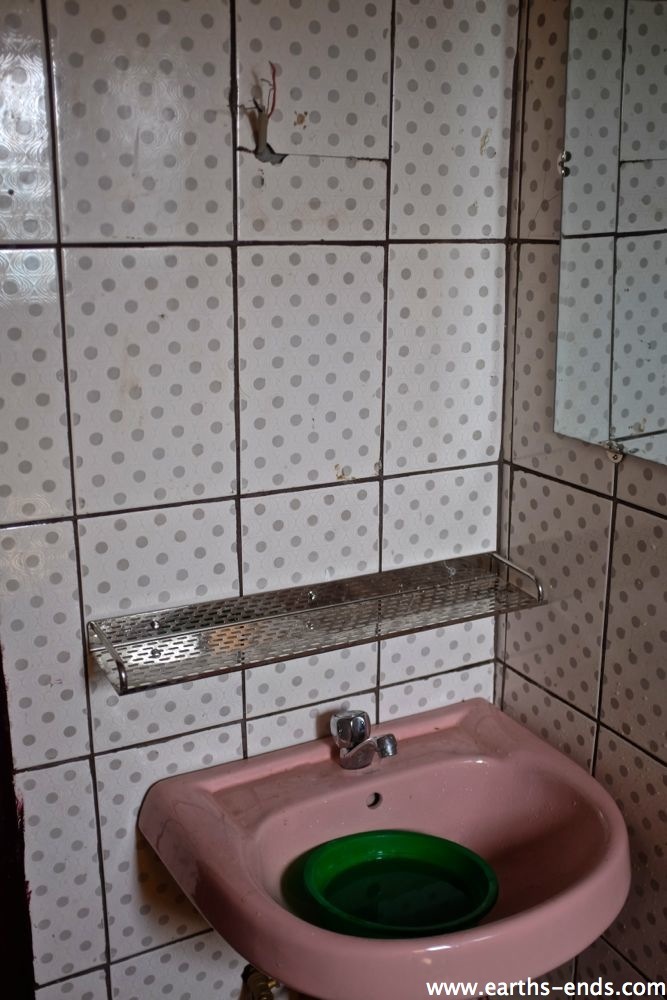 The live wire in question.
The live wire in question.
We rose the next morning with the mission in mind. First up, Mick attempted to reseal his stator cover. His bike had been leaking oil for a while, and he thought it might be coming from the stator after having it off in Ouesso. When that was complete, we fueled up and hit the road. The new road we travelled was pristine hot-mix tar all the way to the border. One less horror route in Africa dealt with it seemed.
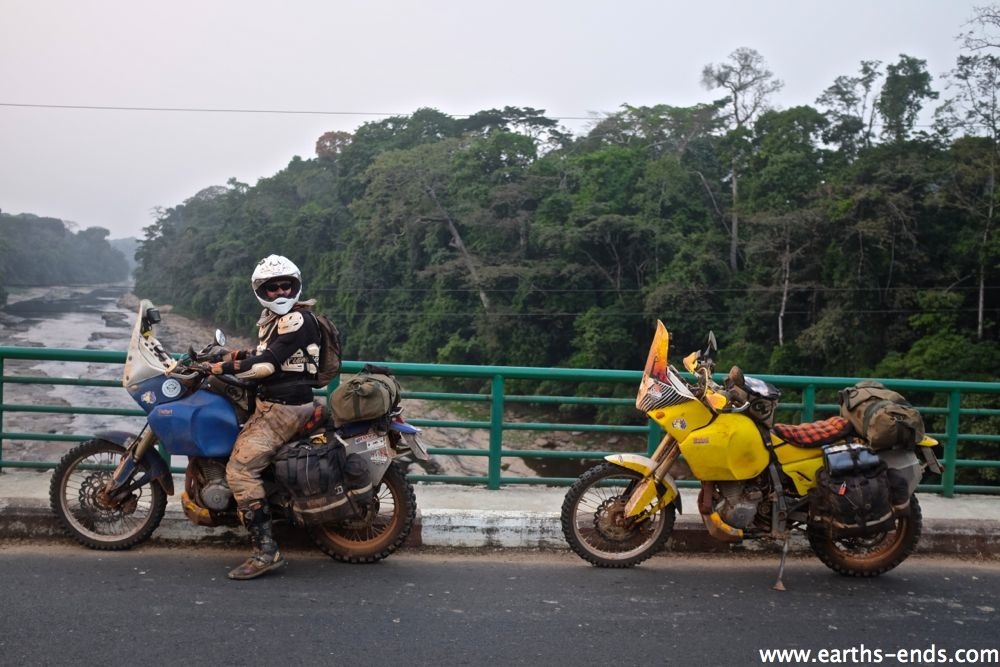
There were barely any cars or truck on the road.
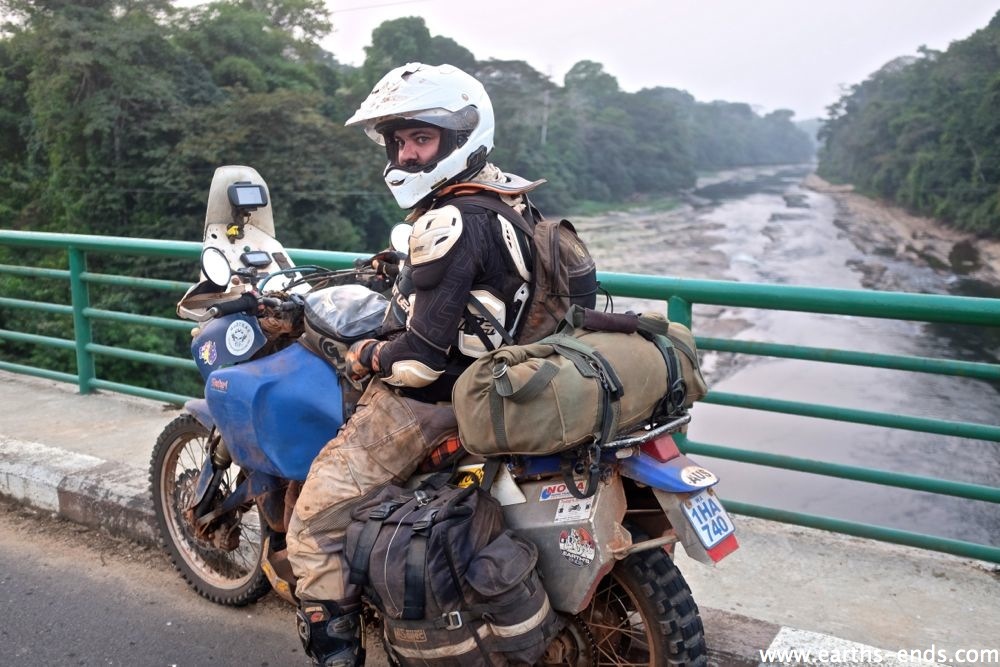
Taking in some views.
Right near the border, we saw an overlander biker coming the other way, and we stopped for a chat. It had been an age since we had come across another biker, so it was extremely exciting. The young fella was named Bevan, who hailed from California. He was riding an old TT600 bought and registered in Ireland. We had a good chat and swapped a few stories. He informed us he had a YouTube channel called “Moto Gains” as he tries to go to the gym in every country, which is pretty funny. It was far removed from our priorities on the road but cool nonetheless.
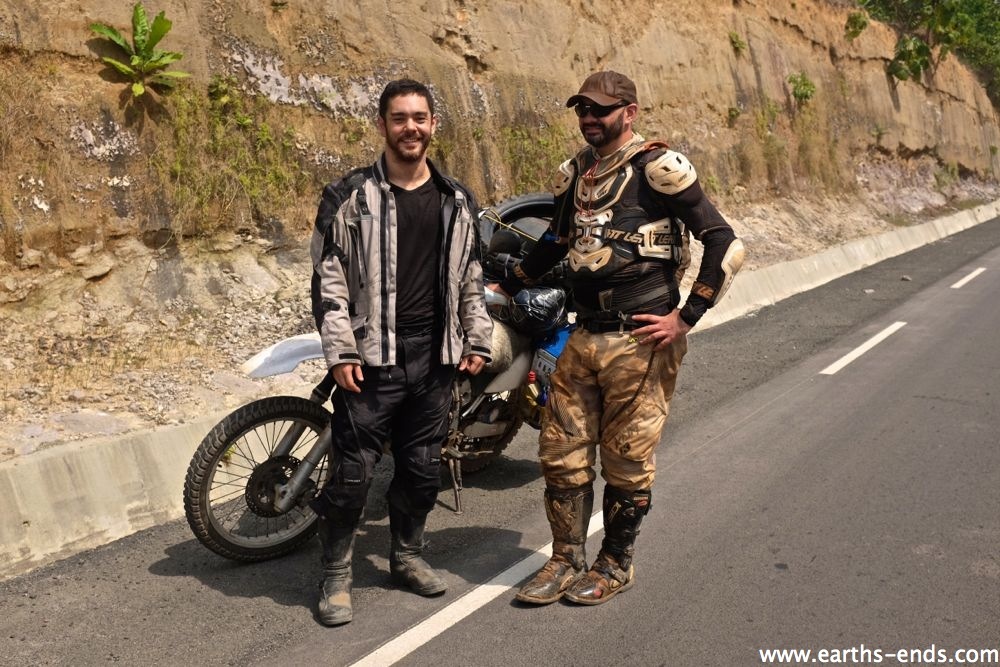
Biker Bevan – you can find a bunch of cool trip vlogs he made here: https://trshow.info/on/EaZVPM8iwtEagGfQQZNdsA.html
Overland bikers are so rare over this side of the continent, so we weren’t surprised to hear that Bevan knew all the bikers we knew. Most of whom we’ve only interacted with online. The Africa moto-traveller clique is a strong one. This is in large part due to the reliance you have on other travellers for the latest info on the road ahead. Things on the ground change so fast. A Lonely Planet guide is not going to cut it in these parts.
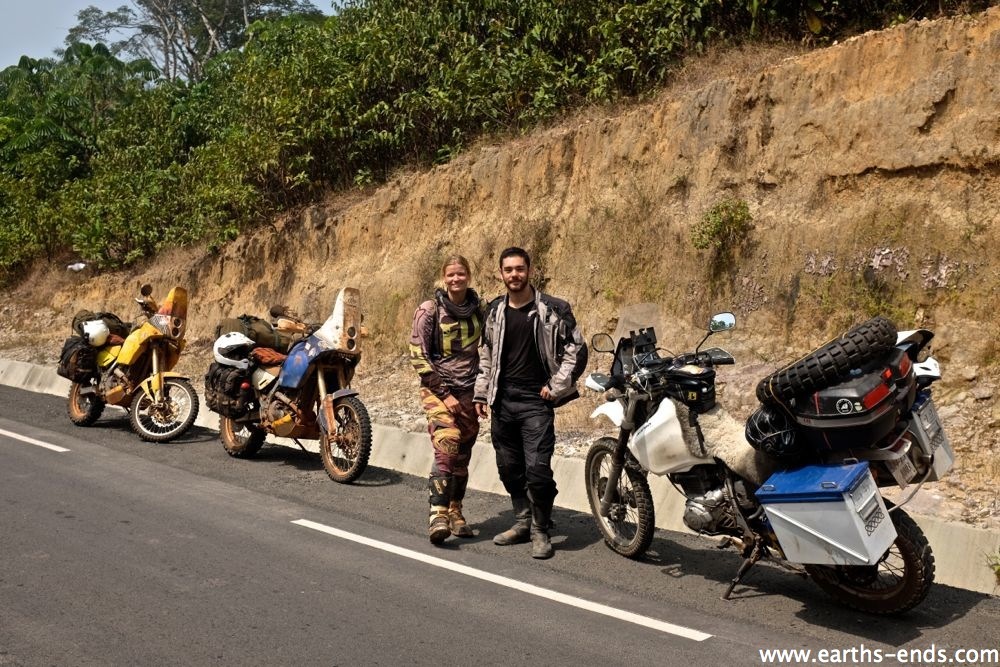
We had a border to cross but couldn’t pass up the opportunity for a chat with a fellow biker.
Not long after parting ways with Bevan, we reached the Cameroon/Nigeria border. Our first order of business was to get some food in our bellies. We had learned long ago that it wasn’t a good idea to do a border crossing hungry.
It was a smart move just executed poorly in this case. There were some impressive BBQs fashioned from 40-gallon drums brimming with sizzling meat. It looked delicious, but it was mostly bushmeat, so we gave it a wide berth. It was slim pickings on offer, but we found something. It feels obscene to complain about food in a place where many are lucky to get a single meal a day, but it was the most horrid meal of our life. It was the first time I have ever seen Michael unable to eat something. I was ravenous so pushed through to ward off the ‘hangries’ to aid a smooth border crossing.
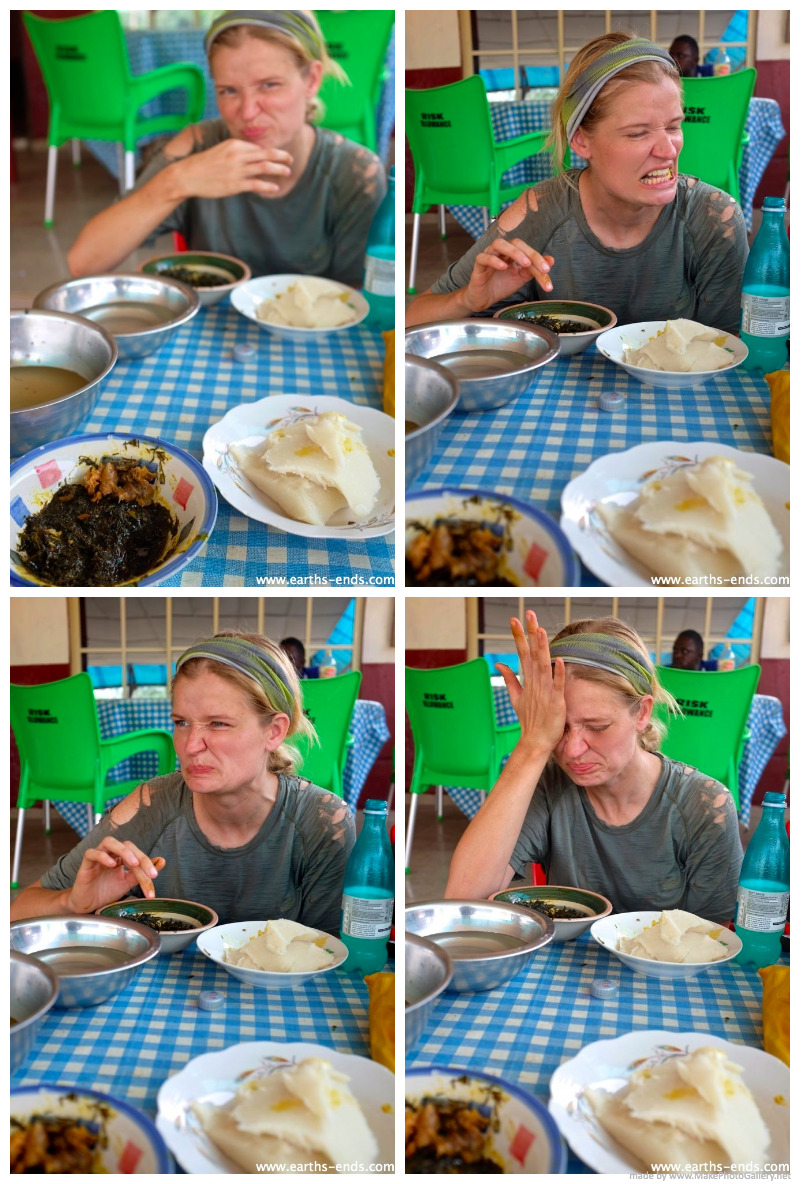
The meat, which seemed to be pork, was actually good. It was the rest that was a struggle. The main issue was the leaves. We’d we seen people cut very finely, then pound before boiling the life of. I think it is what they call it eru in Cameroon and okazi in Nigeria. It was incredibly bitter and tasted like sucking on coins. Perhaps, like the Vegemite us Aussies love, its an acquired taste.
The Cameroonian side of the crossing things took ages. Immigration and customs were fine, but there were a bunch of other hoops to jump that seemed pointless. But no big deal.
While this was going on, we had ample time to take in our surrounds. The most eye-catching sight was the gruesome posters adorning the office walls showing Boko Haram’s terrorism handy work in the area. The macabre posters showed the brutal aftermath of terrorist attacks complete with the remains of the terrorists who carried them out. Our lunch wasn’t sitting well before this and certainly wasn’t afterwards.
The officers on the Nigerian side of the border were officious and inoffensively indifferent to us, which is everything you want when entering a country with your own vehicle. They wore crisp white and green uniforms with some chic looking berets to finish off the look. Happily, the whole entry process was swift as we were sweating in the tiny office where two small desk fans had far too much asked of them. Our passports and carnets were soon stamped, and we were officially in Nigeria. It was now time to compare Nigeria’s daunting reputation with our personal experience. Gulp!
I Believe an Update is in Order
Well, well, well…look who finally showed up to this dust-covered, moth-balled blog of ol’. That’s right, after an insanely long hiatus, we are back!
This extensive break from blogging was never supposed to last so long. In fact, finishing writing up at least the Africa part of our trip had been my New Year’s resolution for the past 2 years. But in the grand tradition of New Year’s resolutions, its come to nothing.
But alas, I am giving in another crack before the ravages of time further erode our memory of events. This blog, after all, is our attempt to record the memories of our grand adventure so it will serve as our memento of the trip and that time in our lives where we threw caution to the wind, worked and saved then lived out a dream of motorbiking the world.
For those of you who’ve stuck around, we issue a hearty, fond hello!
Perhaps a recap of what’s gone on since returning to Oz is in order before jumping back to our African travels.
After riding across Australia, we returned to our home base of Perth, Western Australia.
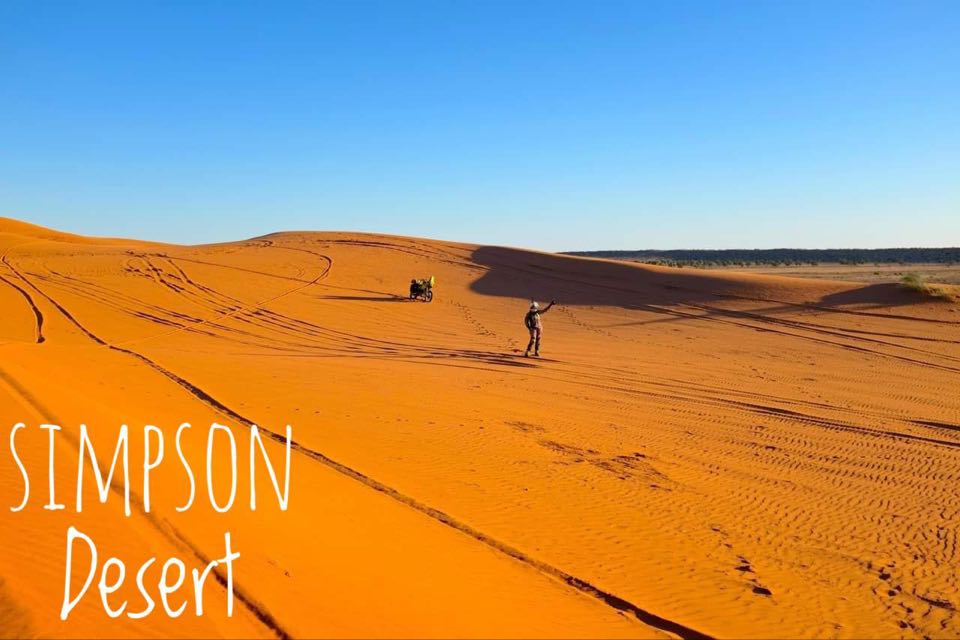


The timing of the end of our trip was near to ideal. It was the start of a big recovery in the resources sector that had started its downward slide at the time we left on our trip. Within a couple of weeks, I was working as a geologist in an underground nickel mine. Mick soon found himself running a gold mine in the Murchison region of Western Australia.
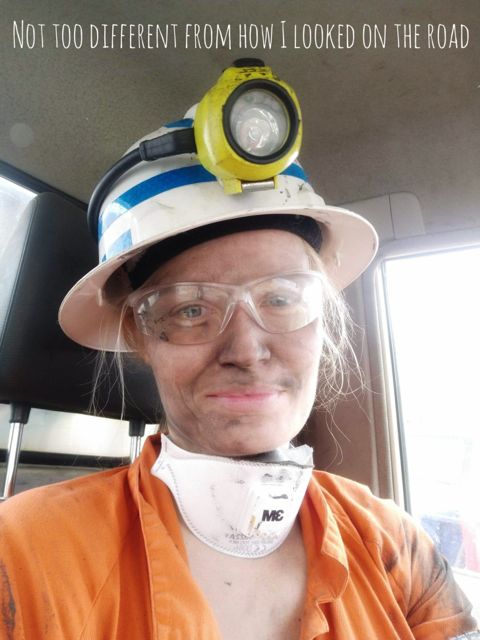
Our return coincided with a significant lull in the housing market in Perth. We stumbled into a house purchase. We weren’t really looking and bought the first thing we looked at and got a great deal on it.

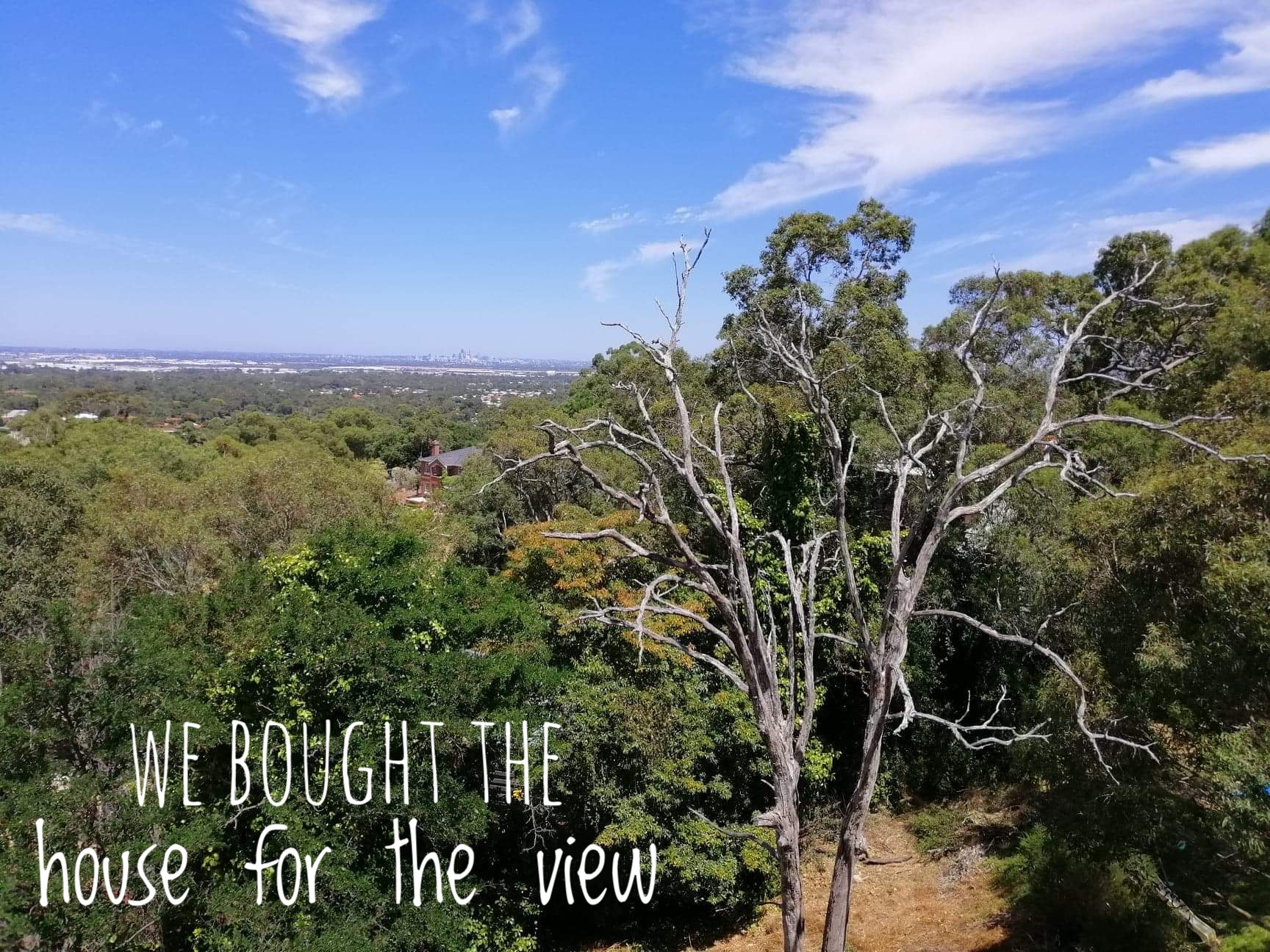

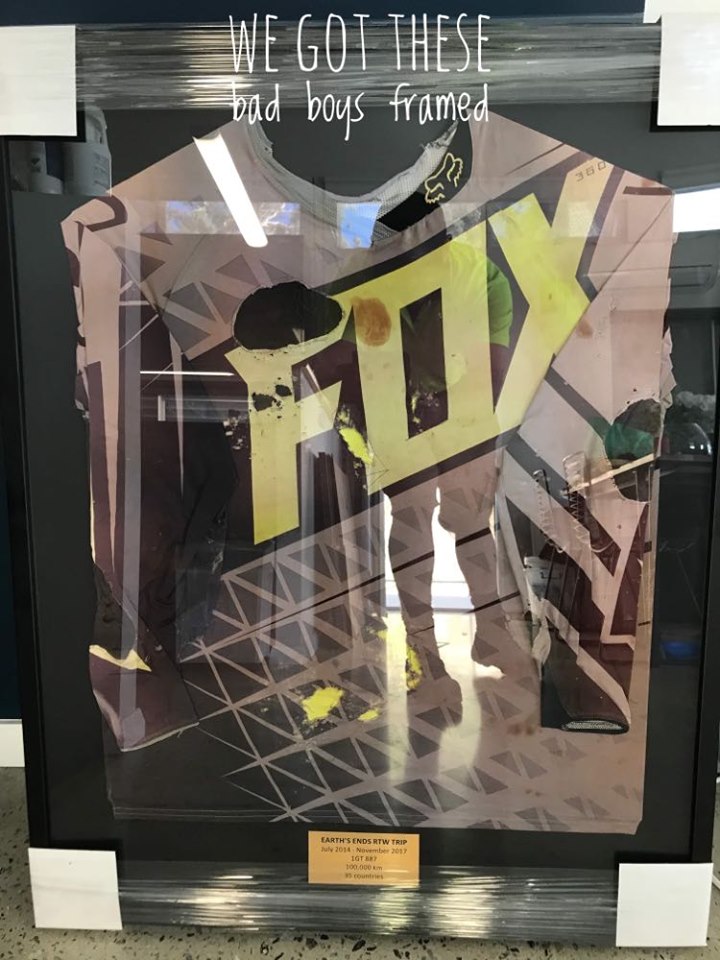
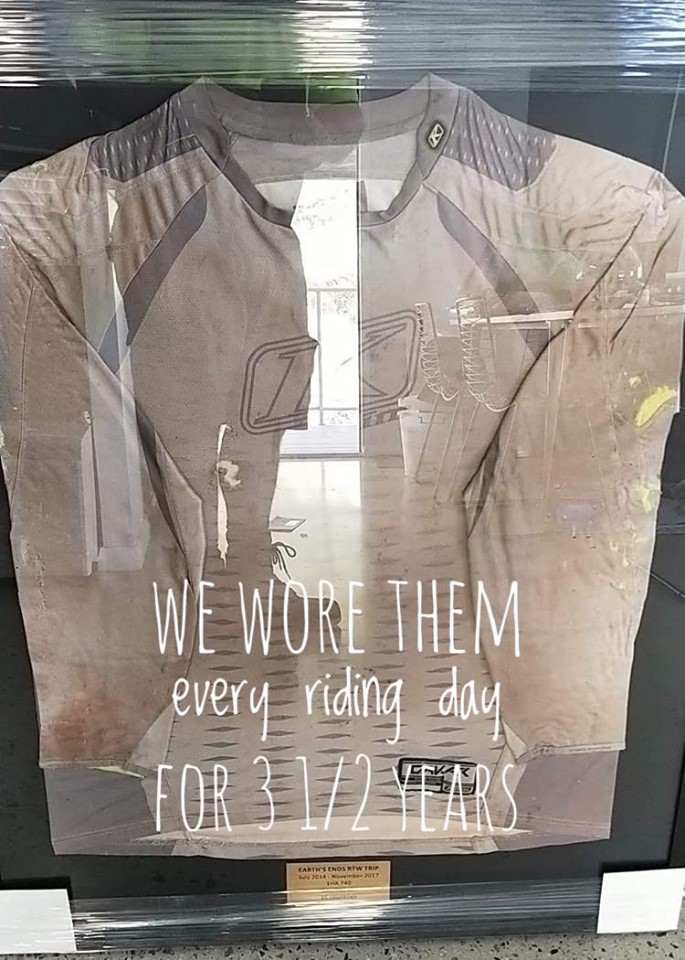
I graduated from university for the degree I had been finishing on the road.

I conned Mick into a cool graduation present. He was given the following brief; second-hand, no more than AUD10K, Italian – but different from all my previous Italians. He nailed it!

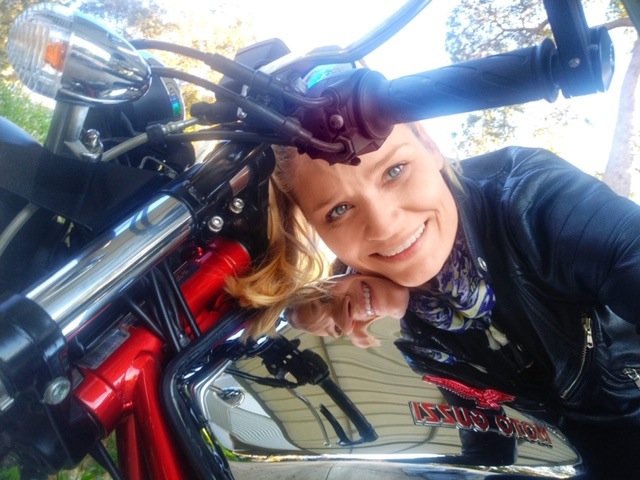


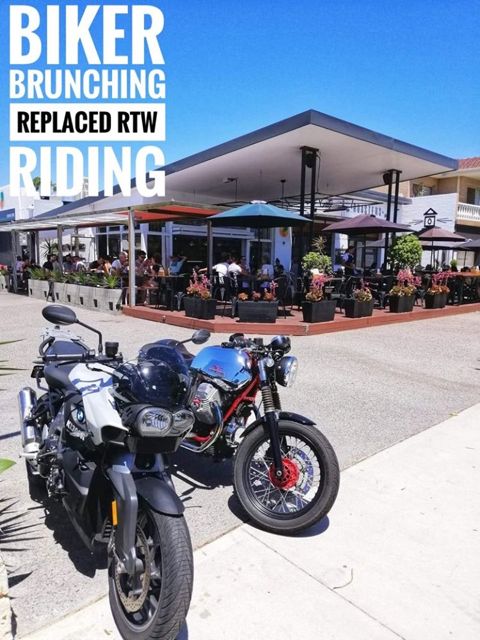
Mick then got enticed by a previous boss to jump mining companies to take the underground manager position of a large mine in Kalgoorlie called Kanowna Belle. High tonnage, low grade, geologically complex, remnant mining, seismic – its a monster. There is some cool animation of the mine here to anyone who likes that kind of thing.
https://inventum3d.com/c/nsrltd/kanowna
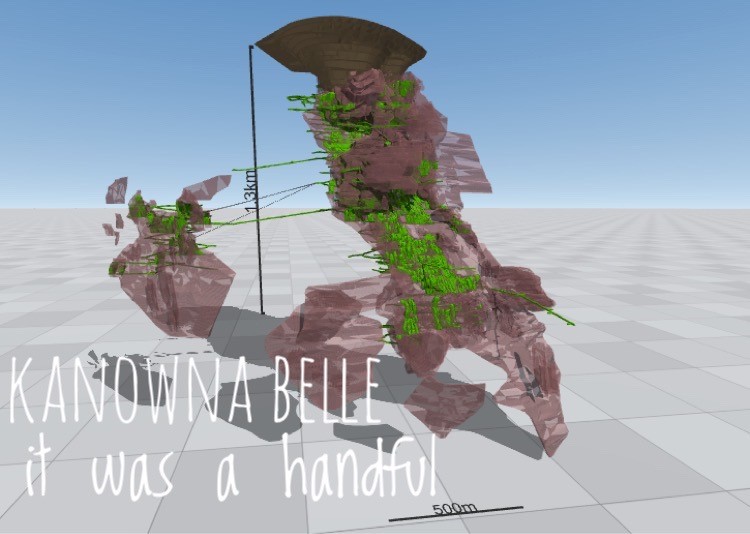
I joined the same company and worked at another one of their gold mines.

We had our 10th anniversary and celebrated with his and hers Husabergs. Now we were back working for ‘The Man’, adventure biking was out, and enduro biking was in. I got the 2012 FE390 while Mick got 2010 FE 540. True Husabergs with 70° engines.
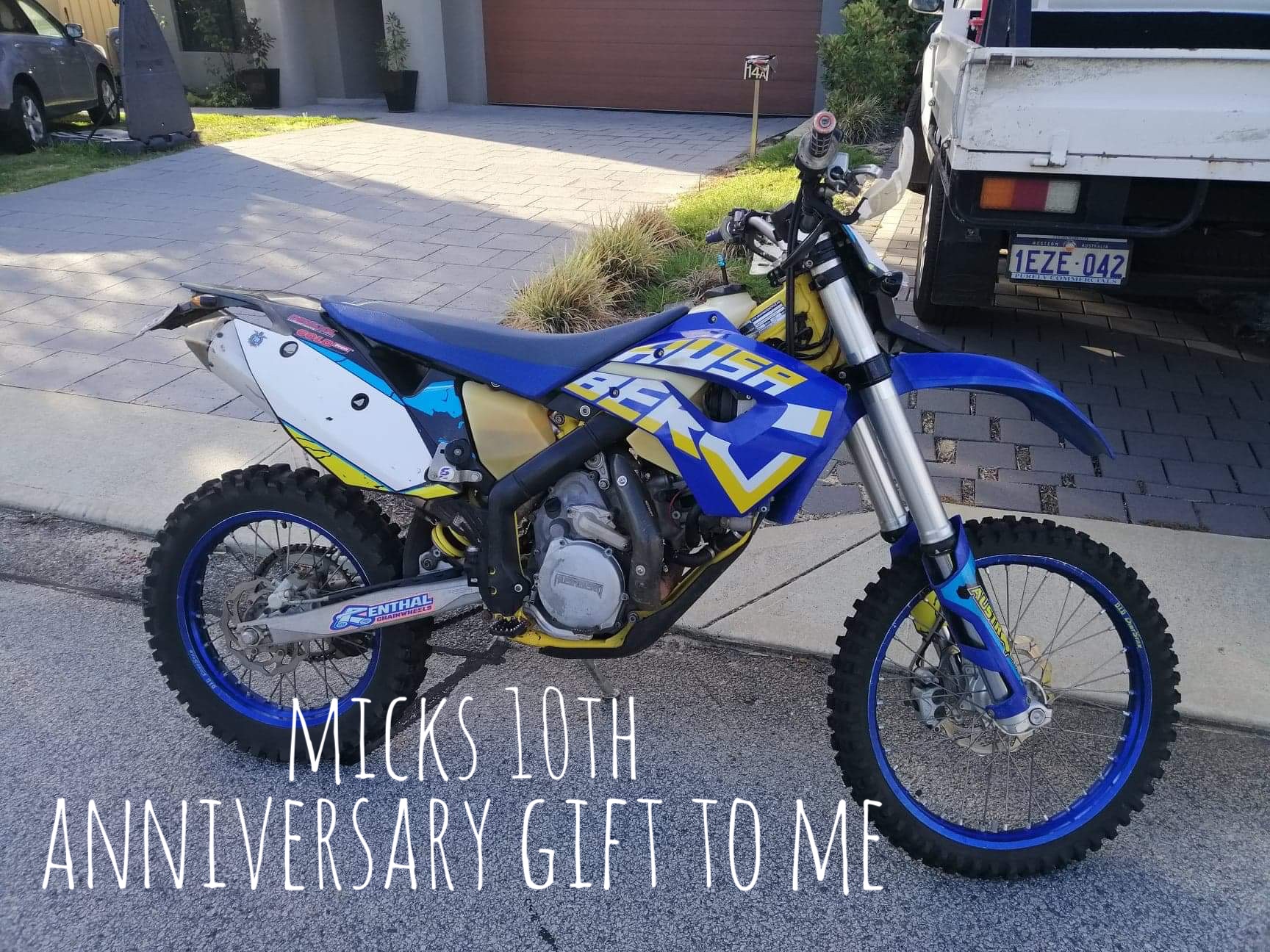

Mick started to build a massive 2 story, 3-bay garage on our steep block with his dad. They did nearly the whole thing themselves. And it would have been bigger were it not for the ‘oppressive’ condition I placed on it by not allowing it to be larger than the house.
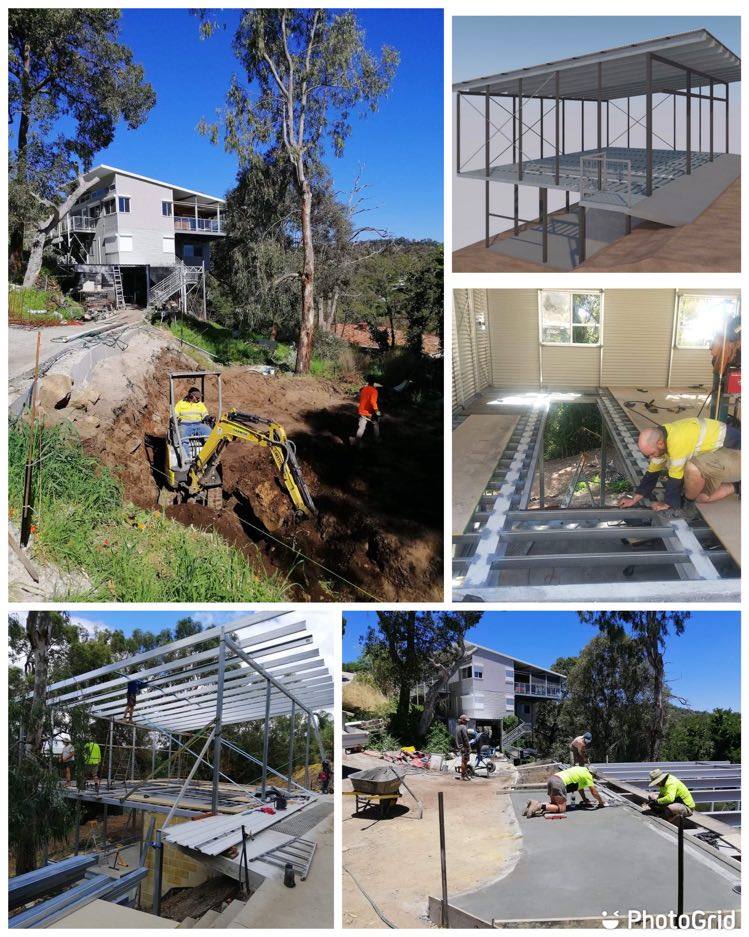
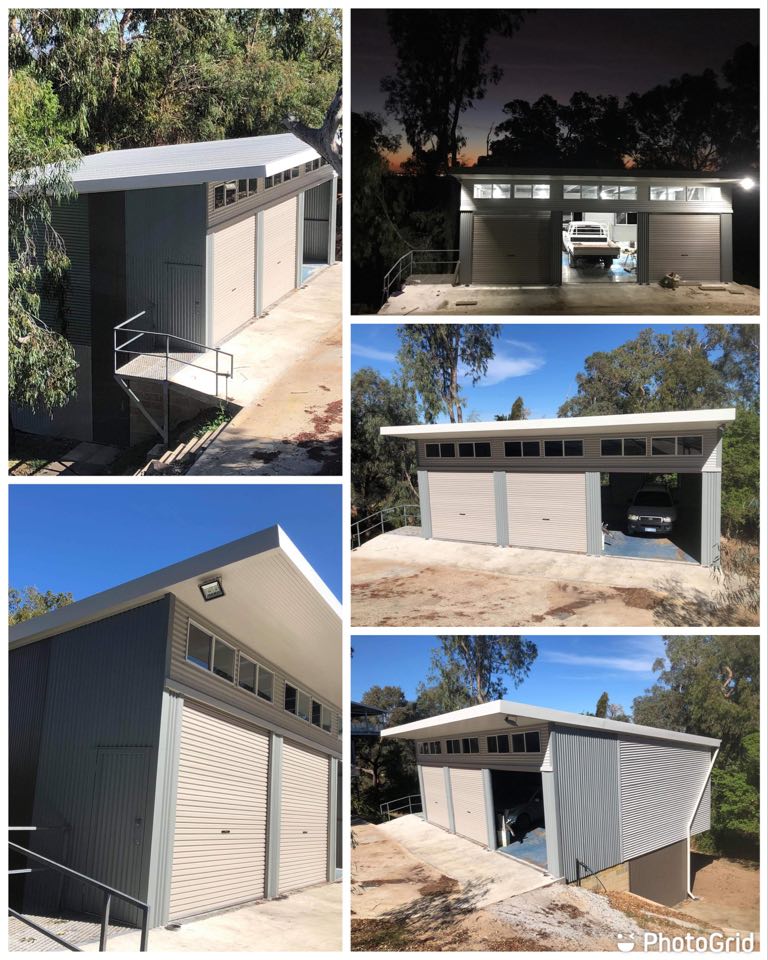
Then, way out of left field, Mick was requested/told to relocate to Fairbanks, Alaska to be the mining manager at Pogo, a big gold mine that our company had purchased about a year previous. They needed us to move asap. So we did.
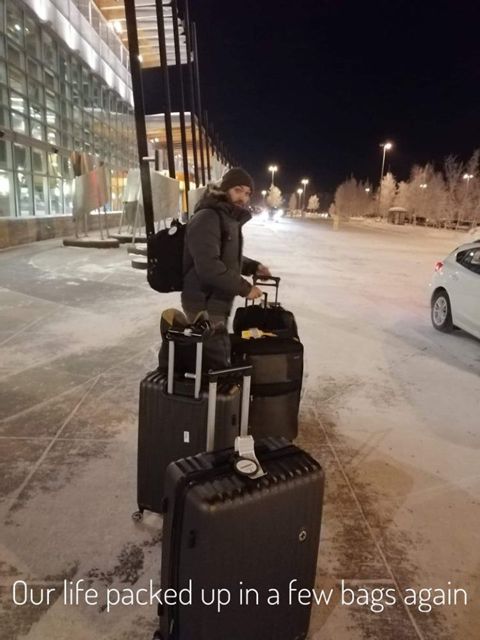
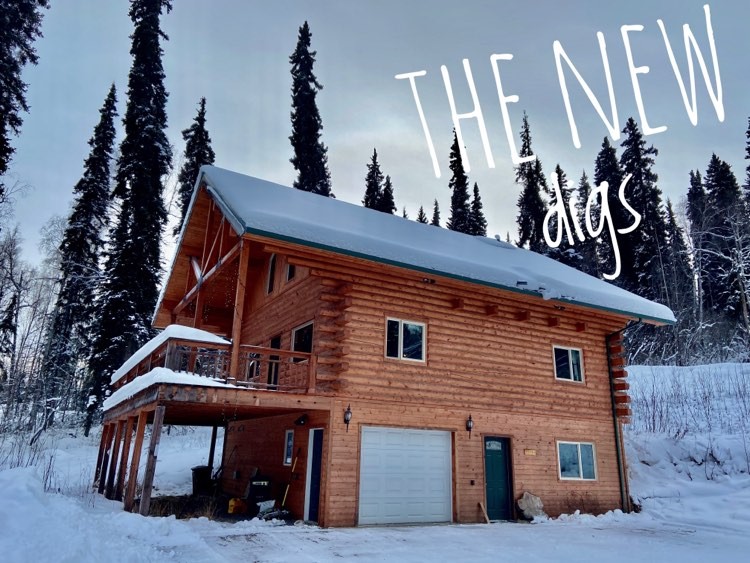
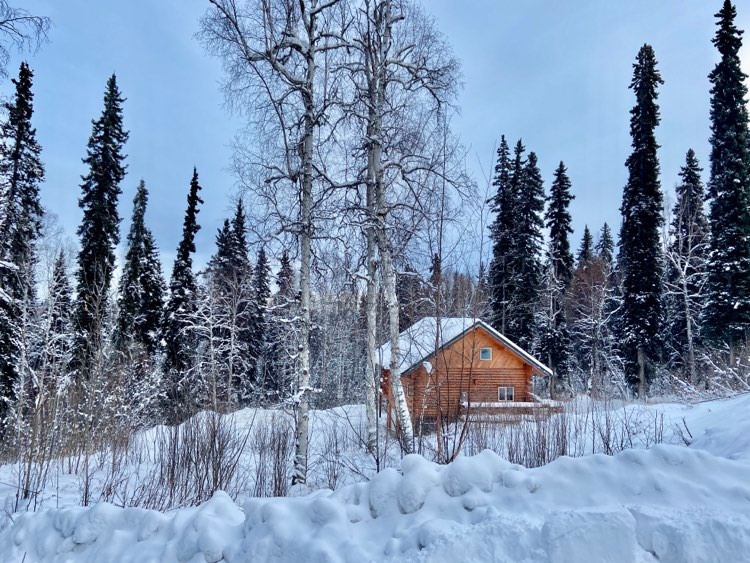
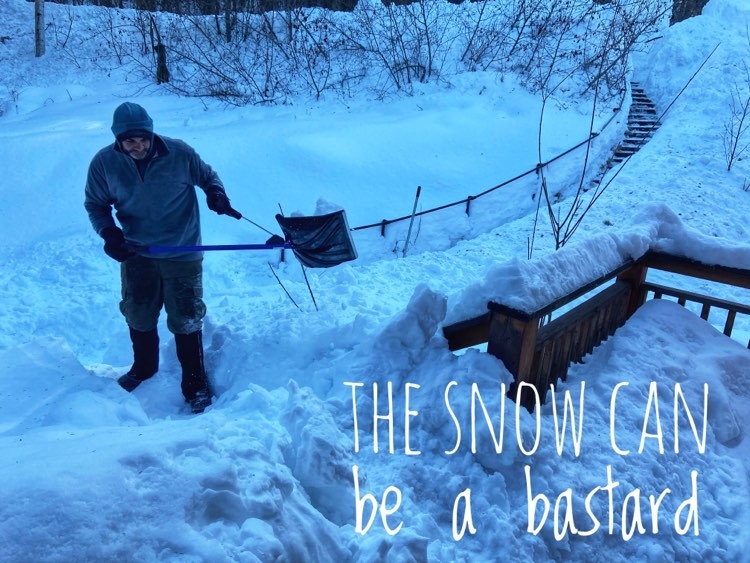
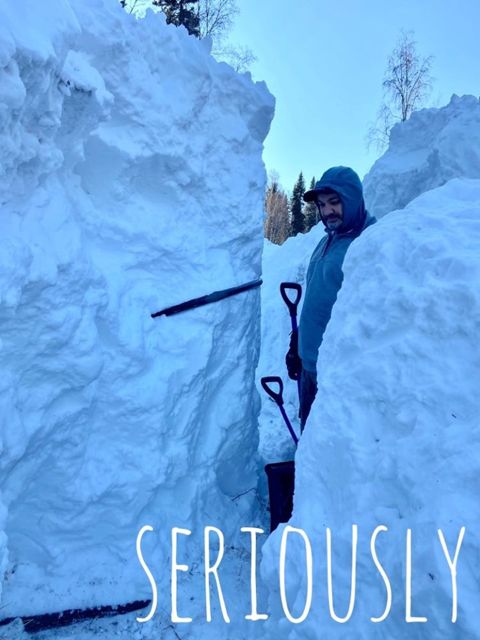
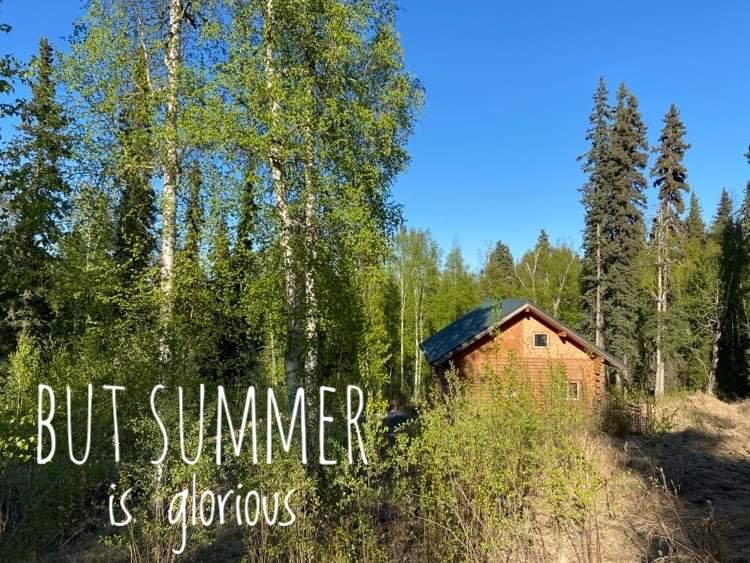
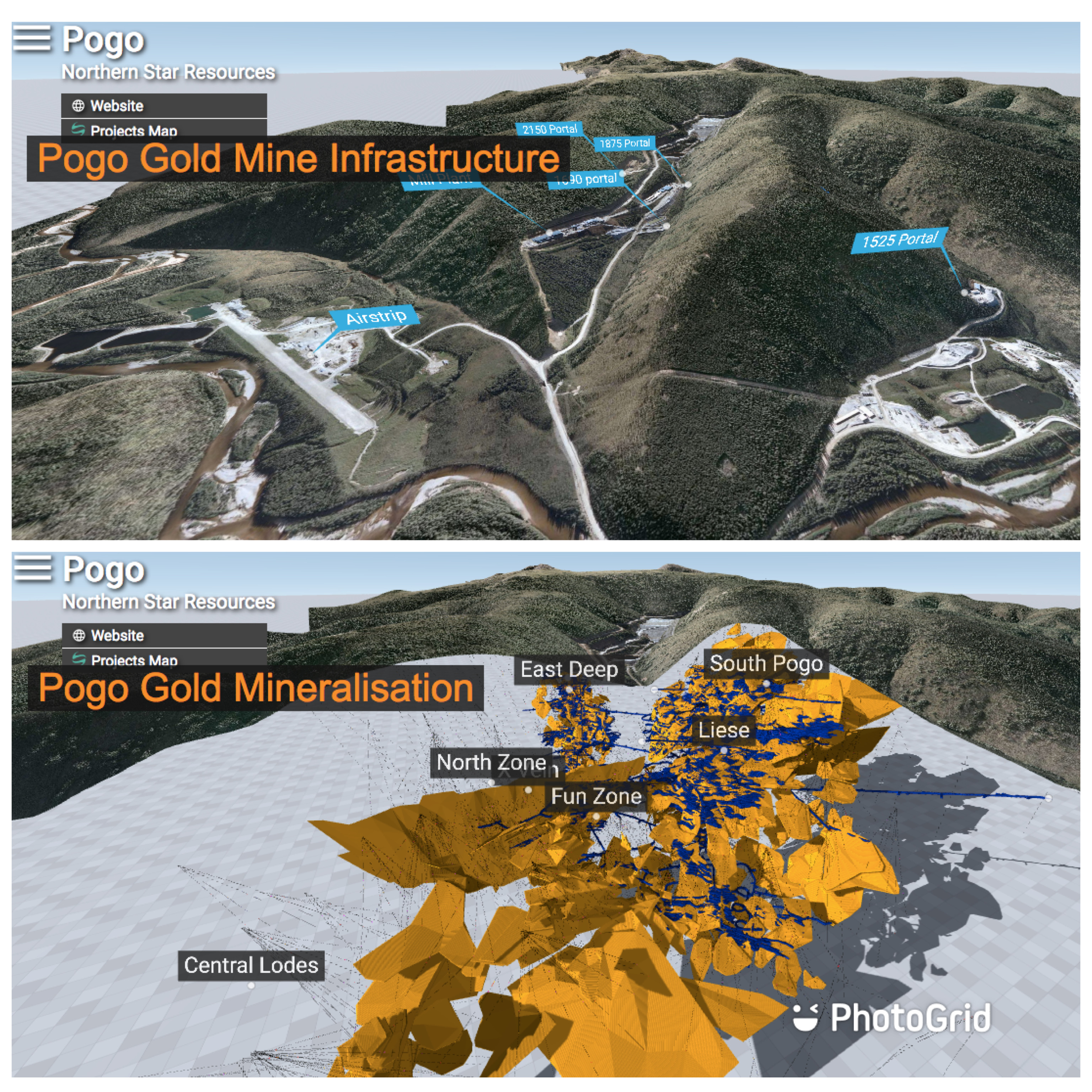
Anyone interested in big underground mines will enjoy this cool animation https://inventum3d.com/c/nsrltd/pogo
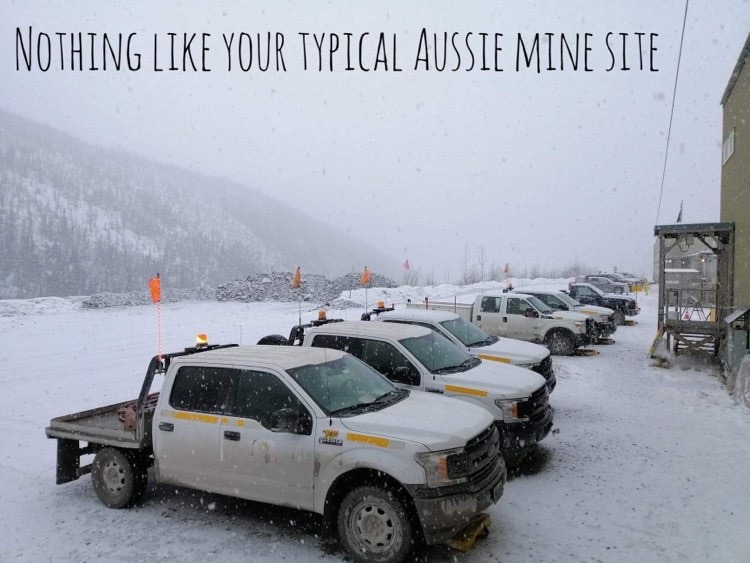
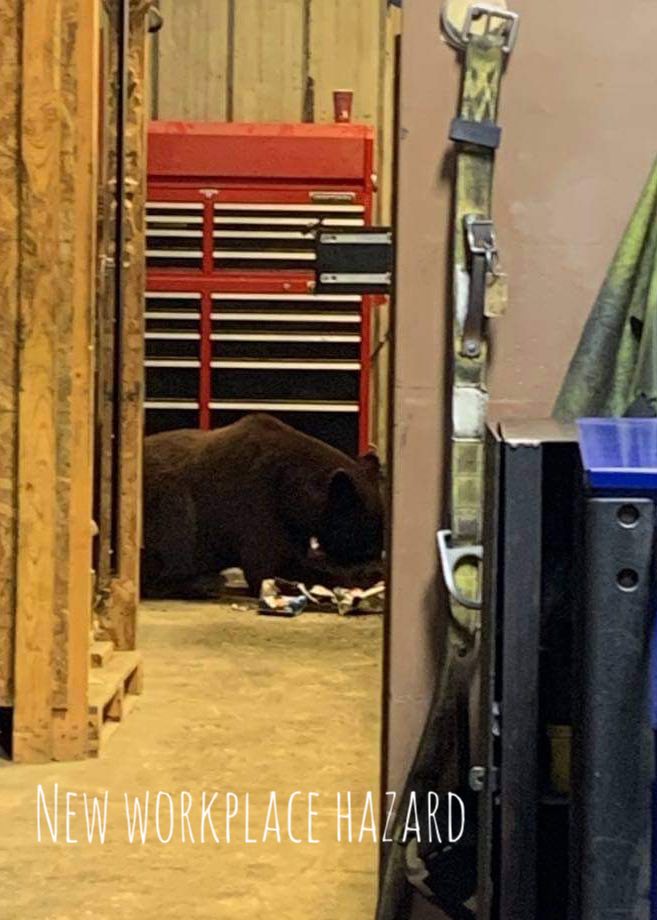
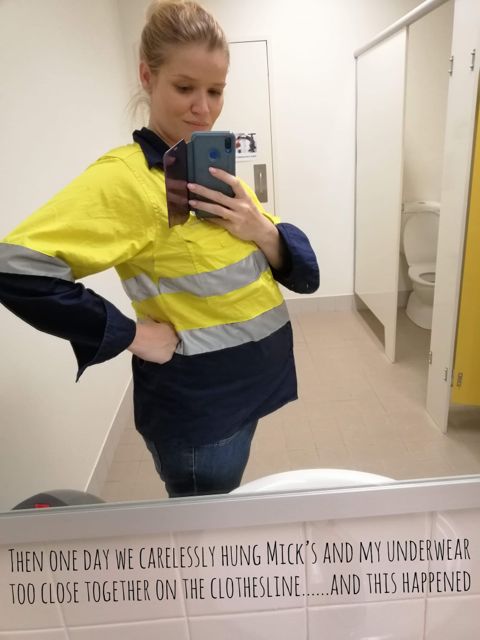
So there we were smack bang in the Alaskan interior, transitioning from Australian summer (43C/110F) to Alaskan winter (-37C/-35F). Starting new jobs, finding a rental and filling a house, getting a car and finding someone to deliver the baby that was just 2 months off arriving into the world. It all got organised in time (got the truck just a few days before going to hospital.) And we now have a rad little dude to call our own.
Meet Maxwell. Max is a most excellent little man. Perhaps recognising we had no idea what we were doing, he’s taken care of much of the parenting heavy-lifting. He is very chill, sleeps like a teenager, feeds like a champ and is a happy, not so little legend. He’s got mum’s eyes, dad’s frown, and is rocking the 95th percentile for everything. We are naturally counting down the days till he gets his first motorbike.
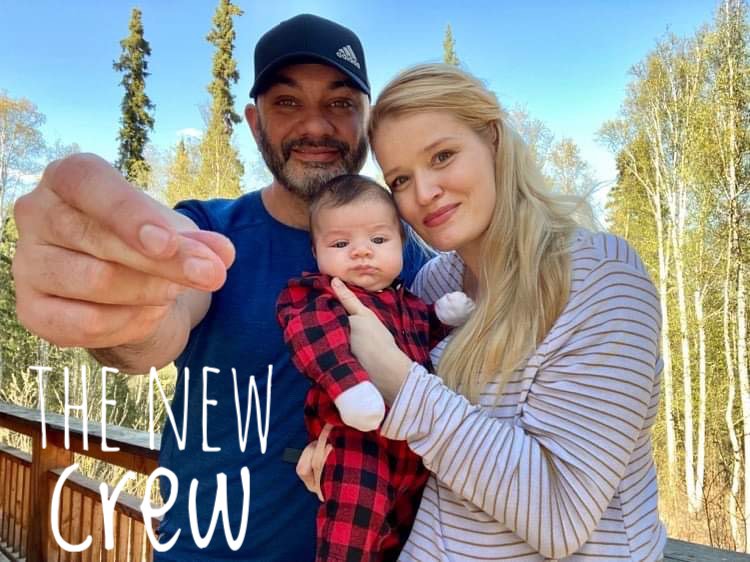

So there you go. That’s what’s been going on. We are now set up in Alaska, slowly accumulating all the toys again for making the most of one’s time in the 49th state. We’ve signed on to stay for a couple of years but already feel we might stay a lot longer than that. And when it comes time to return to Oz, we are planning to do it by land. Siberia, Mongolia and Central Asia still beckon us. Mick’s already mentally designing an Oka Camper for the job. Will be sure to have a mount for a dirt bike on the back.
Now to the blog update.
In the interest of actually getting this thing documented for posterity, it is going to be a bit of a half-arsed job compared to what we did in the past. Previously we dove deep into random insights of history, politics, culture and trivia we acquired along the way. We wanted to capture all we saw, experienced and learned. That took time, and we are a little short on that these days. Now, where were we? Ah yes….. Cameroon…..

Blog 74 by Tan: Adventures With Opera Jack – Part 3
After spending the day in the village, we decided to go ahead and stay another night in order to hear some of this singing we had heard so much about. We also wanted a little more time to see Jack nicely settled. It was a brave thing for him to be doing and we had just met we wanted to make sure he would be well looked after all the way out in the forest.

Morning breaks. Funny how closely our tent resembled the traditional dwellings.
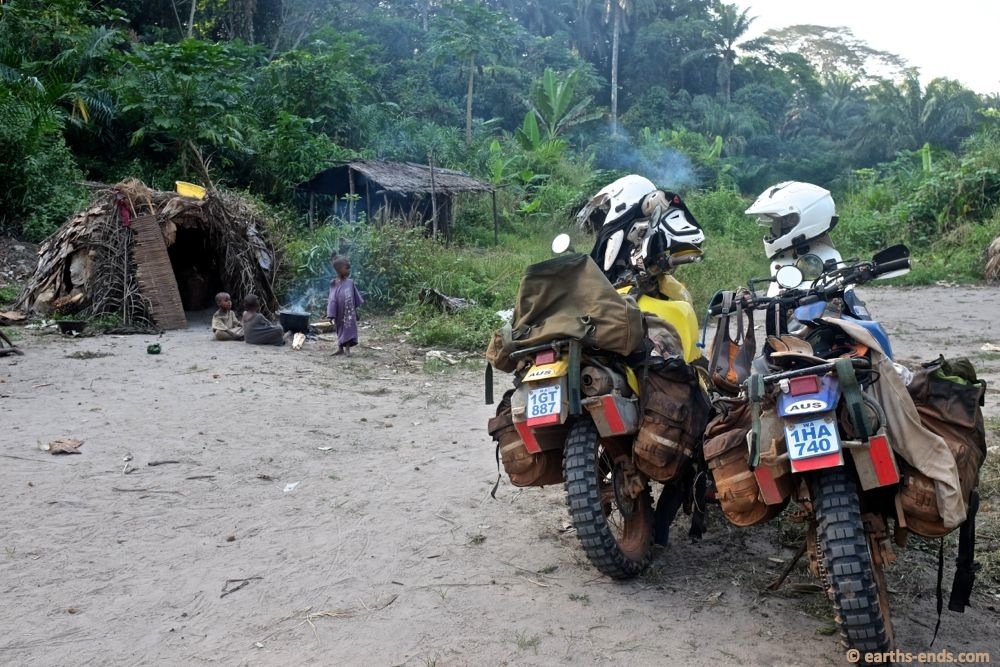
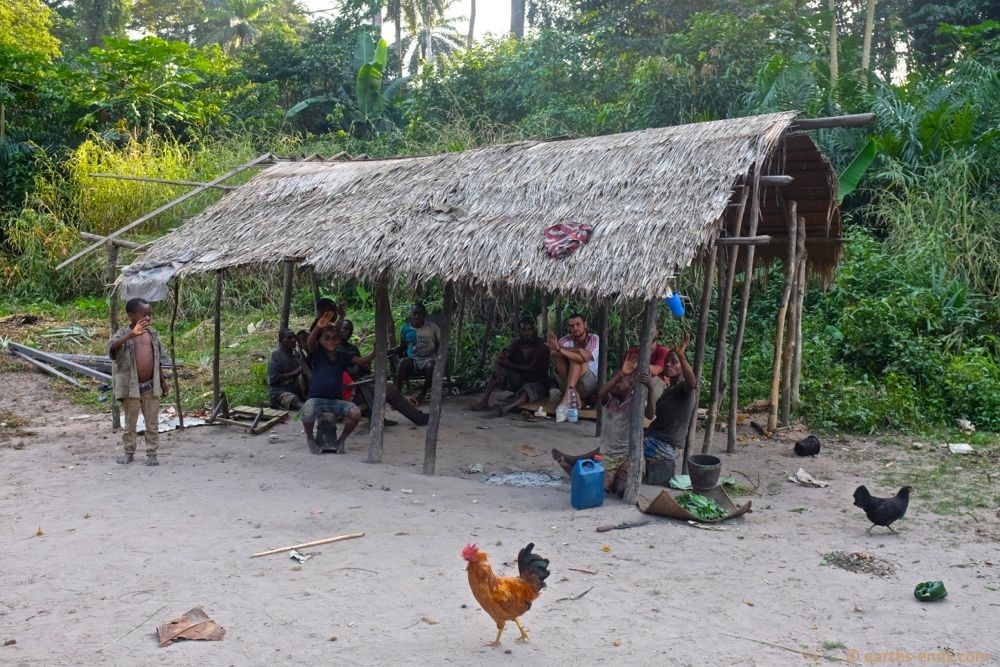
Morning chill session.
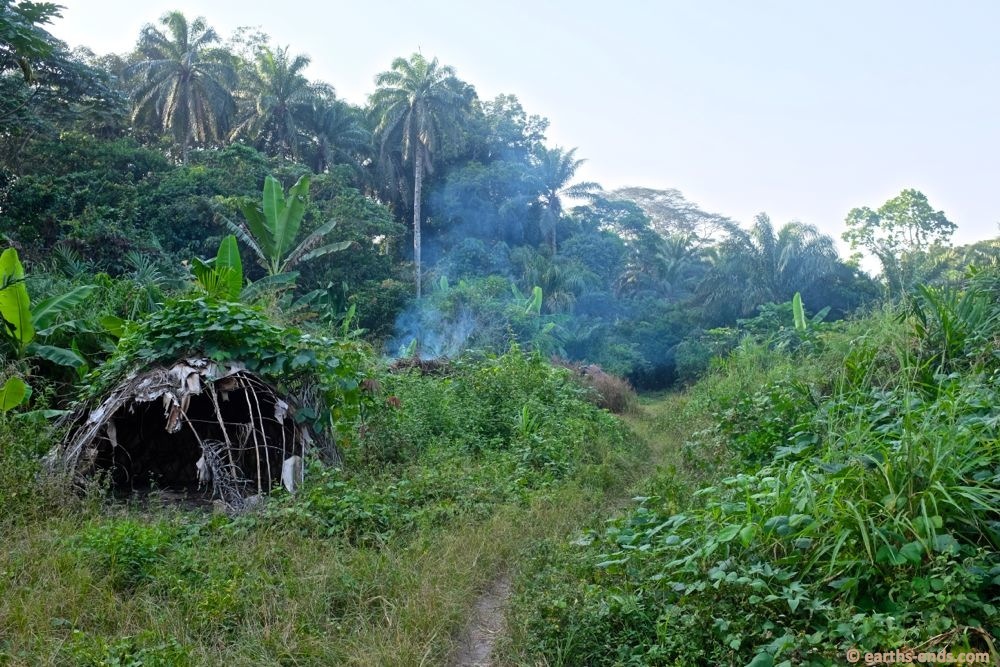
Our trail back to the logging roads.
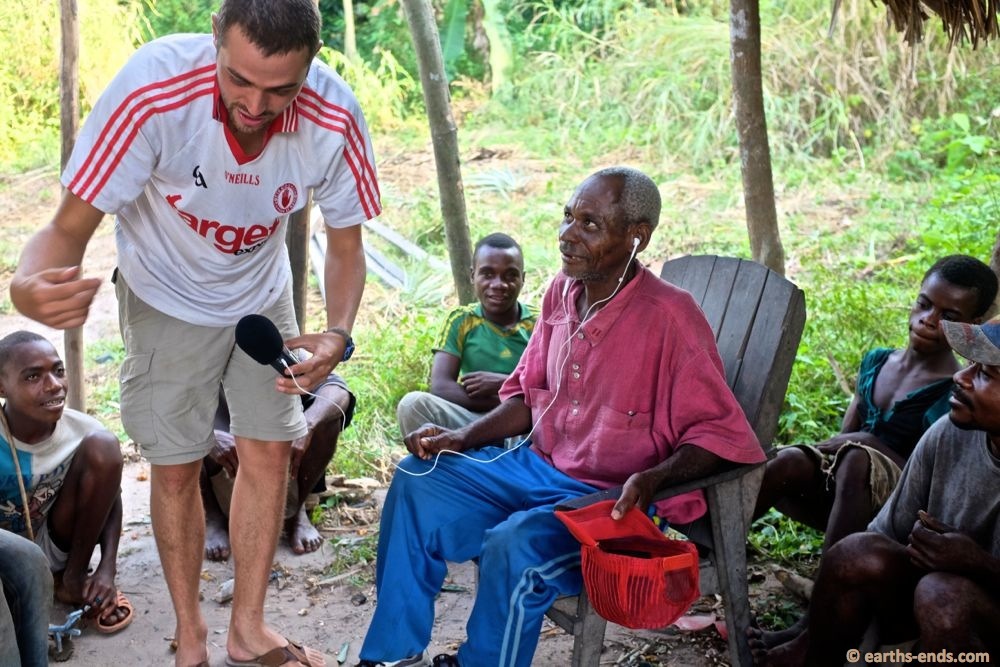
Jack informed us the BaAka enjoyed few things more than singing…. listening to themselves singing is one of those things. Jack also told us that Louis Sarno had told him the forest people he lives with also enjoy watching his DVDs. The standout favourite film in his village is The Terminator.
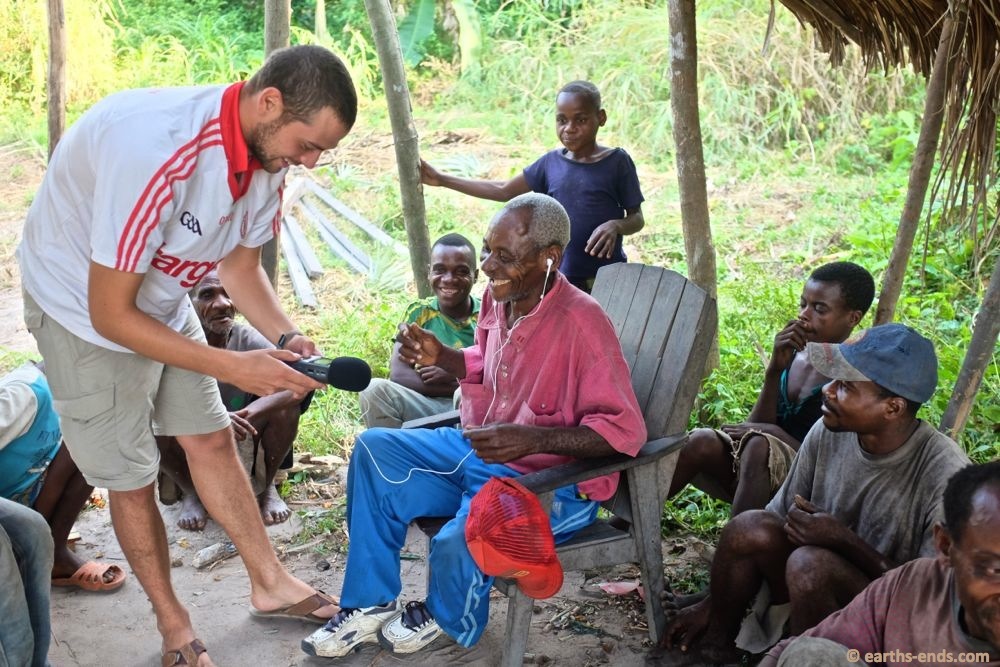
Jack playing songs of Aka from Central African Republic.
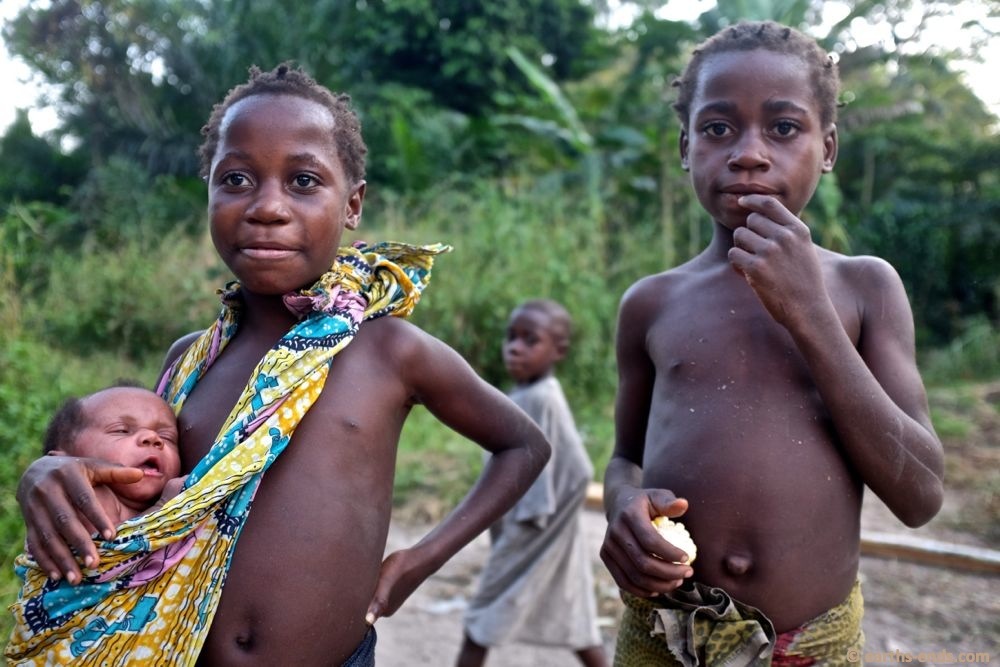
Child rearing is a communal affair and as is common throughout Africa, kids play a central role.
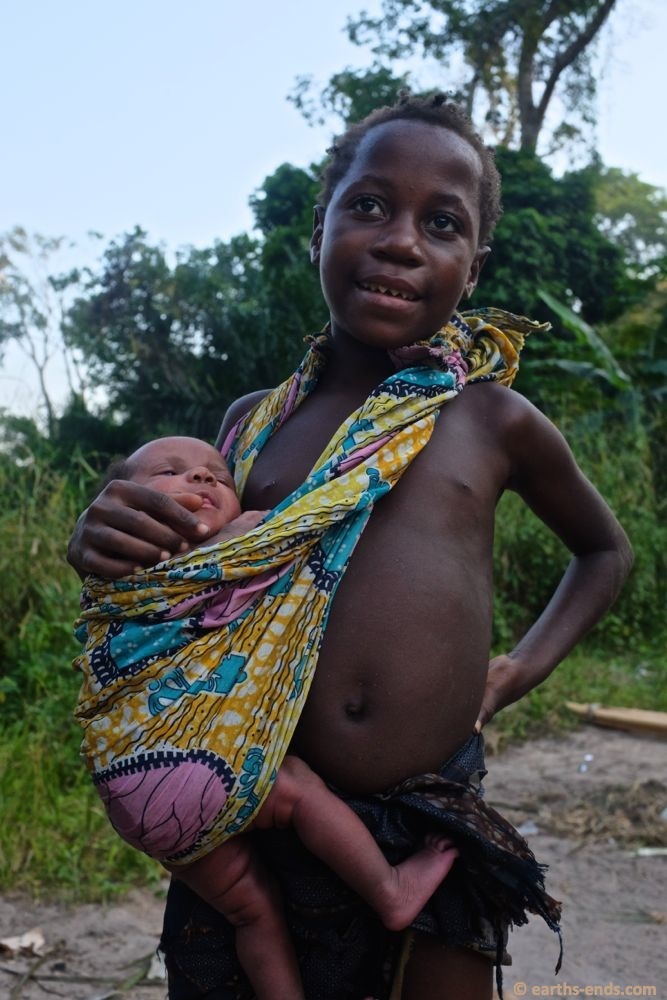
Here you can see this young girl has had her teeth filed.
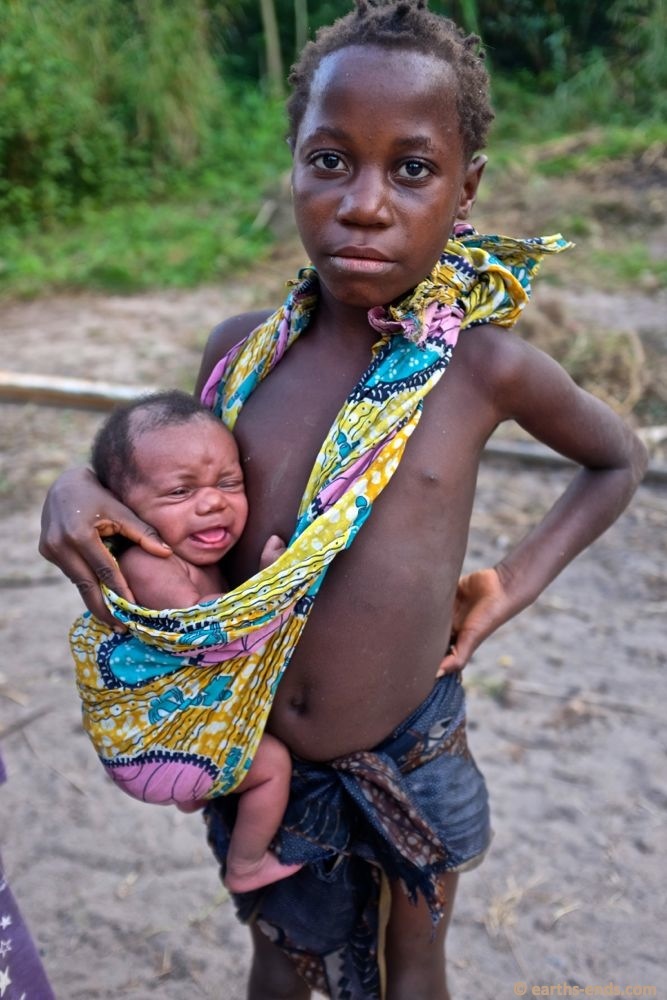
Most places in African babies are strapped to the mothers back with a fabric like this one. However the BaAka method is to strap babies to their sides – this gives the baby more face-to-face interaction with the caregiver.
We spent the afternoon just chilling and dozing in the shade in anticipation of the night’s singing festivities. The men of the village were particularly excited as they were keen to ‘get on the turps’ as we would say back home. Jugs of local spirit were purchased and shared around, but not nearly as freely as everything else we had seen shared. And it was the men who were hogging the booze and the women had to argue before getting some for themselves.
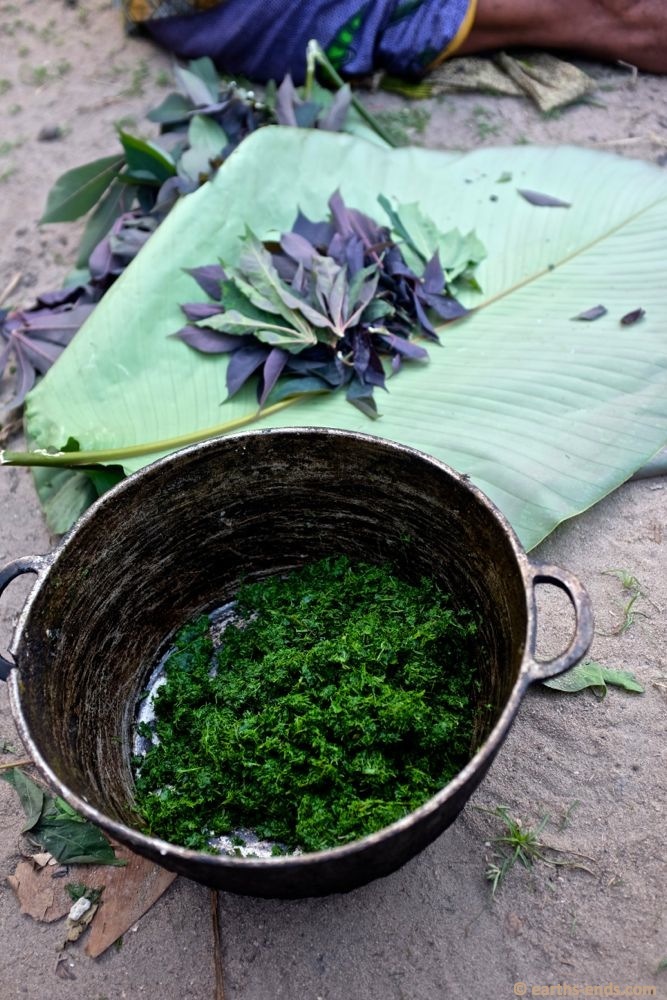
We never did figure out precisely what this was, but we had seen it eaten in many places in Central Africa. The leaves are piled together then sliced very finely. They are then boiled for a long time. The taste is something we just couldn’t get used to. It tastes extremely bitter. To me it tasted like sucking on coins.
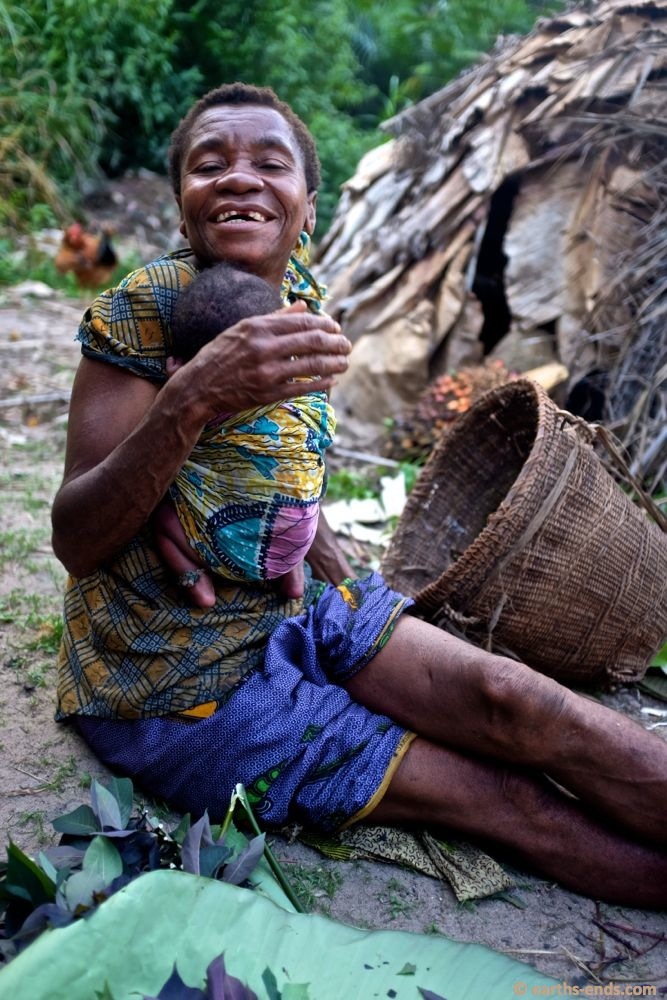
One of this little baby’s minders. BaAka are extremely indulgent to children in infancy. Babies are held almost constantly by multiple care-givers and babies are attended to immediately if they fuss or cry. Despite this woman not being his mother or (even a current mother to another infant) she had the baby suckling at her breast. The baby didn’t get anywhere with it but it was a matter of comfort. I later discovered that anthropologists have observed in the Aka, the extremely rare practice of “male breastfeeding” where male caregivers have been recorded offering their nipples to babies needing comfort when no female caregivers were around. The BaAka have been dubbed “the world’s best fathers” as BaAka fathers are within reach of their infants 47% of the time, apparently more than fathers in any other cultural group on the planet. That is what I read on the internet anyway.
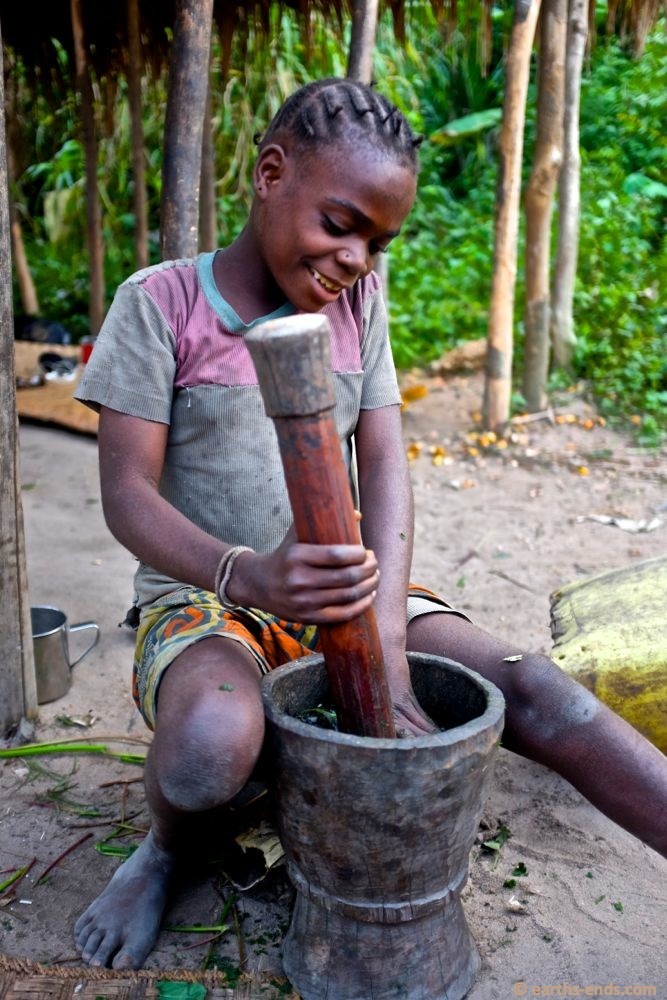
A young girl helping with meal preparation. Apparently, by 3 or 4 years of age children can cook themselves a meal on the fire, and by the age of 10 BaAka children have sufficient subsistence skills to survive in the forest alone if need be.
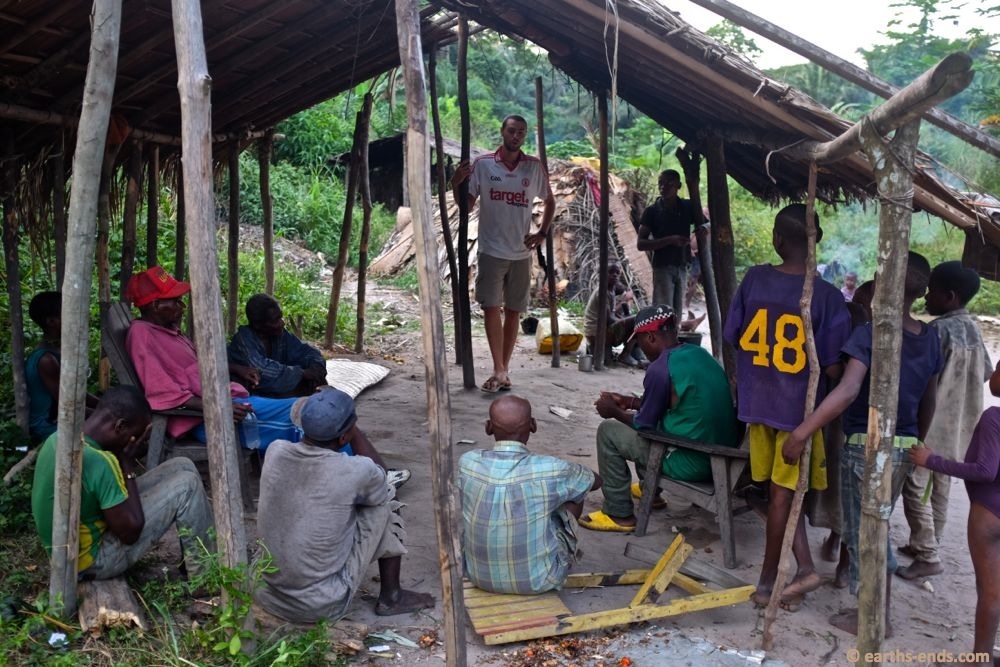
I cannot stress enough how important music is to the everyday life of the BaAka. This made it extra special getting the opportunity to witness their reactions to Jack singing German and French opera. Note the young fella on the left covering his eyes to better hear the music.
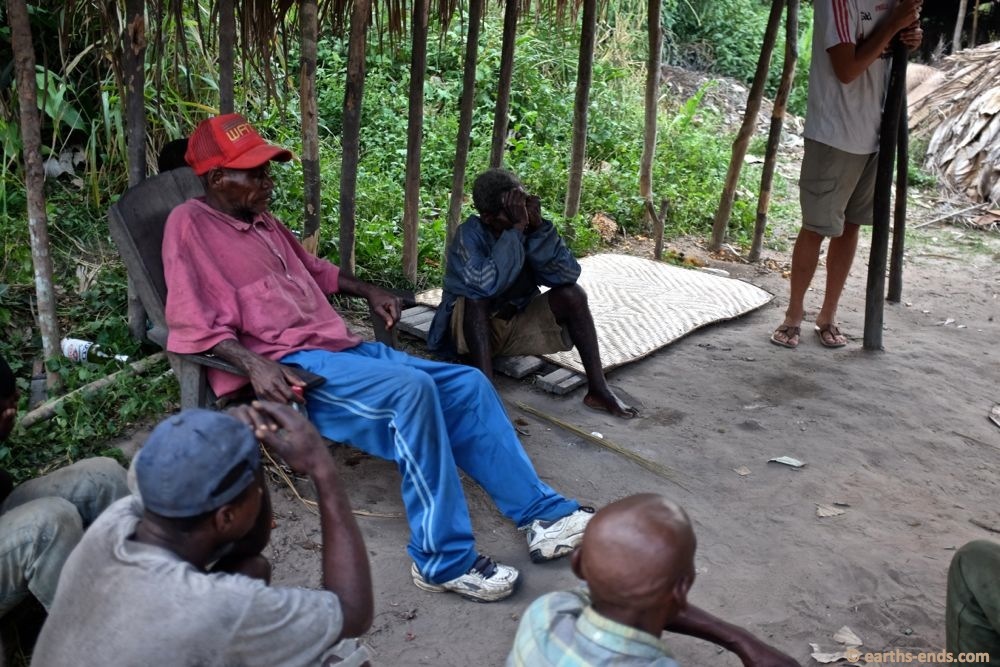
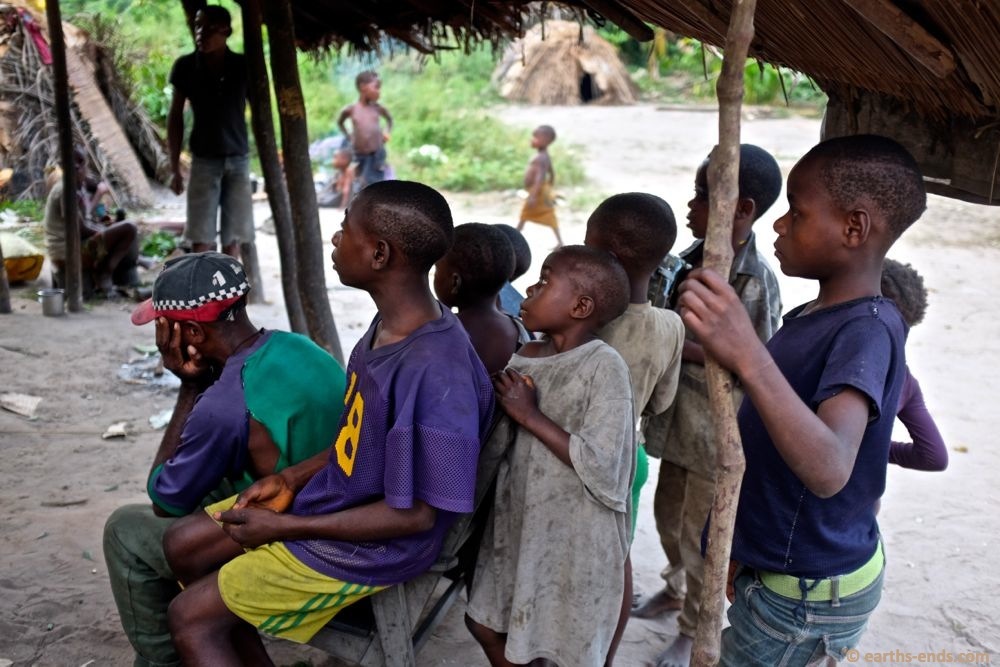
It is hard to imagine that they had heard anything like it until that point.
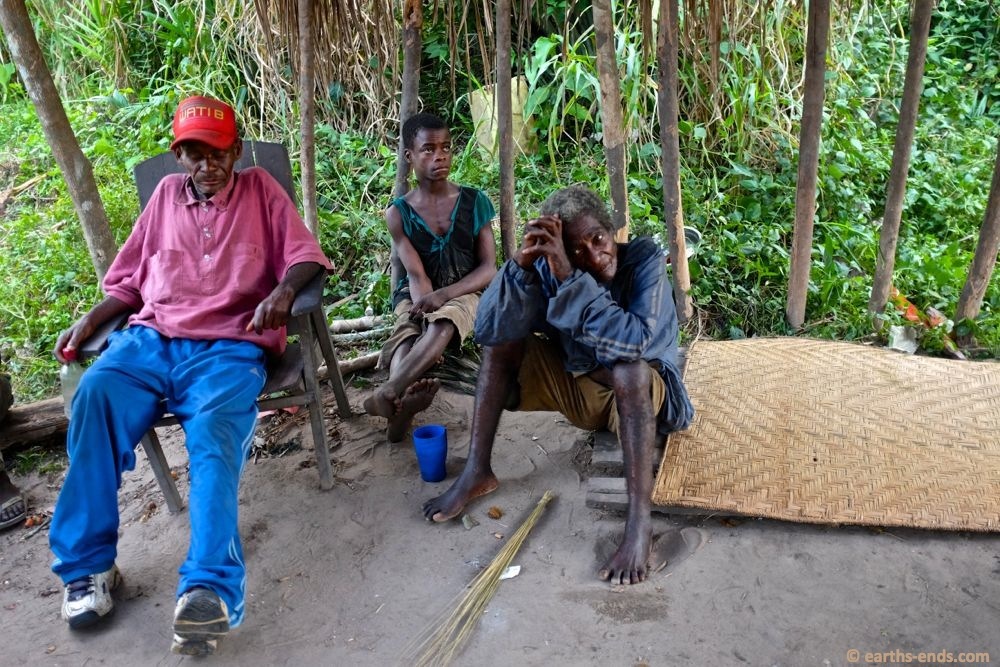
When Mick and I heard Jack sing it was arresting and we are hardly opera aficionados. The reaction of the group was fascinating. They listened with such intensity, most with eyes closed, and looks of deep contemplation on their faces. One woman’s reaction was particularly strong. When Jack’s song was finished she had the look of a person who had been underwater and just surfaced for air.
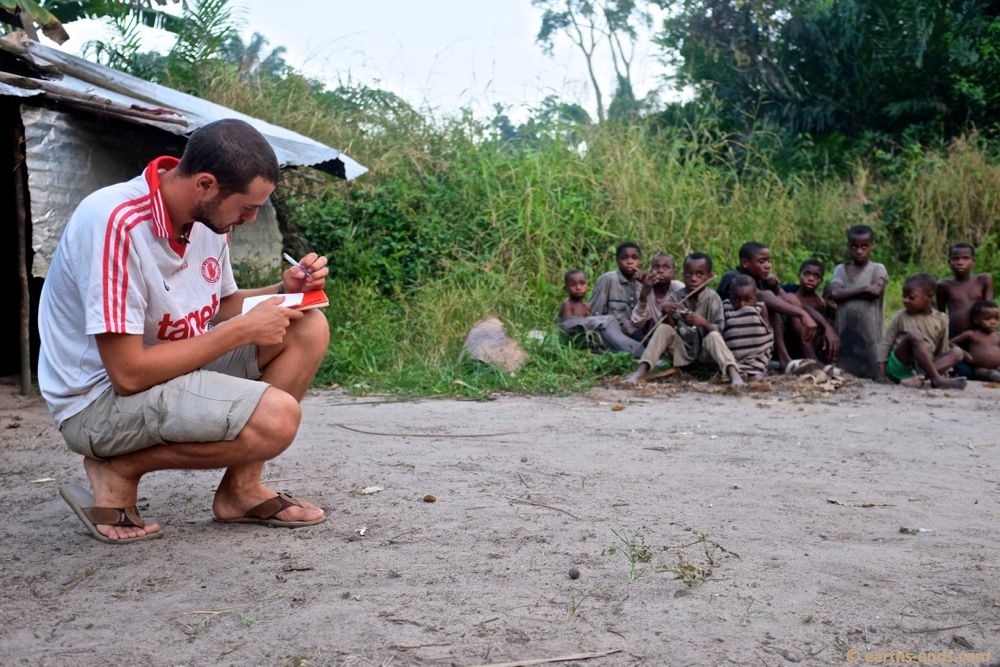
Jack would be staying with the BaAka for a couple of months and would miss Christmas. We told him to write his family a message and we would deliver it by biker post “the world’s slowest and least reliable delivery service”. We sent a photo of his note and him writing it to his mum on Christmas day. This is that photo.
Dusk settled and groups of younger people from nearby villages started showing up. It seemed the children and adolescents would be dominating proceedings. A fire was lit. And we soon came to understand what all the fuss was about. Hours of singing ensued.
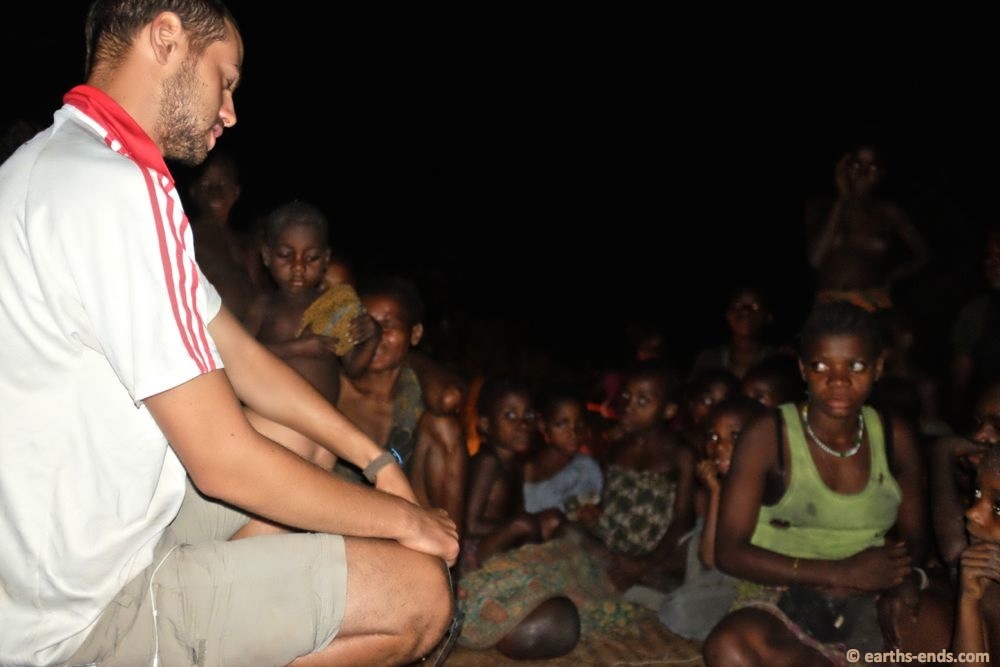
Here is Jack is belting out some opera tunes.
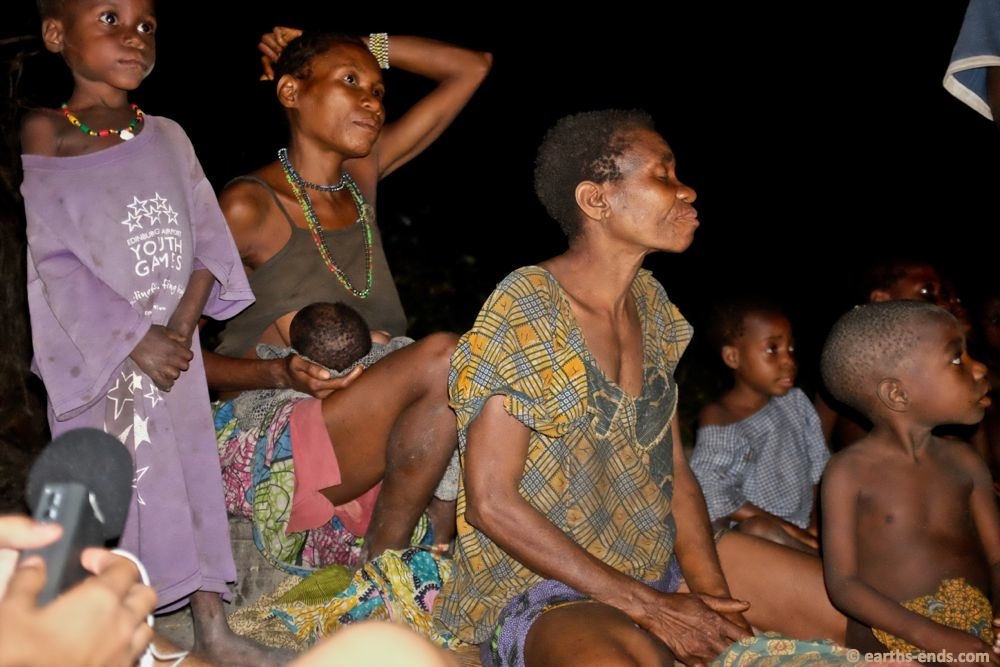
This lady had a particularly strong reaction to his singing.
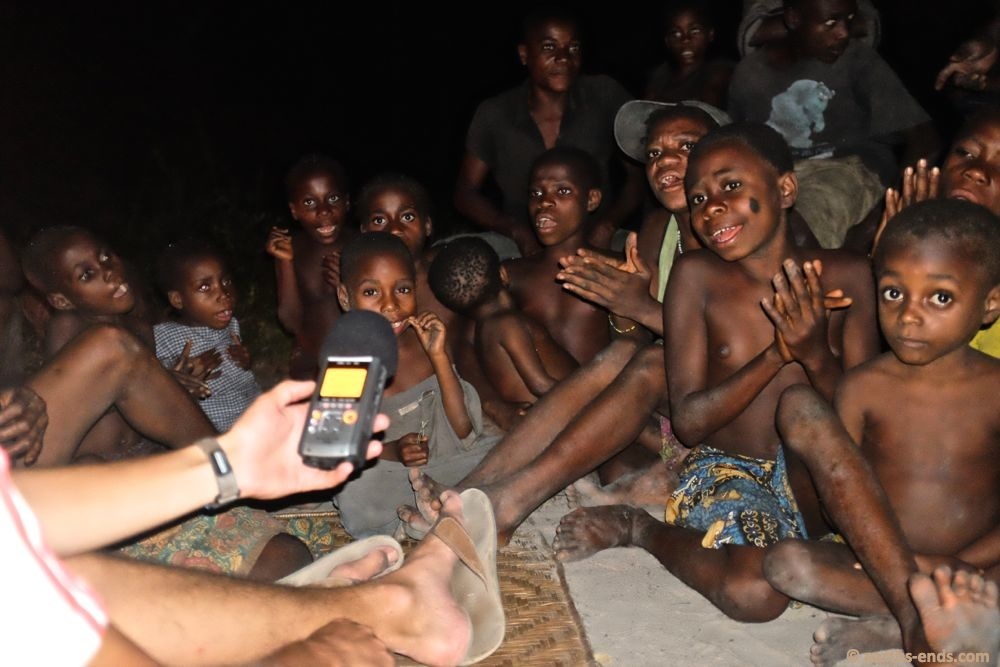
After all the concern that this group of BaAka might have lost a lot of their singing traditions with increasing exposure to the outside world, it was so lovely to see singing traditions alive and well in all the young people there that night.
https://vimeo.com/270821645 Most BaAka music is famed for its complexity and its polyphonic nature where several melodies are sung simultaneously. The melody and rhythm are repetitive and accompanied by polyrhythmic percussion.

More of Jack’s singing.
https://vimeo.com/279841769 Here is some audio to go with that.
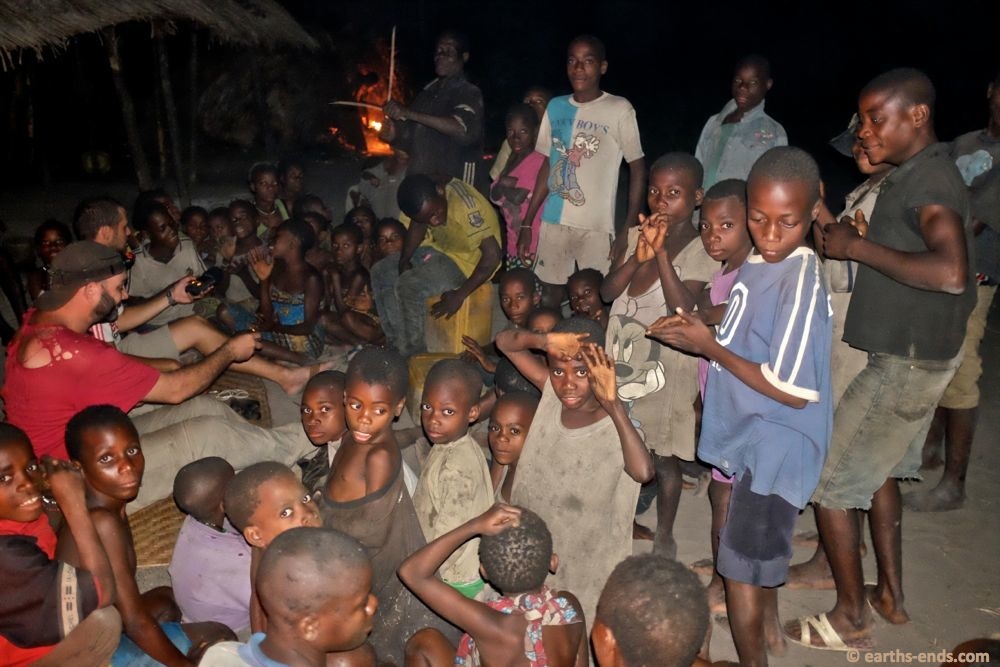
Most of the singing was carried out by the children and youths but several adults stepped in from time to time for what seemed their general enjoyment and coaching purposes. Here you can hear some adults singing along.
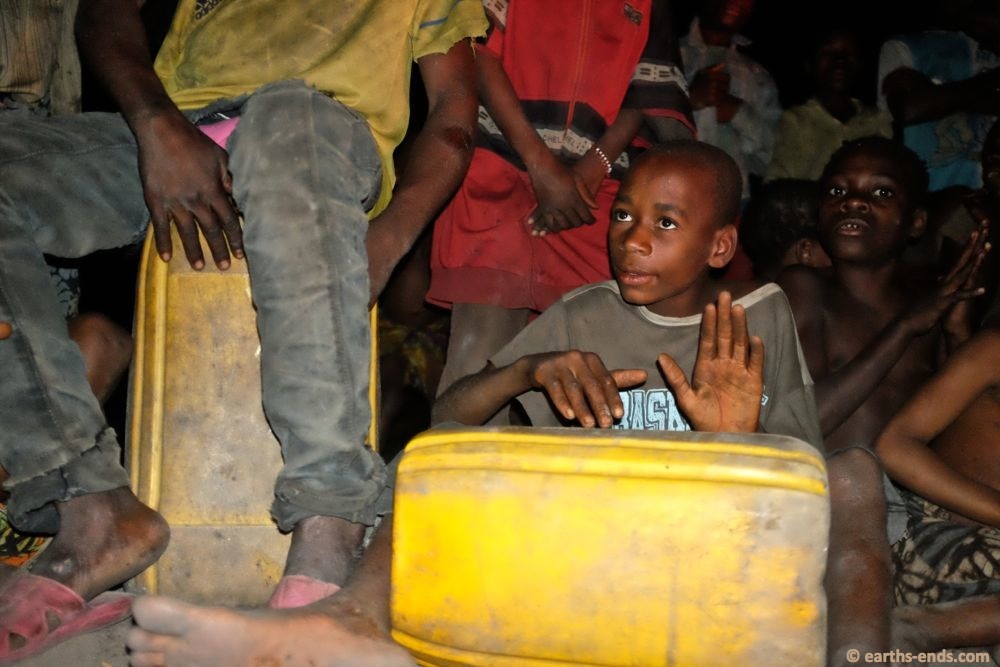
This young fellow was deemed by everyone to be the best percussionist around. A big fuss was made when he arrived.
The night’s festivities came to a disappointing end when a protracted fight broke out. By all accounts physical violence is quite uncommon amongst the BaAka with violence against women being especially rare compared to other societies including our own. It was hard to determine the cause and what was going on with no shared language, but it appeared a young BaAka bloke from a nearby camp was making a nuisance of himself and pushed things too far. We had observed the fellow being obnoxious and pushing other guys about, getting in people’s faces and just generally appearing desperate for a reaction. Those he hassled had exercised a lot of patience by just walking off and ignoring him. But he wouldn’t quit. He was getting in their way grabbing at their clothes until someone finally had enough and went at him.
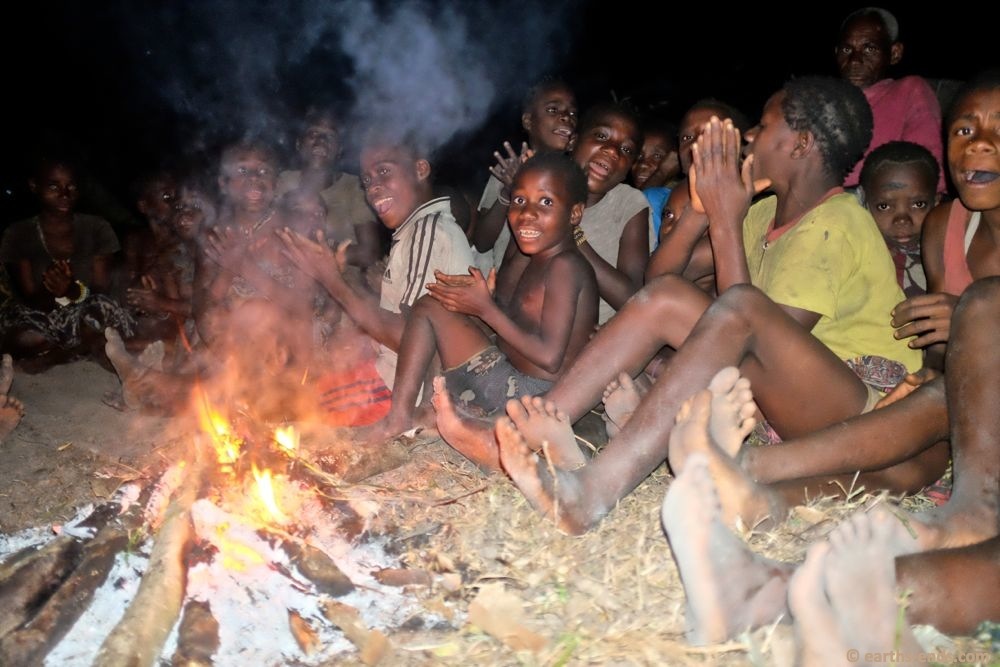
People were obviously enjoying themselves.
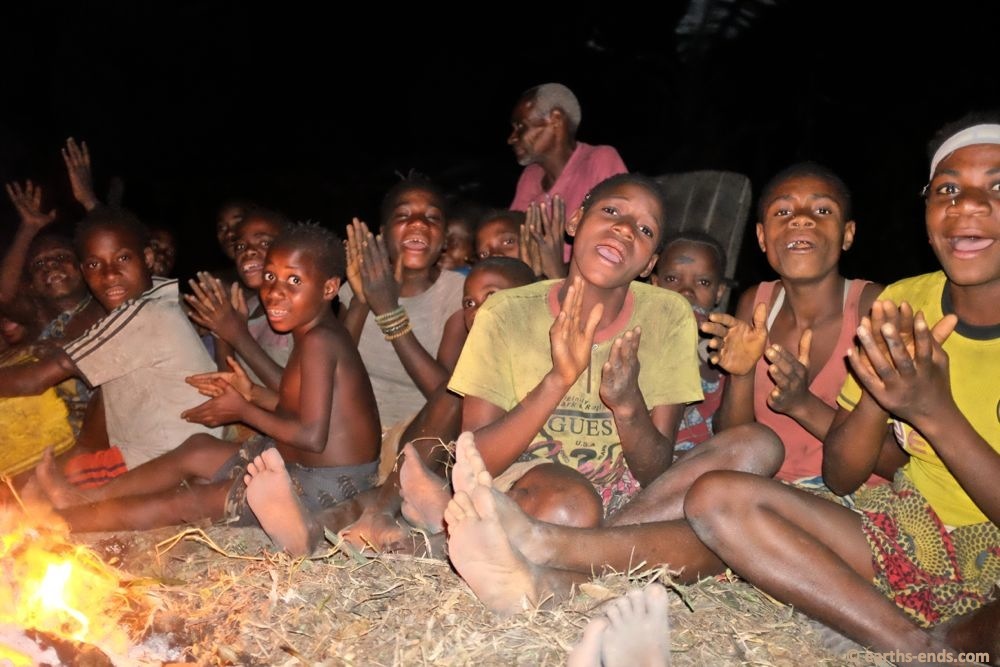
And the older ones in particular loved hearing their singing immediately played back to them via Jack’s recording device.
https://vimeo.com/270821645 Some songs will have little variation throughout but there is a lot of improvisation involved.
The most curious thing about it all was that he was easily knocked on his backside, scarcely putting up a fight. We all thought that was that but he just kept coming back and harassing people and getting knocked down. Then it became a bigger affair with more of the blokes involved. The instigator ended up copping a sound beating. At one point a woman grabbed a big log off the fire and smacked one of the guys in the back with it sending embers flying. I assume she may have been a wife or mother trying to stop someone close to her getting involved. Totally outsized and outnumbered the guy was dragged off somewhere else where we had no idea what was going on. It was an unpleasant end to the night and I found it quite sad and confronting. Not long after that we went to bed.
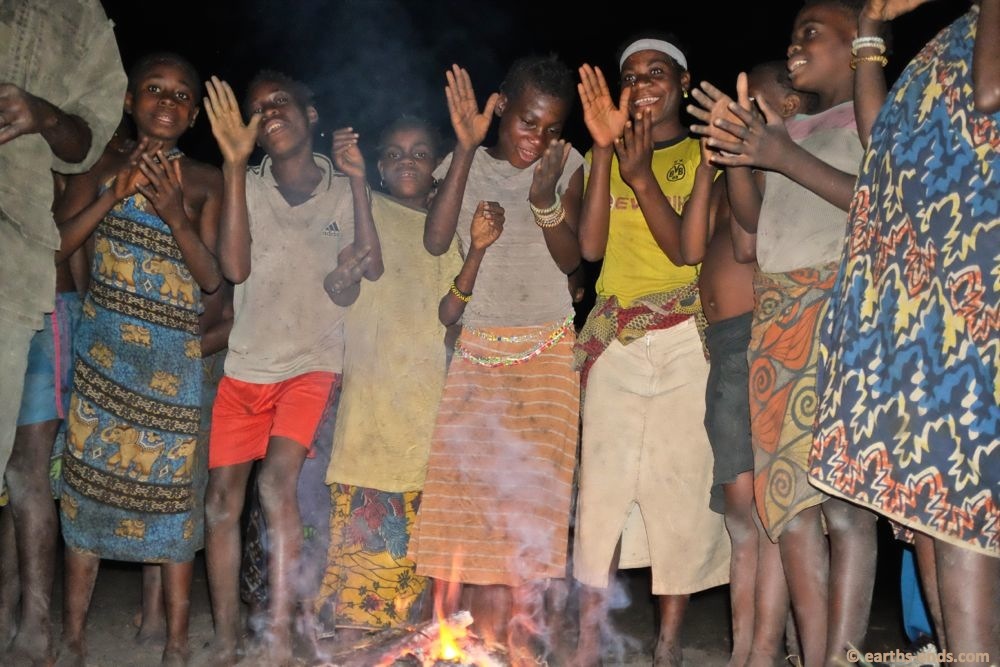
Mick and I was stunned to hear such complex music coming from such young kids.
The next morning we set about packing our things and trying to gleam what had happened the night before. I couldn’t imagine we would see the instigator again and if we did he’d not be in a good way. So imagine our surprise when we see him strolling around the camp the next day. I would have thought it would be the last place he wanted to be considering the strife he went to so much effort to bring upon himself.
We did notice that Jenga the chief watched him very carefully as he went by, and that one of the kids in this camp now had his sunglasses that he seemed so proud of the previous day. They were just the lenses of sunglasses that he affixed to his face by a piece of string. But they were a material item he had that others didn’t. At least until he caused trouble and lost them as a result.
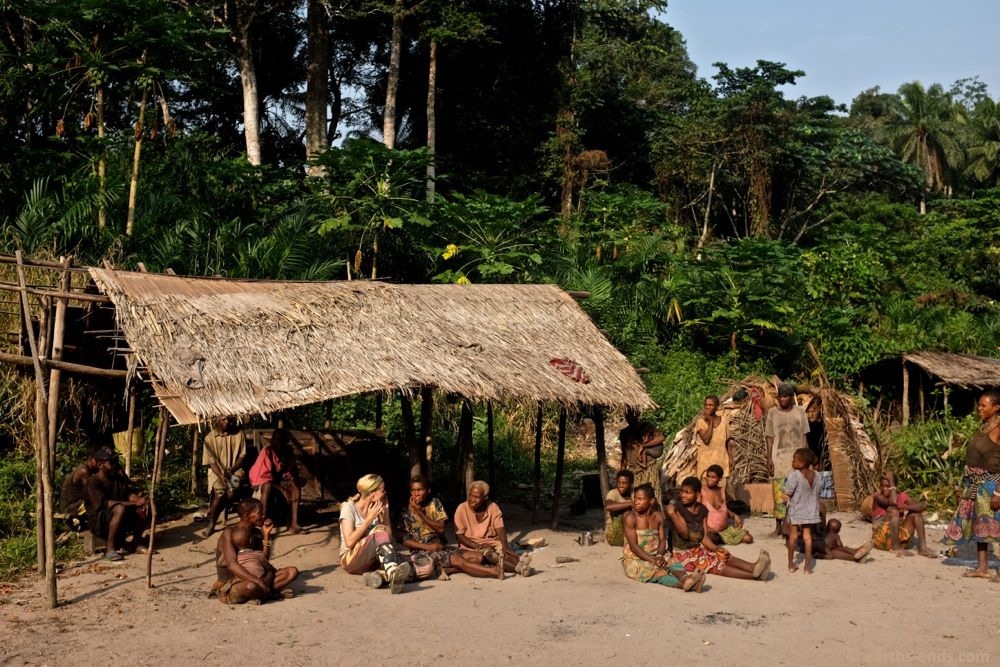
The ladies time to hang out in the communal area.
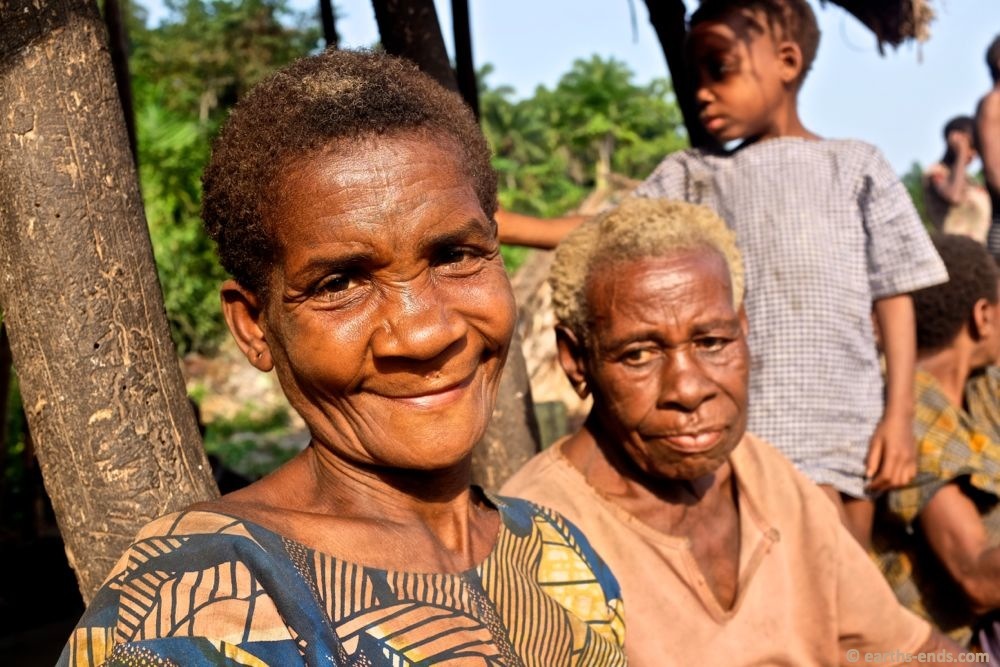
Some kind old ducks. They seemed interested in my hair, skin and clothes.
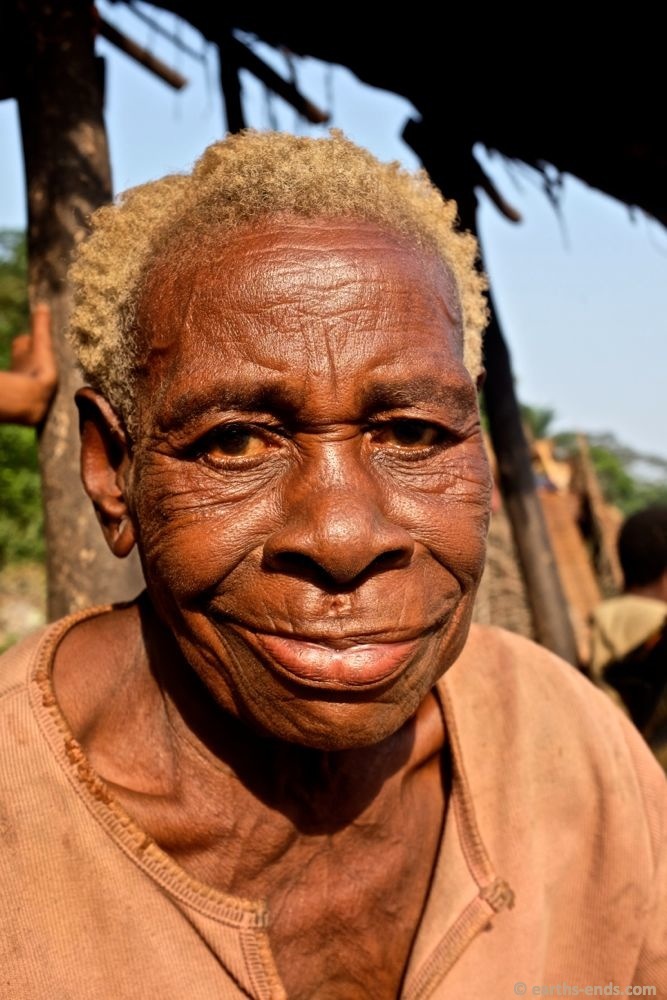
I must have been one of the biggest women they had ever seen.
As uncool as the previous night’s fight was it didn’t really have us worried for Jack and his plans to stay in the village for the next couple of months. We were by this point sure he would be treated well but suspected he would get bothered by the Bantu villagers looking to extract money, gifts and favours. Some had already come and tried to tell him that he needed to travel to a larger village and get permission from them to be there. He’d have to pay for a moto taxi to take them there…and they could arrange one for him. Hmmm.
Call us cynical but that looked a lot like an attempted extortion exercise but such is the nature of travel in Central Africa. Where poverty abounds, and corruption is endemic people will do what they can to get money from those who seem to have more than enough. Which relatively, of course, we do. After all this time in these parts it had started to play on my mind heavily. Each attempted extortion, be it a fabricated fine or an outright demand for money, I would get progressively more angry and resentful of it when it happened. Then I would have such periods of guilt for that anger and for having such wealth and security in life that I would be convinced we utterly deserve it.
But back to Jack – We were actually more concerned at how he would be able to physically hold up in the environment for that kind of time. I was worried about malaria or something waterborne and nasty not to mention skin conditions that were common in the forest environs. But he was a tough guy with a great attitude and would have people looking out for him. That is what we repeatedly told each other over the intercom after we had said our goodbyes and rode away. I had tears in my eyes and remarked how it felt if strange (if not totally wrong) to be leaving him there…even though that was the very purpose of this little trip of ours.
On the ride back we ruminated on the experiences we shared over the last few days. We were left feeling grateful for our mutual comfort of throwing plans out the window and acting with spontaneity when something and someone interesting presented itself. And Jack and his random solo quest certainly fit that bill. What a pleasure to have met him.
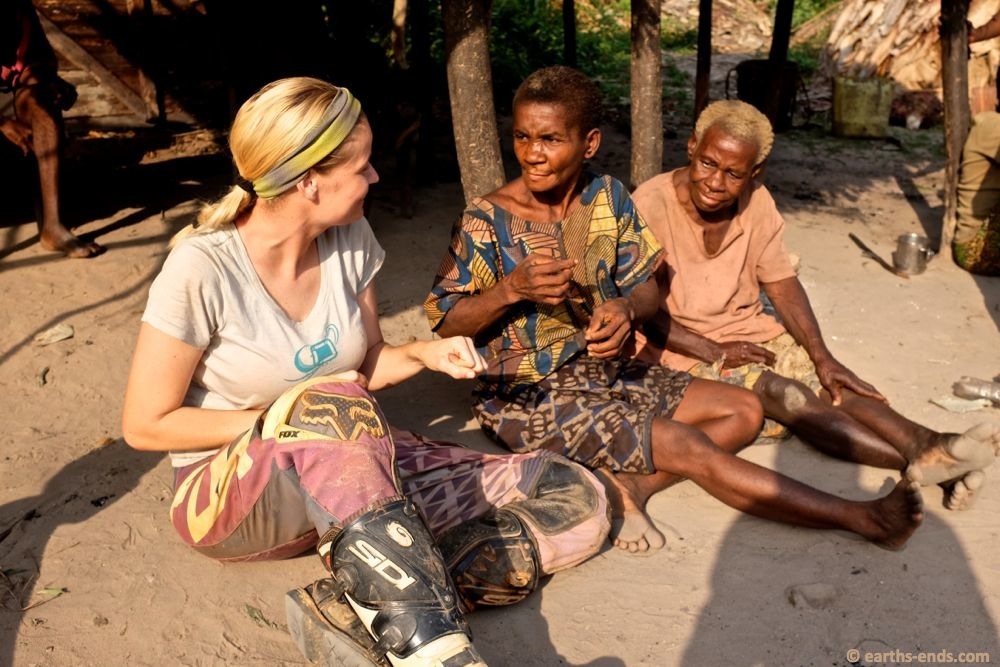
Here we were trying to communicate about tattoos and how they were done. Facial tattooing is common amongst the BaAka, particularly the women. I saw several ladies with lovely facial tattoos but was too shy to ask for a photo.
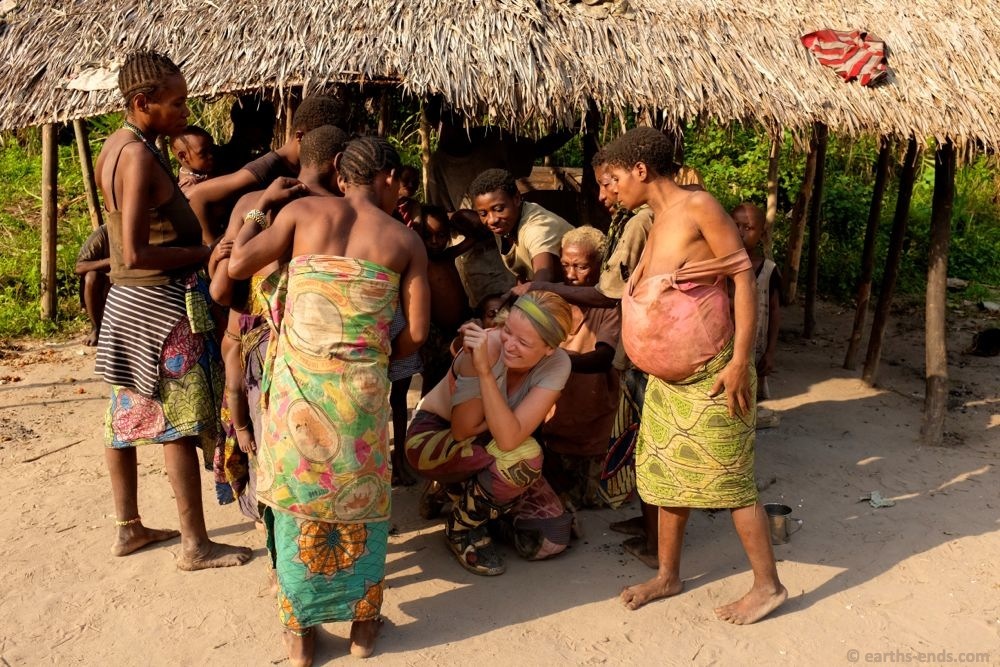
They were quite stunned at my tattoos.
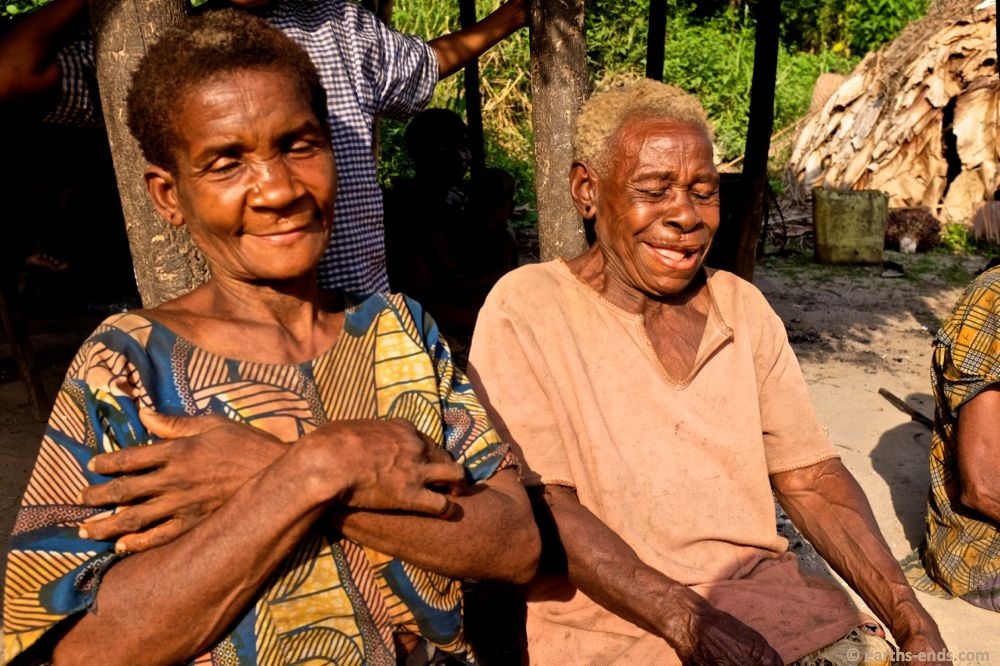
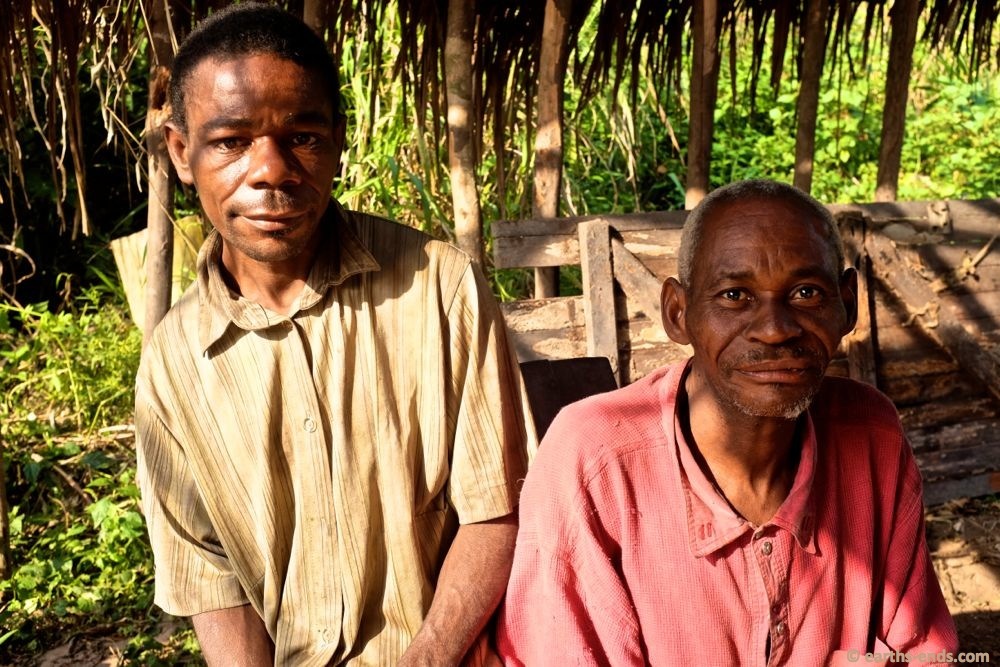
Jenga and his son I am guessing.
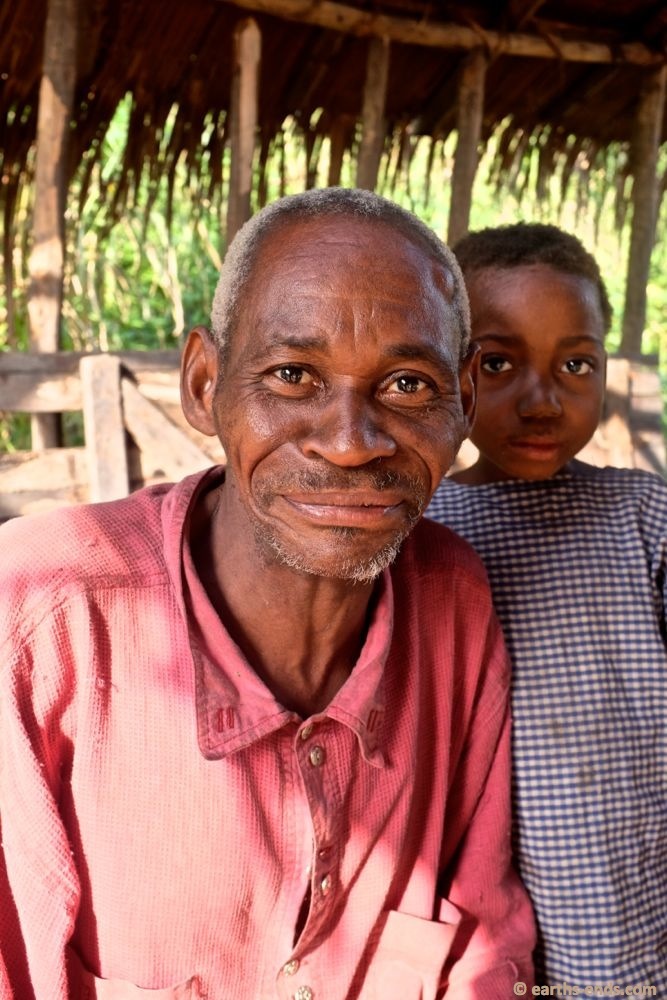
We thought Jack would do well under his care.
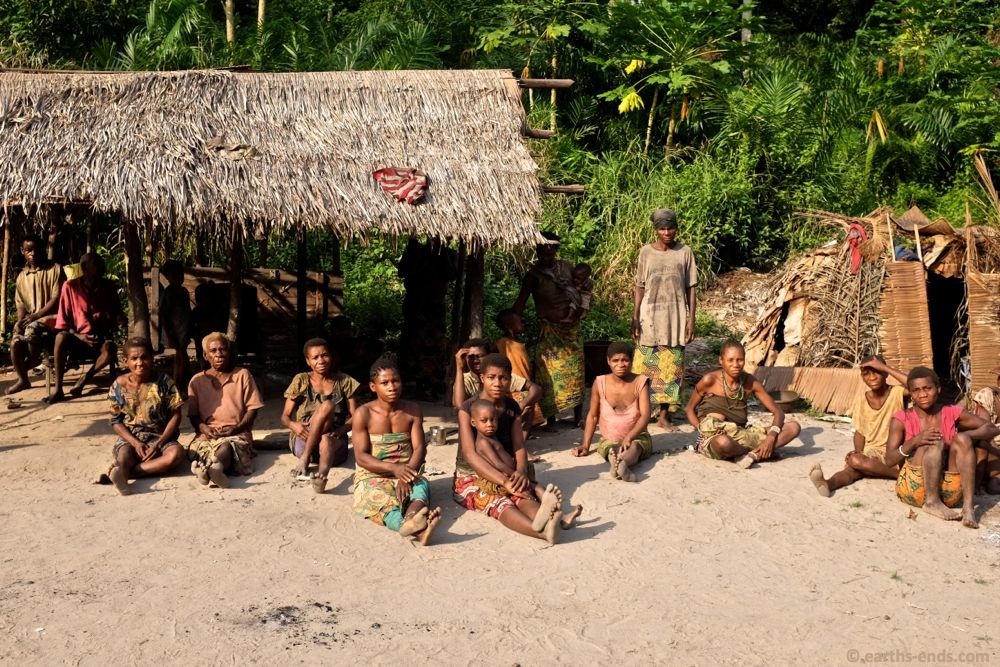
The ladies.
The ride back to Ouesso was swift as we didn’t have to worry about breaking Jack and we knew where we were going. We were soon at the river loading the bikes and not long after that we were back and our favourite restaurant in town making up for lost meals. We’d been gone just a few days but it felt a great deal longer.
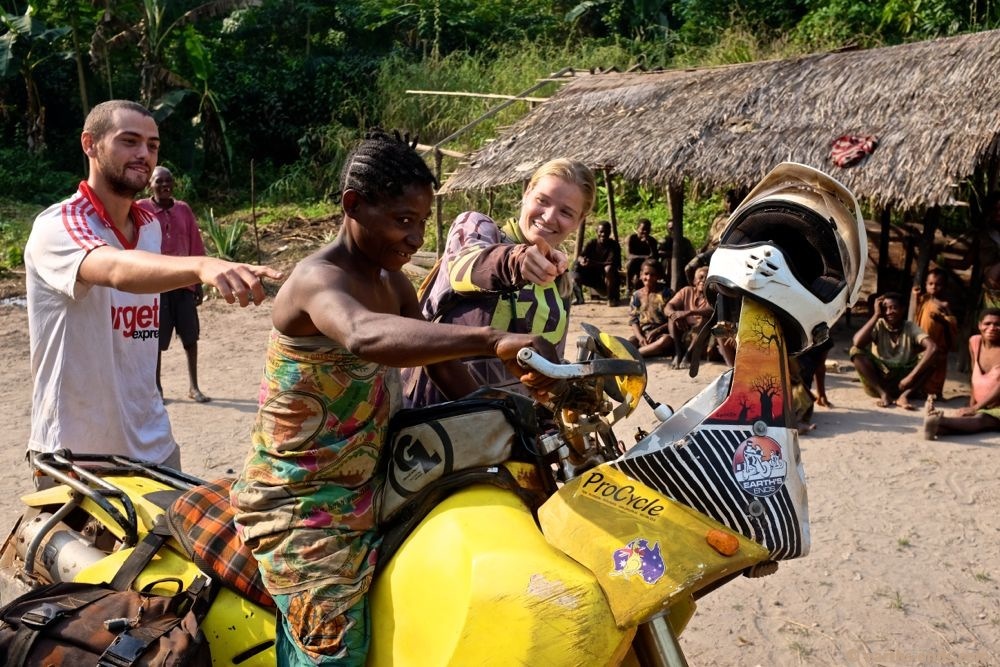
We asked if anyone wanted to get on the bike and this lady was keen.
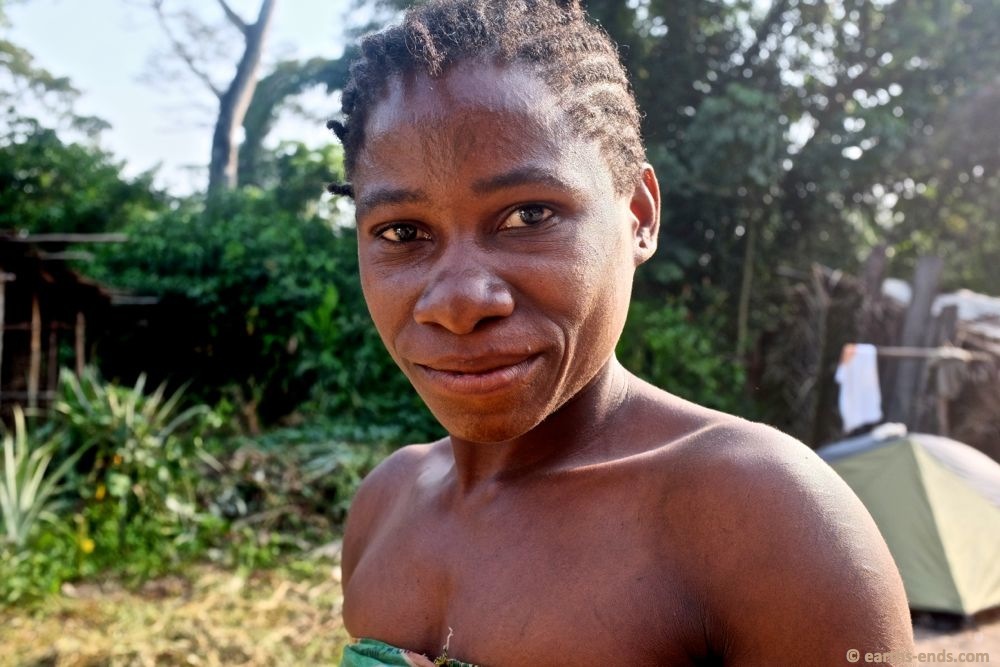
If you look closely you can see some fine tattoos on her forehead.
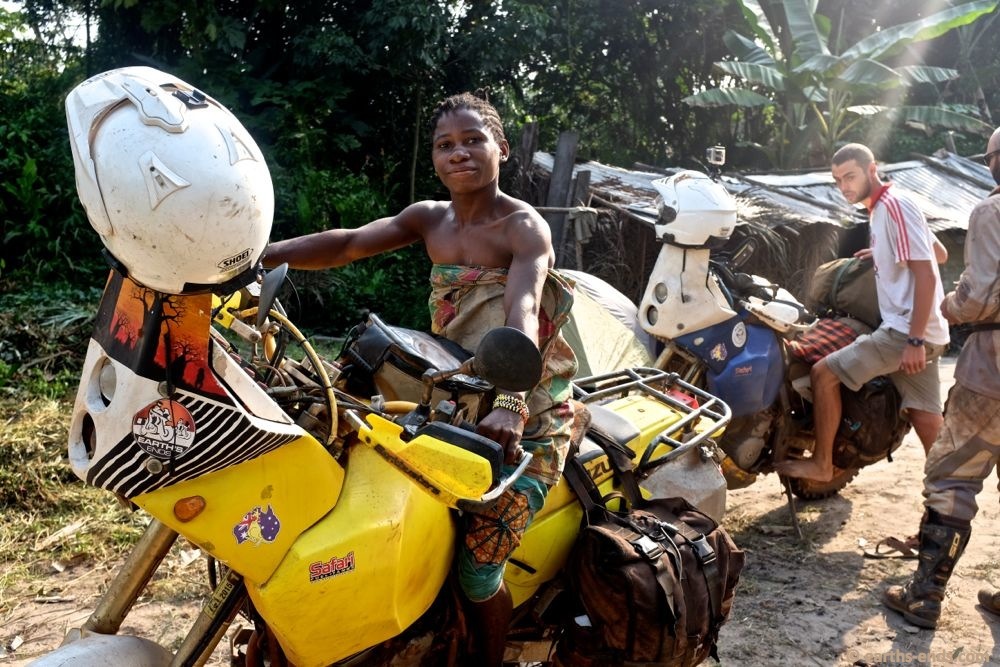
We run PivotPegz footpegs which are an excellent Aussie product that I cannot recommend highly enough. At about $AUD220 a set I thought Mick was nuts to buy them. But I immediately fell in love and will never be without them. They are a wide and very sharp peg. When I put someone with barefeet on the bike I will always rest my boot on the peg and have them step on my boot and save their feet from the spikes. But this woman was so keen she beat me to it. Mick and I were shocked to see her stand barefoot on the sharp pegs like it was nothing. In this photo you can see Mick telling Jack to take his shoe off to get a sense of how tough her feet must be to have done that.
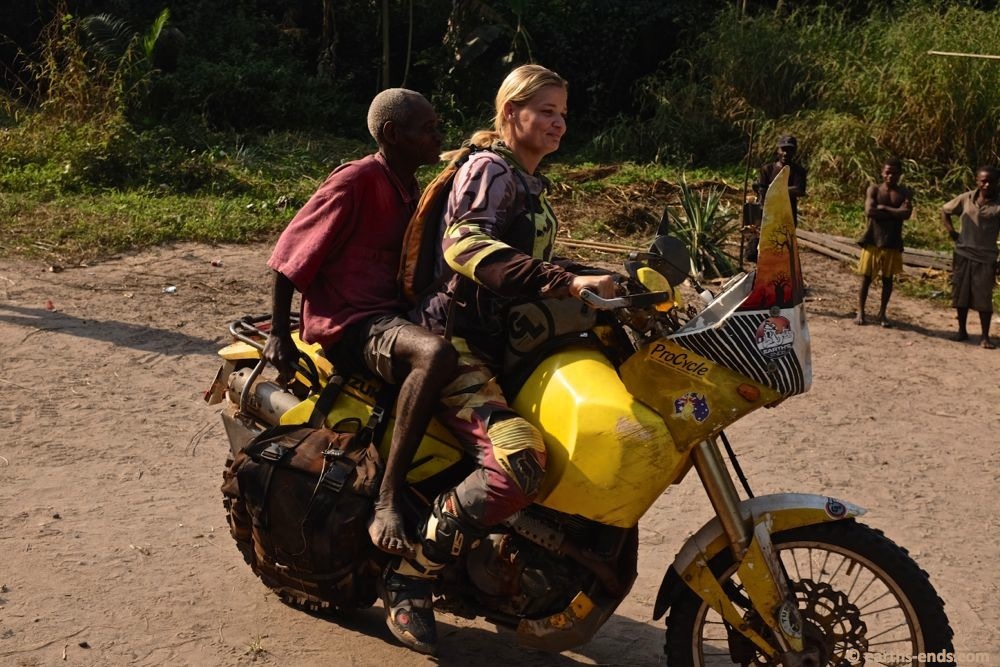
And here I am taking the big man for a spin.
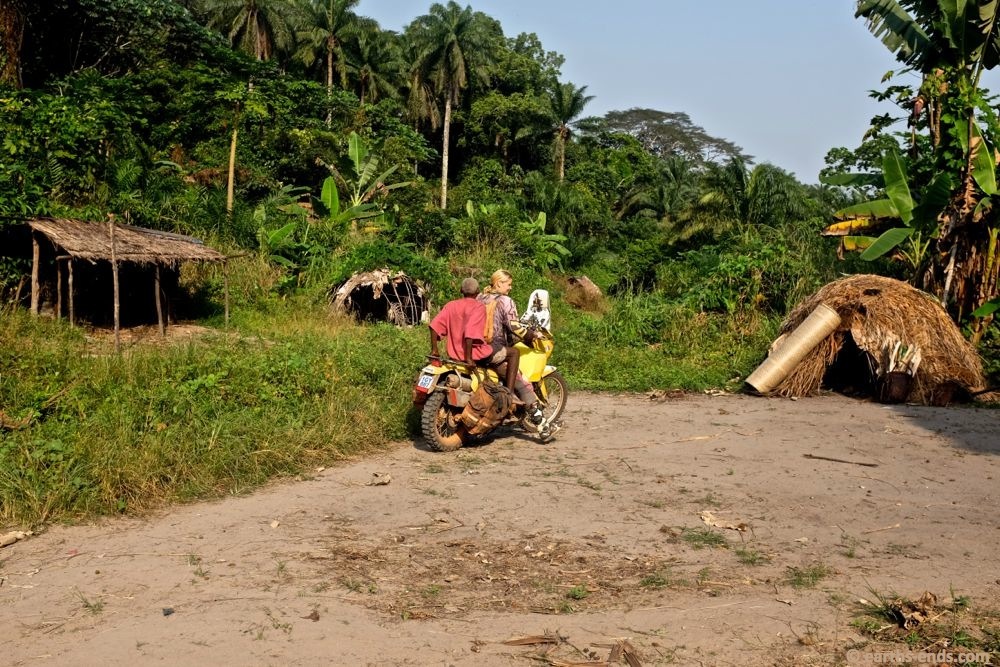
He enjoyed it.
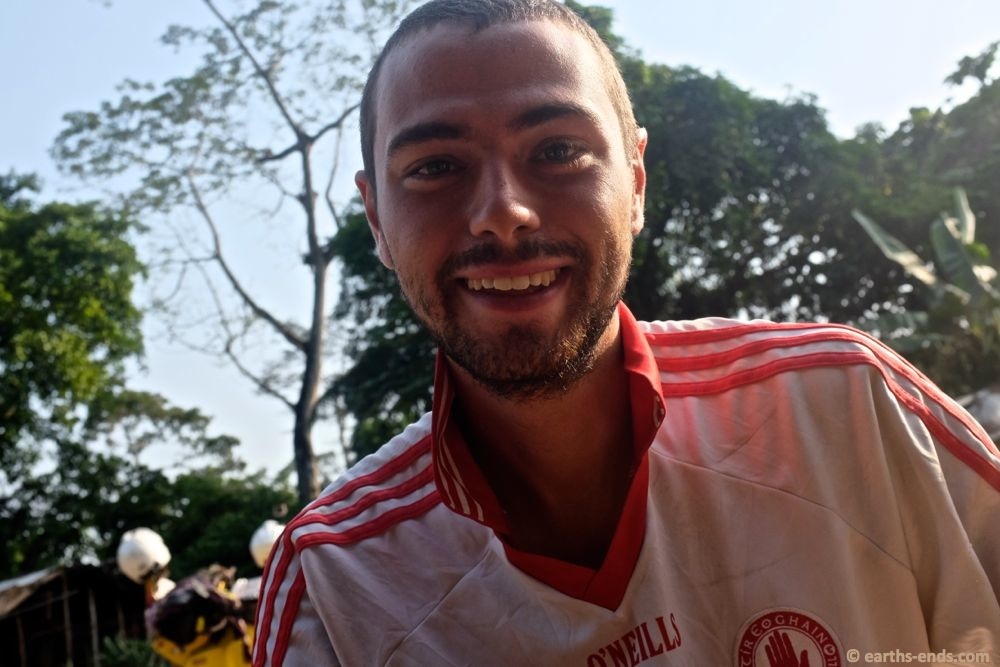
Showing one of the women how to use the camera.
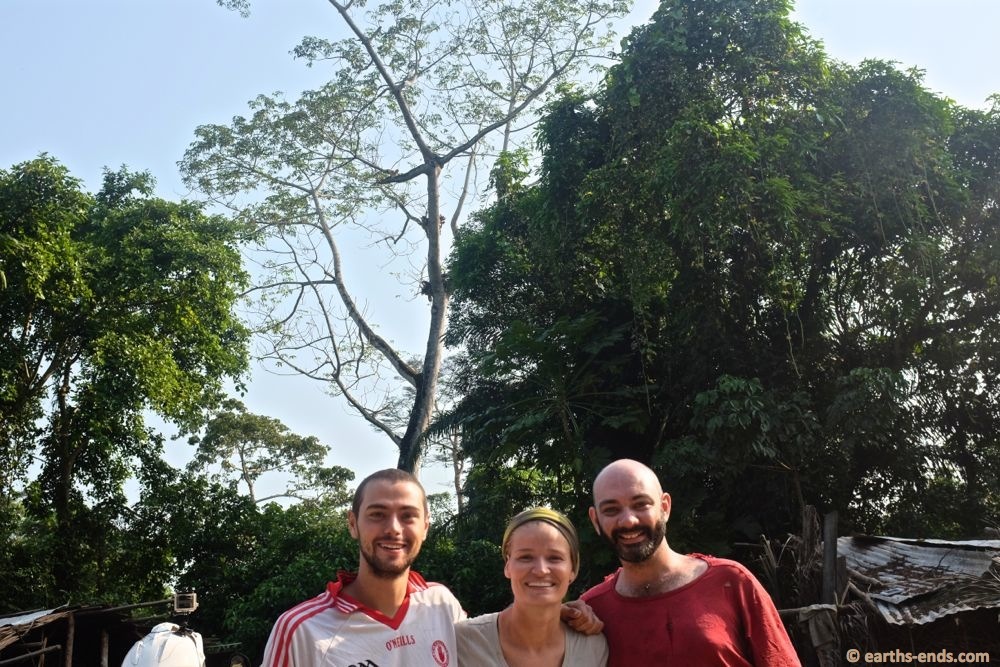
So we could get a photo of our 3-man motorbike gang.
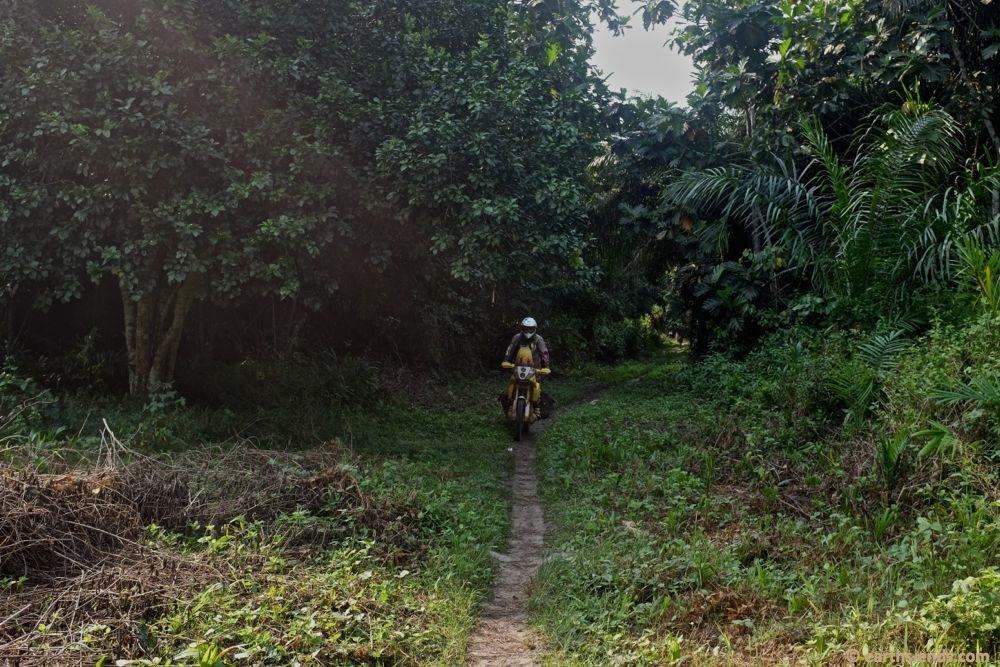
The ride out
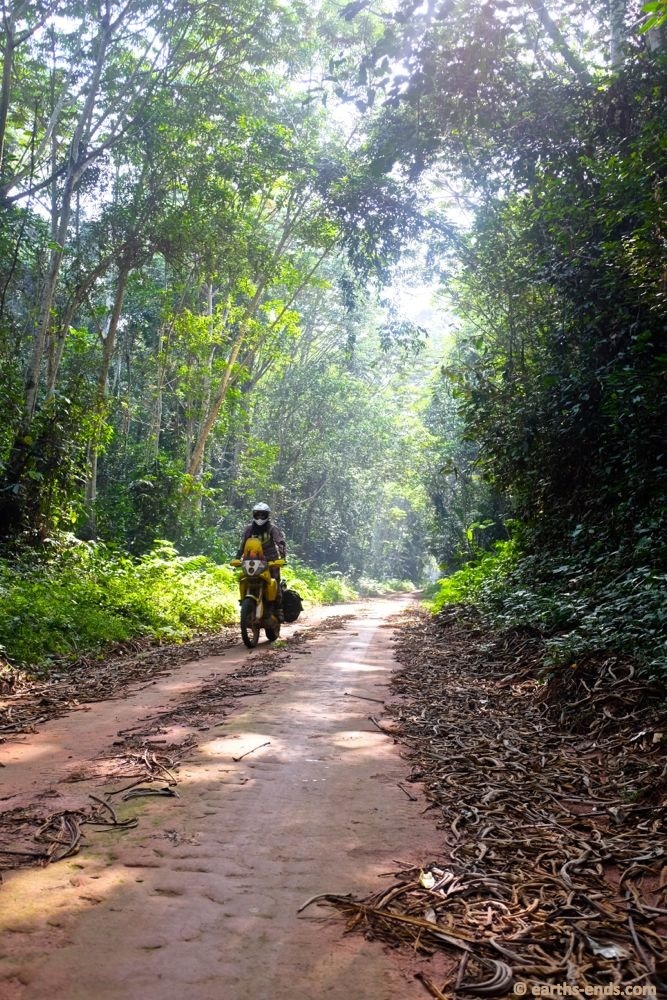
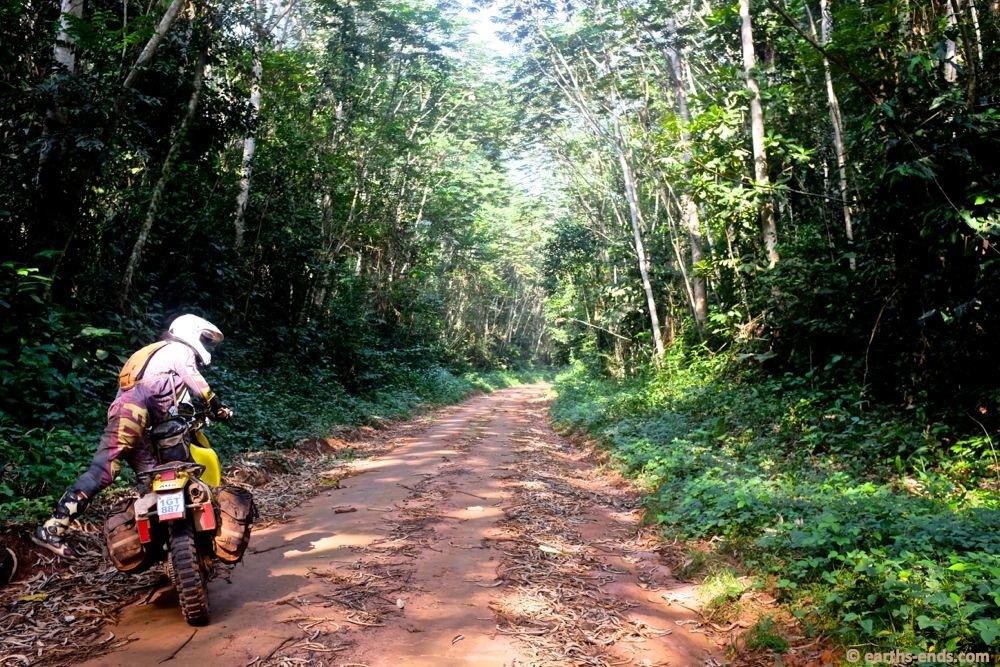
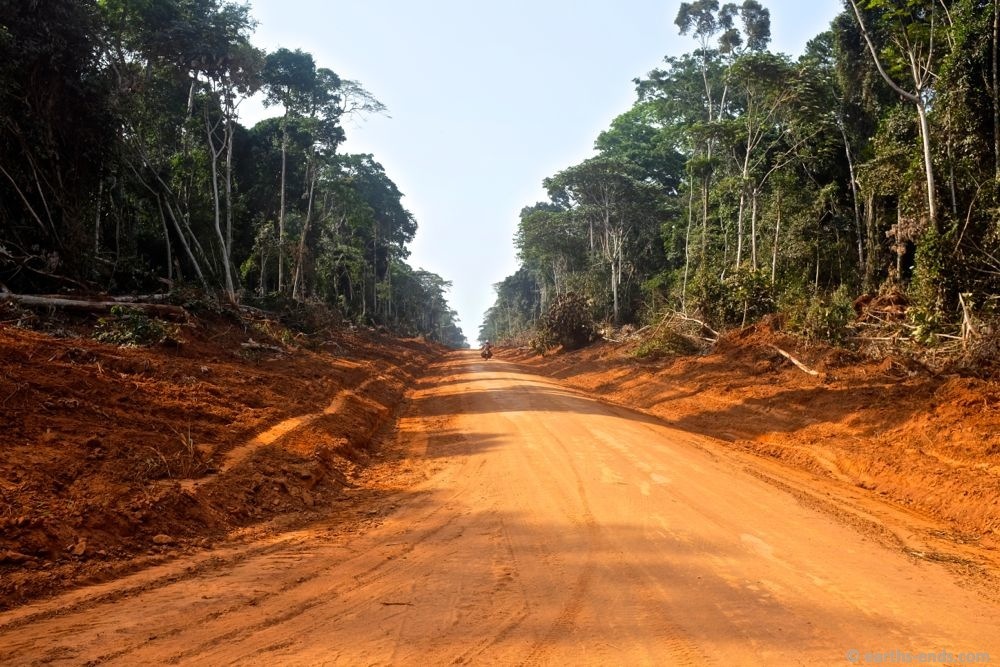
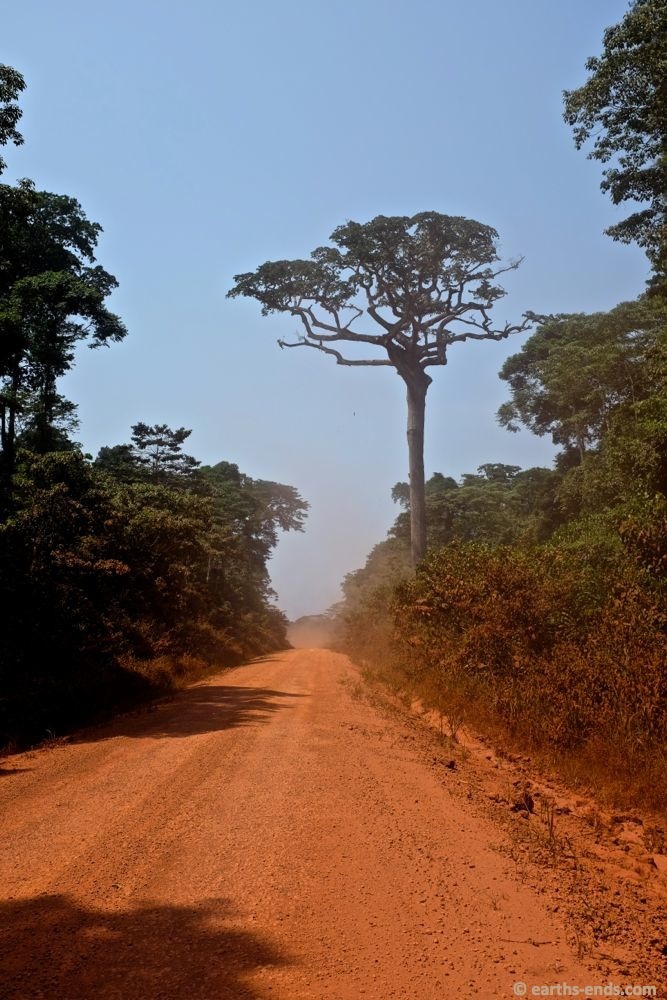

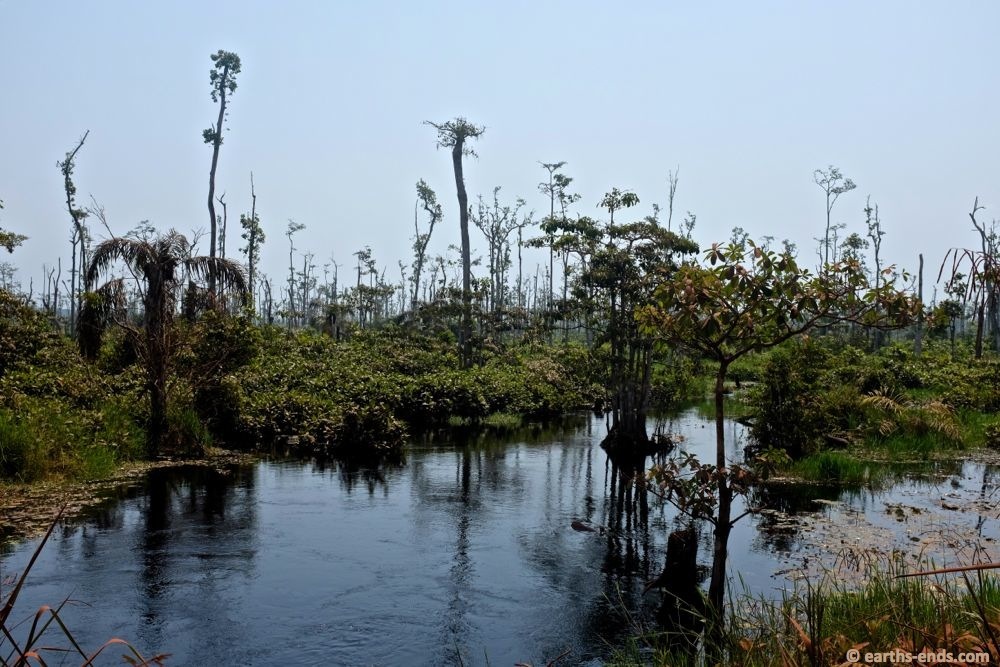
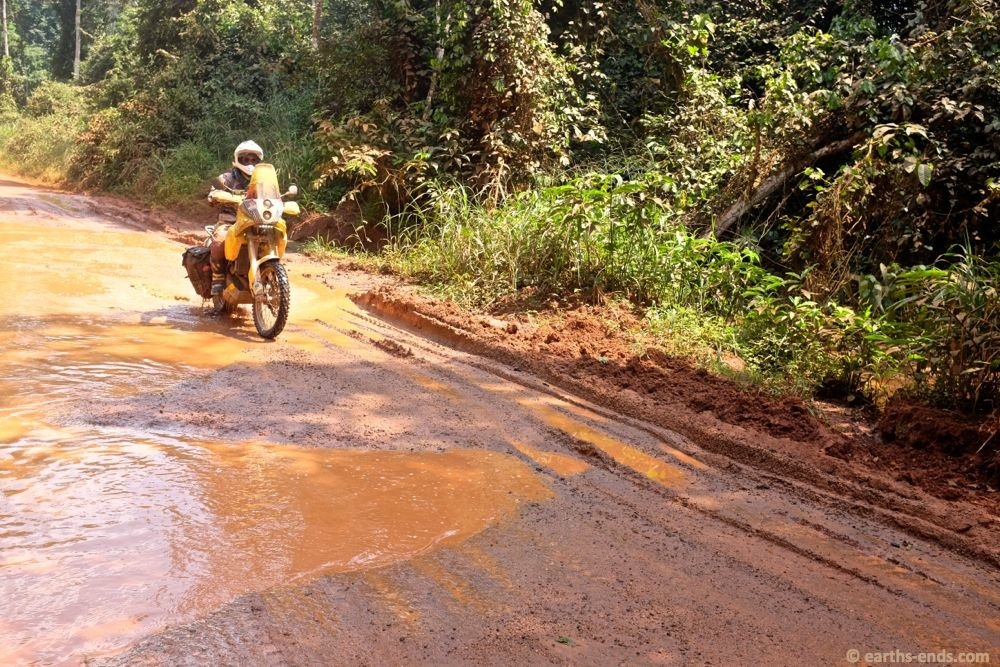
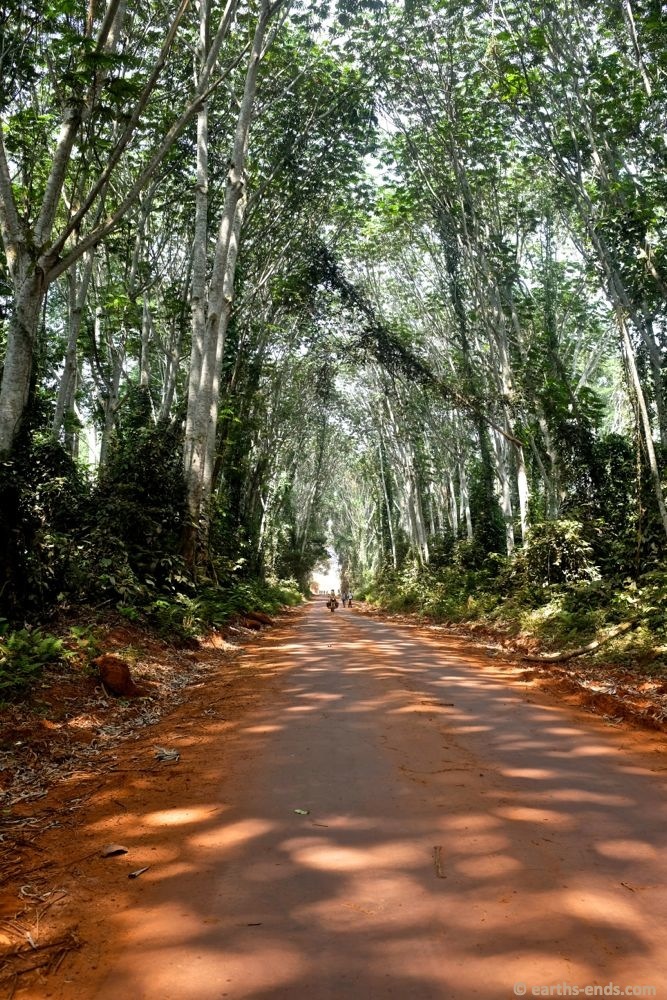
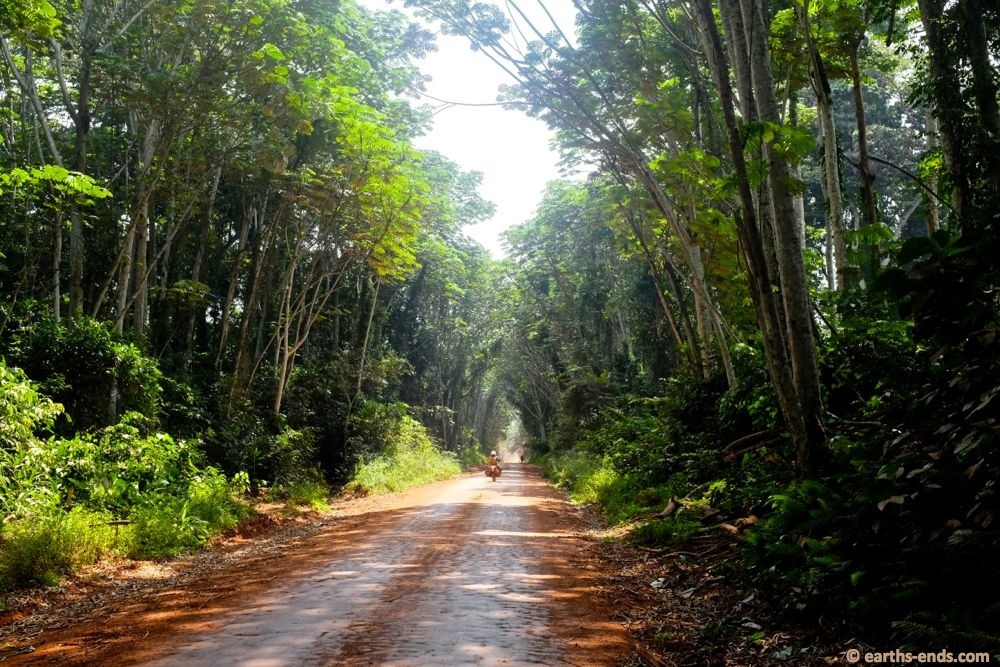
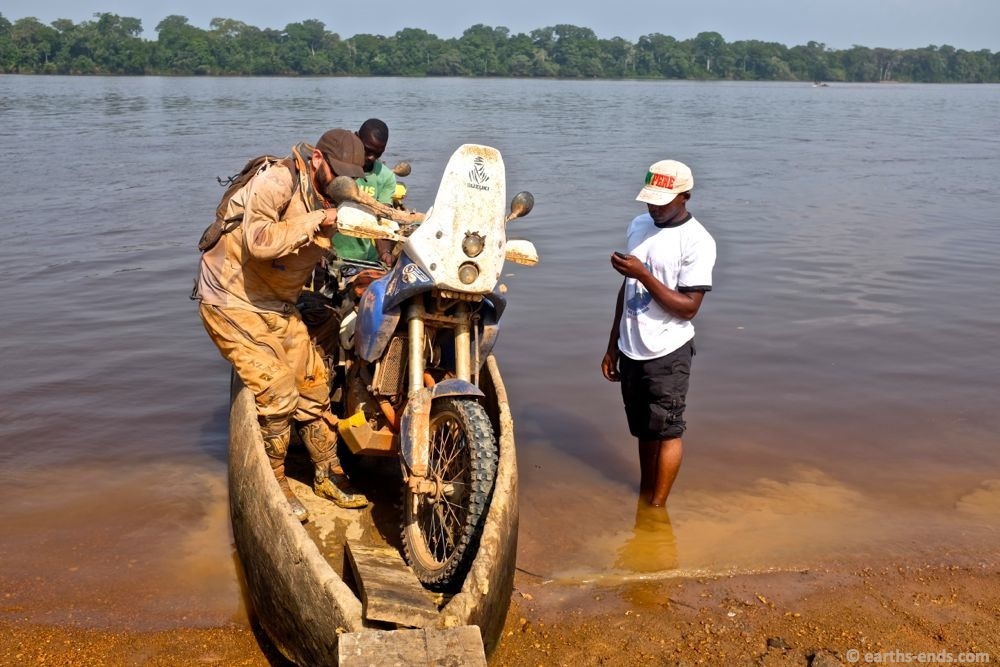
The next day Mick serviced the bikes. Once again Mick dropped his oil and was greeted with unwelcome ‘glitter’ in the oil. He then cleaned out the oil cooler but didn’t manage to get much more metal out of it. Mick then got a long piece of hooked wire and pulled of the clutch cover off and went fishing for bits from the lunched clutch in DRC.
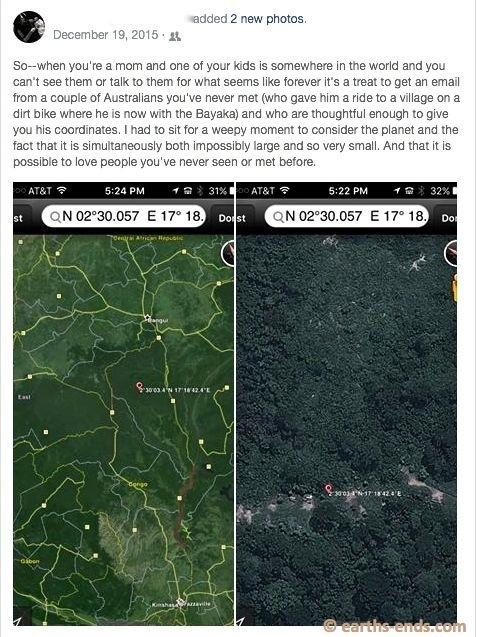
Before leaving Jack in the forest we recorded the GPS co-ords of the very spot he was camped. We then wrote his mum a message and left the co-ords with her. It was a small and simple act for us but we were to learn it meant a lot to her. It was a great demonstration that little gestures can mean the world to someone else. So do them at any opportunity.
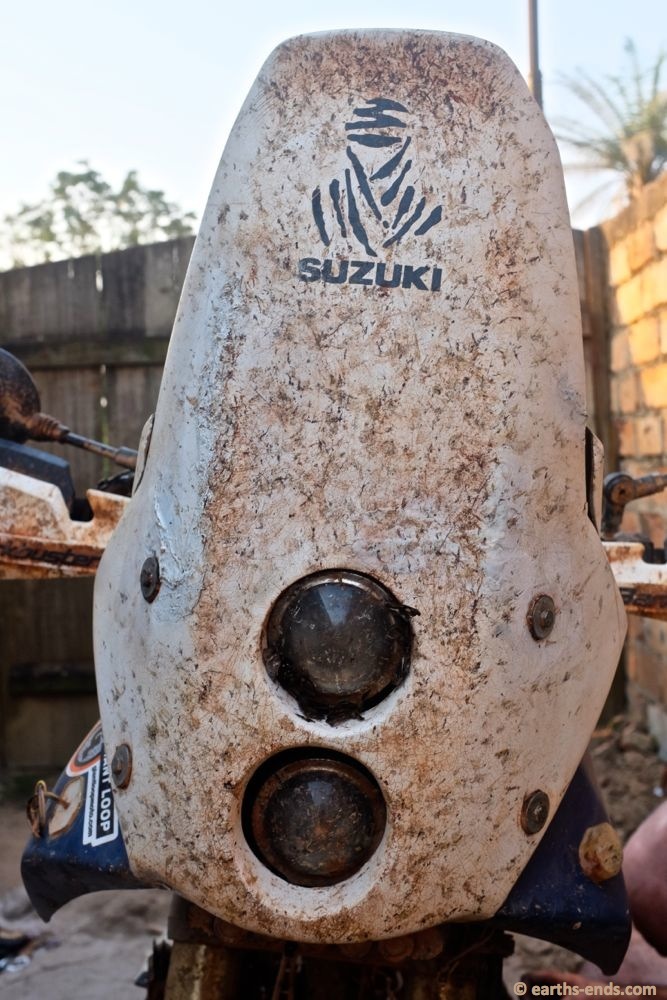
Evidence of the butterfly massacre that was the ride out of the forest.
Mick could see some bits through the sump plug sitting underneath the oil which with difficulty he managed to extract. He was also able to see the sump plug thread has been damaged as a result of bits of clutch ali on the thread the last time he screwed in the plug. Not good news but that’s the way the mop flopped, he just had to be careful now on when tightening the plug. After 3 flushings of the motor he got a fair bit of crap out of the sump and it was looking pretty good again.
With the power still out since the previous night in Oeusso, we hit the streets to escape the heat of our modest little hotel room. We returned to our favourite road side shack for dinner where we had a good feed of fried fish, plantains and rice, washed down with tolerably cool beer.
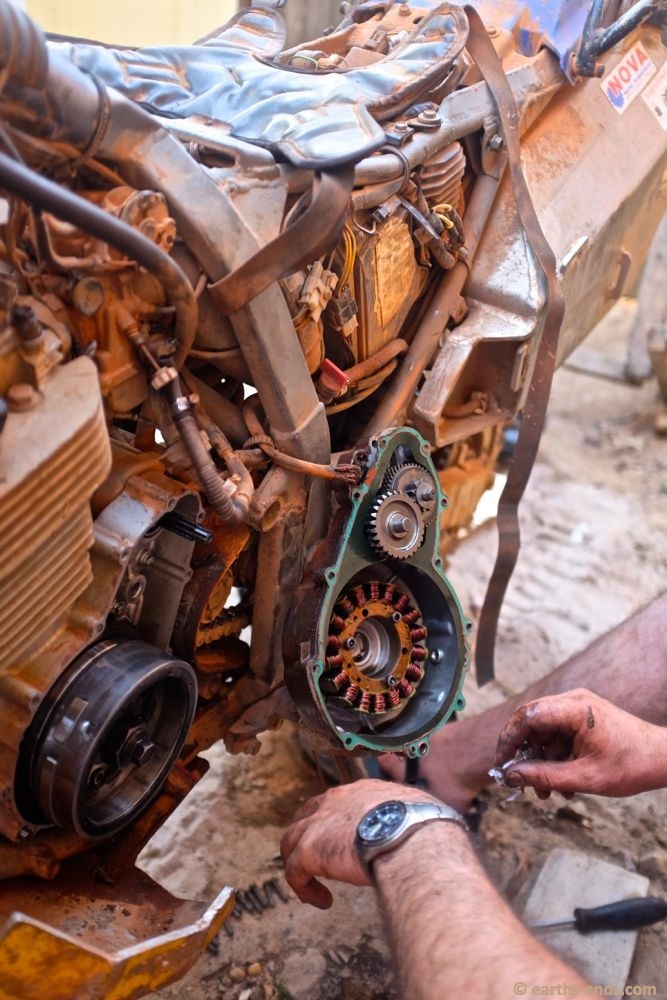
Into the belly of the beast once more
The next day saw more resting, organising and bike work. This time Mick pulled off the top of the motor and cleaned out more fine aluminium. He also pulled the stator cover off and determined it was ok in there. Mick got the bikes back together then we went to Nenophur restaurant for one last time. And just like that another day had passed in Africa.
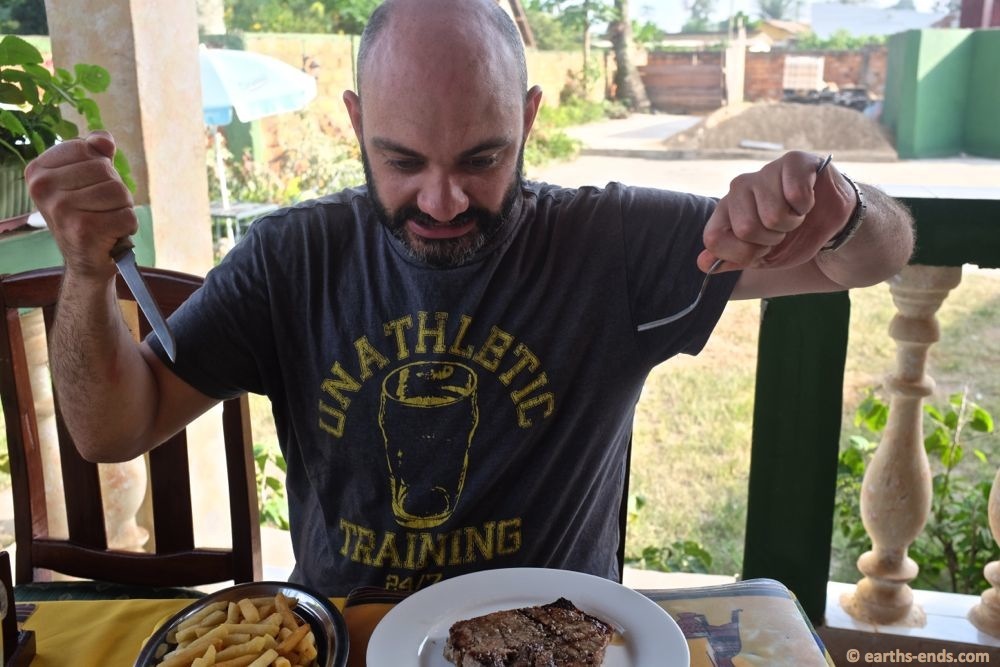
Feasting after a few days of minimal food in the forest. Here is Mick rocking his new second-hand shirt.
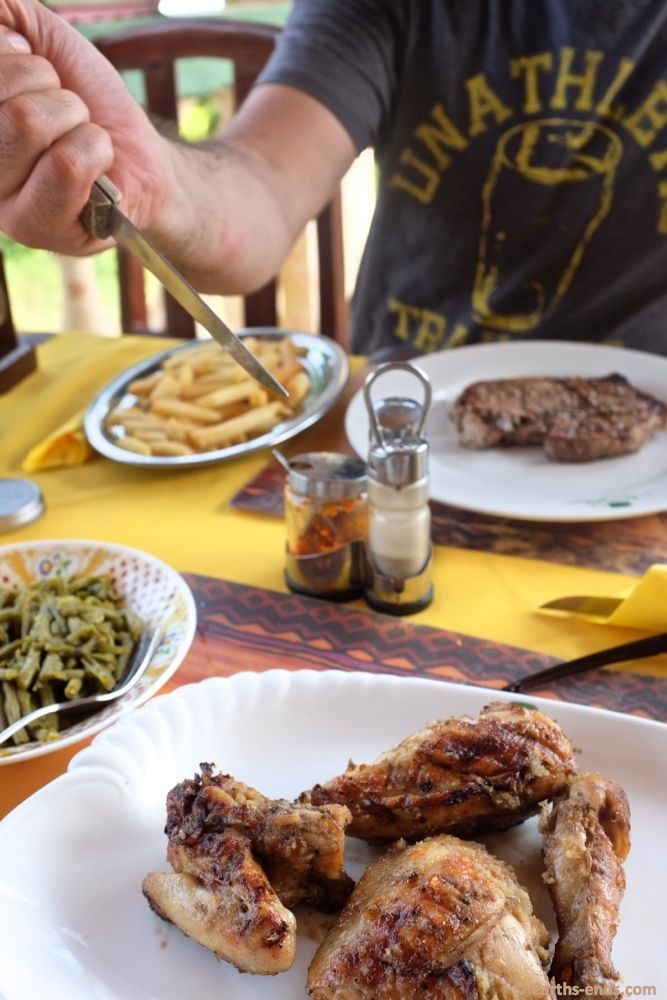
Vegetables drowning in butter and grilled chicken. French African fusion.
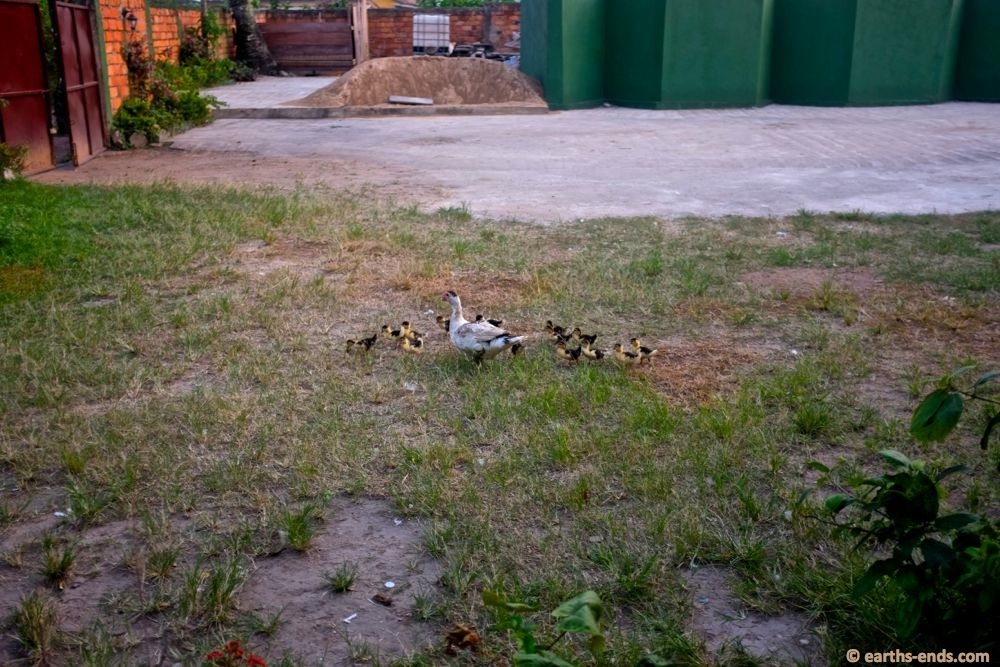
This pic might not mean much to anyone else – but it shall be a life-long inside joke for us so must be included.
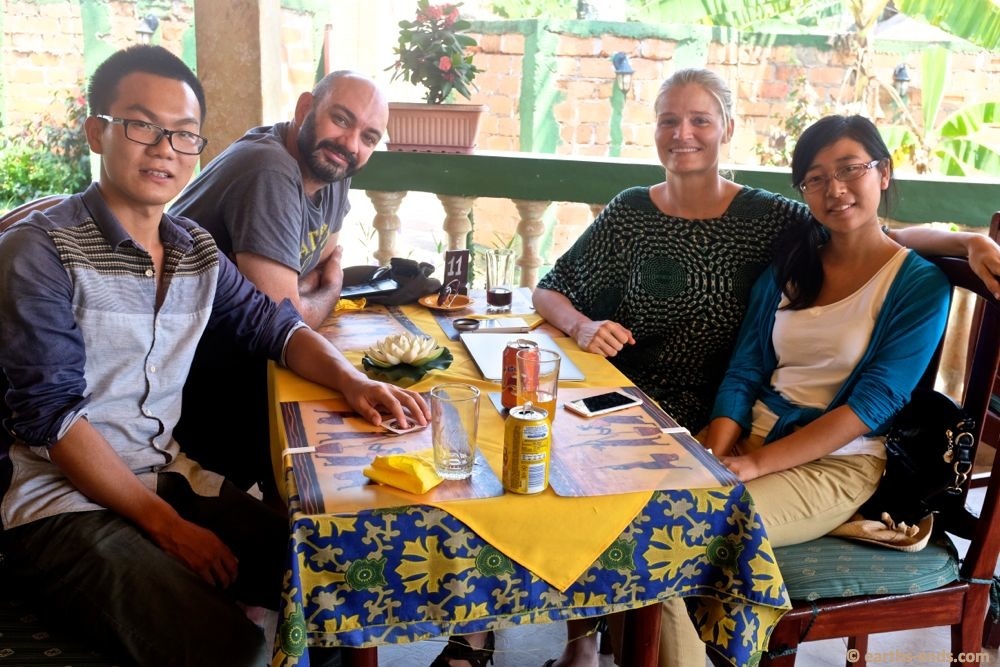
We met these lovely kids from China who were here working on the nearby big hydroelectric project. It was great chatting with them and getting their impressions of the place. They both saw working in Africa as a good opportunity for their careers but it was not without its difficulties. The young woman was a French translator. She bemoaned the corruption of the place and how the police were constantly showing up seeking money. She worried the unrelenting corruption would stop any progress being made in Congo. She pointed out that, “yes, there is corruption in China but we waited until we got richer first.” Not sure it that is exactly true but it was certainly how she felt.
Before leaving I broke Mick the inexplicably devastating news (for him) that his beloved principal riding shirt “Big Red” would not be joining us on the rest of our travels. His ride had ended. Mick’s clothing attachment issues had led to the shirt becoming outrageously indecent. Many Africans take a lot of pride in their appearance and when going out in public often dress impeccably. You can be in the middle of the jungle and find people in devastatingly white, perfectly pressed, long cotton dress shirts. And there we were in heavily worn motorcross gear. On the bright side few people asked us for money as the state of our dress deteriorated over time.
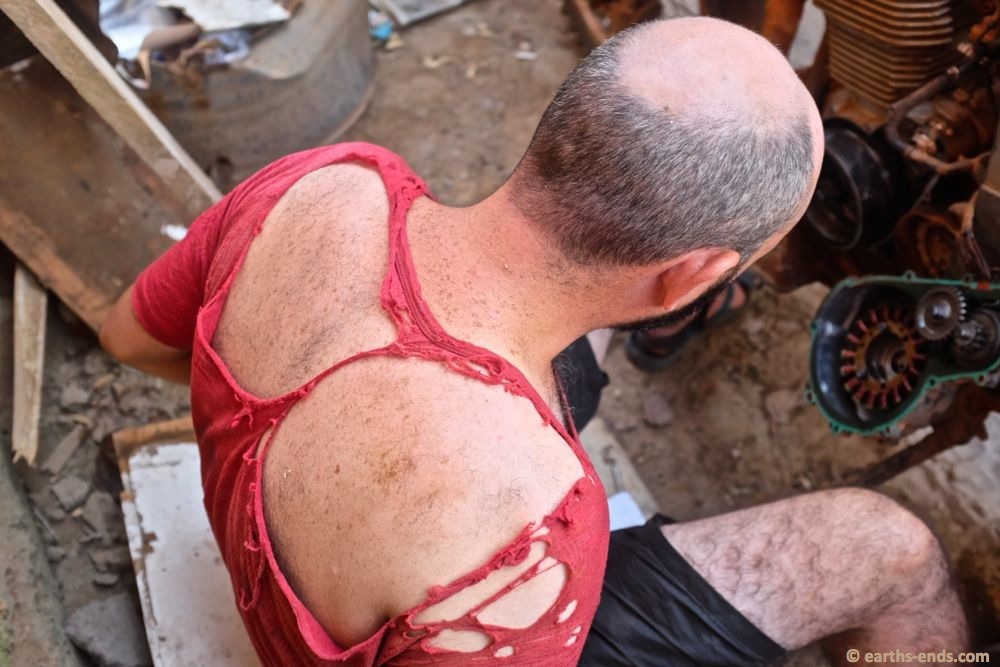
NSFW – Big Red’s last stand.
The reason we were sticking so doggedly to our clothing was that it was all expensive 100% merino wool. Merino is a wonder fabric and most of our on-the-road wardrobe (including our underwear) is made of it. The main benefit of wool is that it does not support bacteria, which is what makes you and your clothes stink. Provided your clothes are dry they can go weeks without a wash without smelling. Also, they keep you warm even if they get wet, unlike most other fabrics. This is why we didn’t want to get rid of them, as we would have to wash or cloths a lot more often in synthetic materials. But now….it just had to be done. Mick threw the shirt out, even though, as he reminded me many times since, “it still had a few more washes in it, easy.”
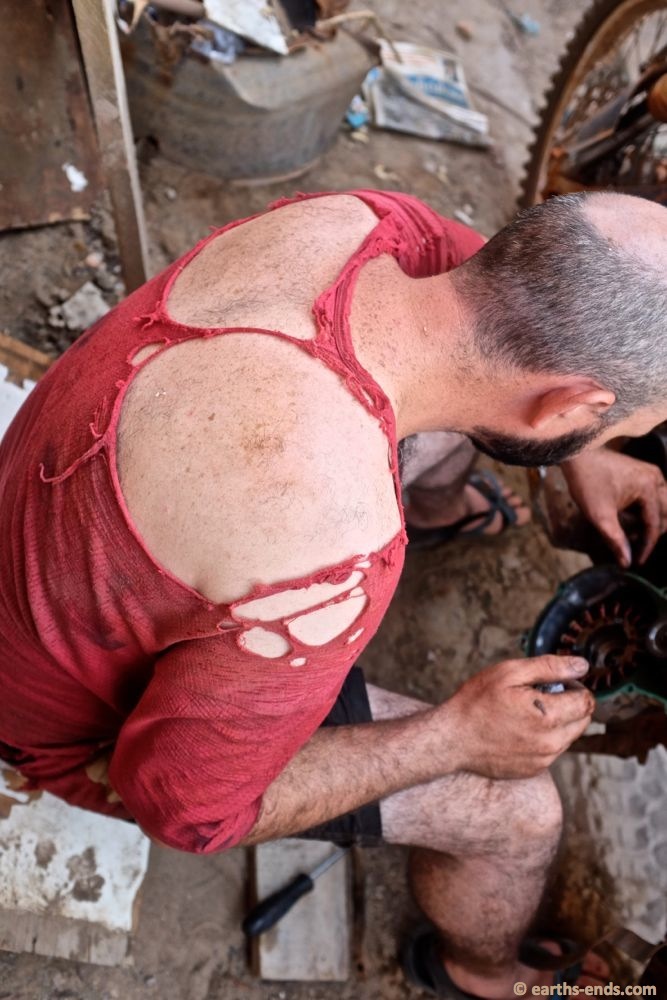
Mick grudging admitted its best days were behind it.
The next morning we finally set about leaving; more than a week after our planned 20 minute pit stop to the place. We packed up and said our goodbyes to the friendly Cameroonian caretaker that had looked after us. As I paid the bill I told him to keep the change thinking I was giving him a few extra dollars. Mick then informed me that no, I had given him $AUD10. It was an extravagant tip for these parts and it sent me stressing about money. Big time.
For us it is a delicate balance being conscious of spending whilst not allowing ourselves to fall into the void of stressing about money, expenditure and the real boggie man under the bed – lost income. It can become a slippery slope that sends you straight back to work and somehow into the arms of a gigantic mortgage and the feeling that you are safe and doing it all right.
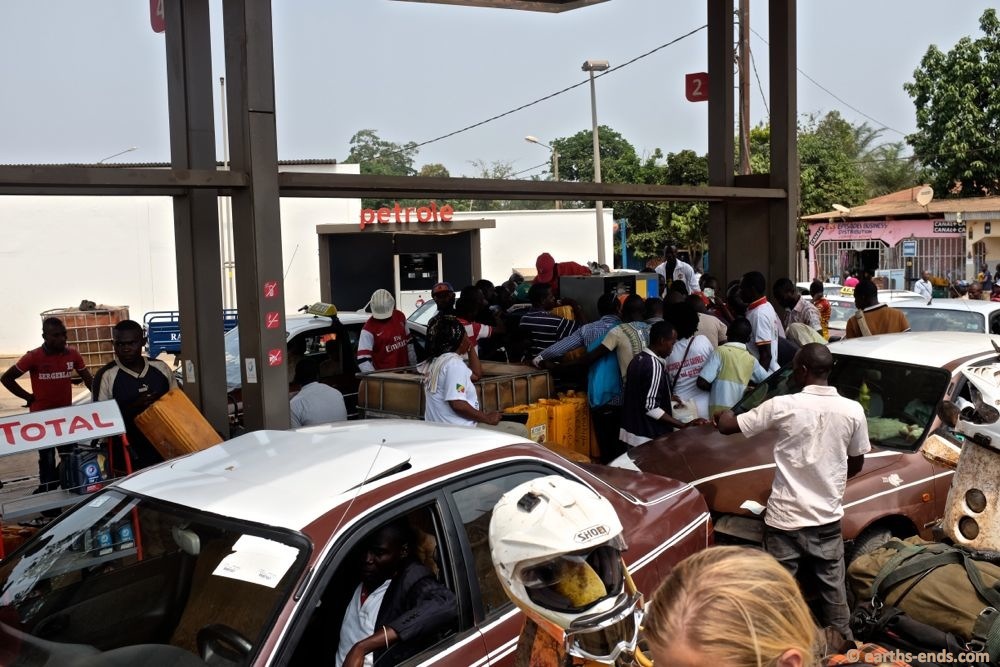
Attempting to get fuel – hours and hours of getting nowhere in stifling heat and humidity.
My money thoughts were promptly high-jacked when we rolled up to the petrol station. It was mayhem and we quickly learned the reason was that the town had been without fuel for 3 days. The station had just started up again when we arrived. We waited and waited while the lines got bigger and more chaotic. We learnt some people had been camped at the station for days waiting. After 2 hours of the futility of lining up was painfully apparent. There was no order and most frustratingly the bowser operators were prioritising filling up the black marketers first who would give them a cutback and then take two steps from the bowser where they were trying to get double the price out of people. Annoyed with the whole state of affairs and sweltering in the heat I decided to go into the air-conditioned servo-shop and get some drinks and snacks.
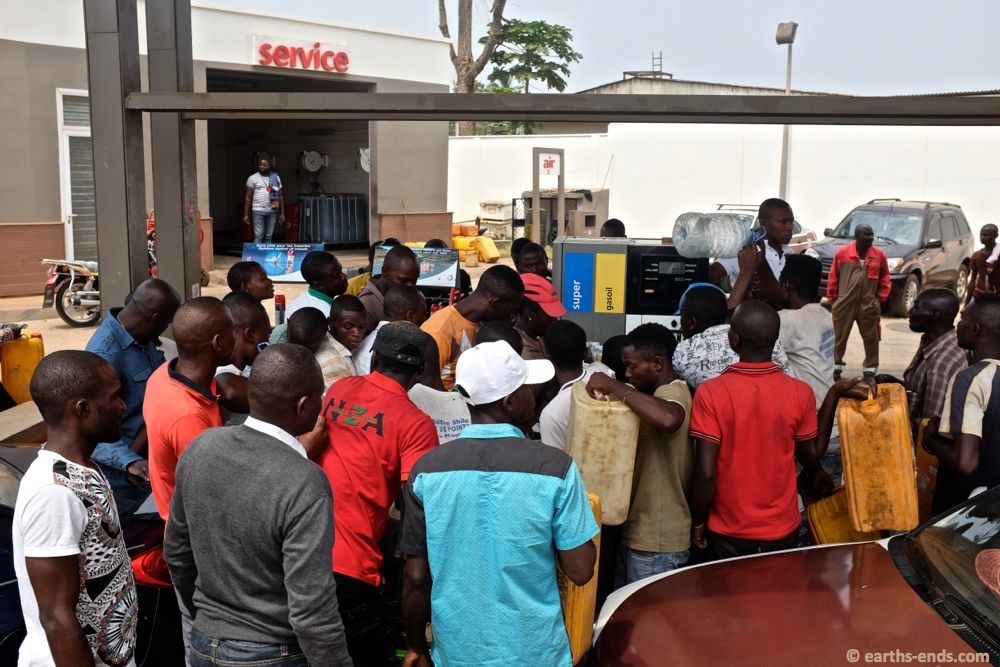
Amongst the scrum at the bowser you can see the black market fuel sellers pushing in then creating more congestion and shamelessly selling the fuel at a remarkable price.
Inside waiting was a Chinese man who I got chatting to as I wasn’t one to miss the opportunity to practice my Mandarin. I found out that he was an engineer living in Ouesso with his father and brother and together they ran a construction firm. He said he didn’t mind it here, saying it was a good place to do business and that “China has just too many people.”
It turns out he was from Nanjing, a city near to where I had spent several years. After a nice chat I told him I had to return to the bikes and wait for a chance to get fuel. As I went to leave he became very thoughtful and said to me in a serious tone “because you speak my language, I feel that I must help you.” Then before I knew it he had ordered one of his workers to fill our bikes up with fuel from their black market stash. I told him it was not necessary but he was so serious that he ‘must’ help us. Afterward we tried to get him to take some money but he refused. He said the fuel was from the company and it is fine. I said, “but what about your boss”. To which he said “I am the boss”. In this part of Congo, 60L of fuel costs a not so small fortune. We were just stunned. Perhaps as the Cameroonian caretaker had been, but while my generosity (the extent of it at least) was inadvertent, this guys was not.
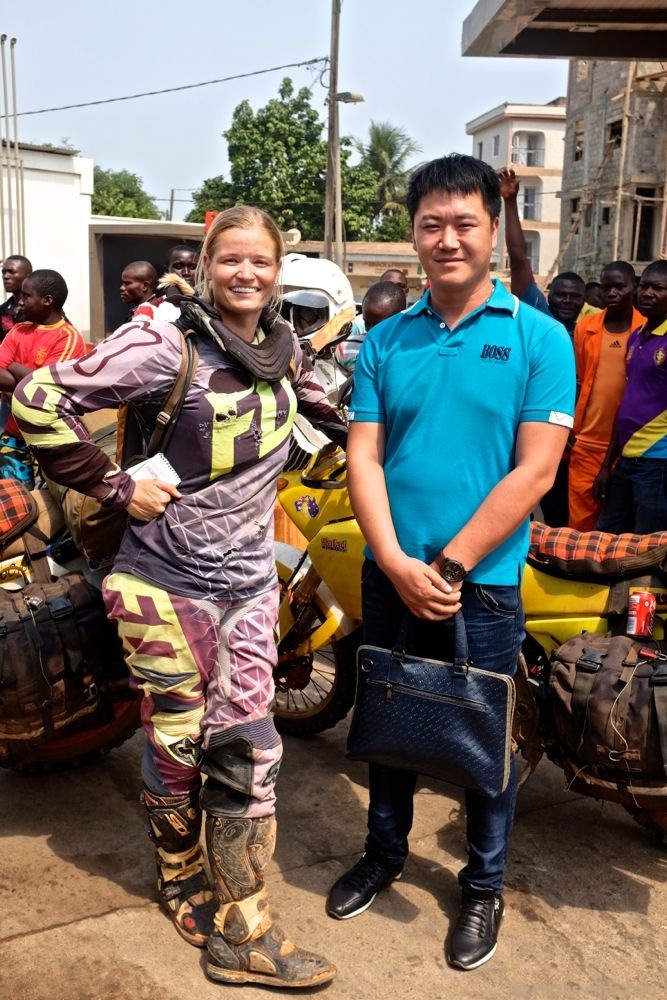
Our knight in shining armour.
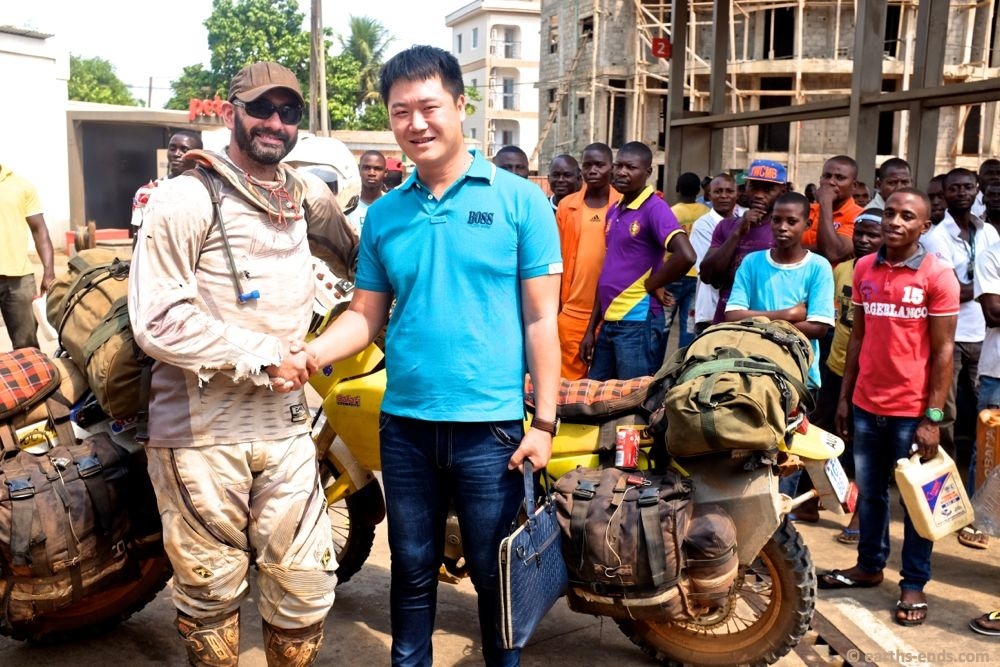
We couldn’t get over his generosity. Especially as it saved us more hours waiting in the sun.
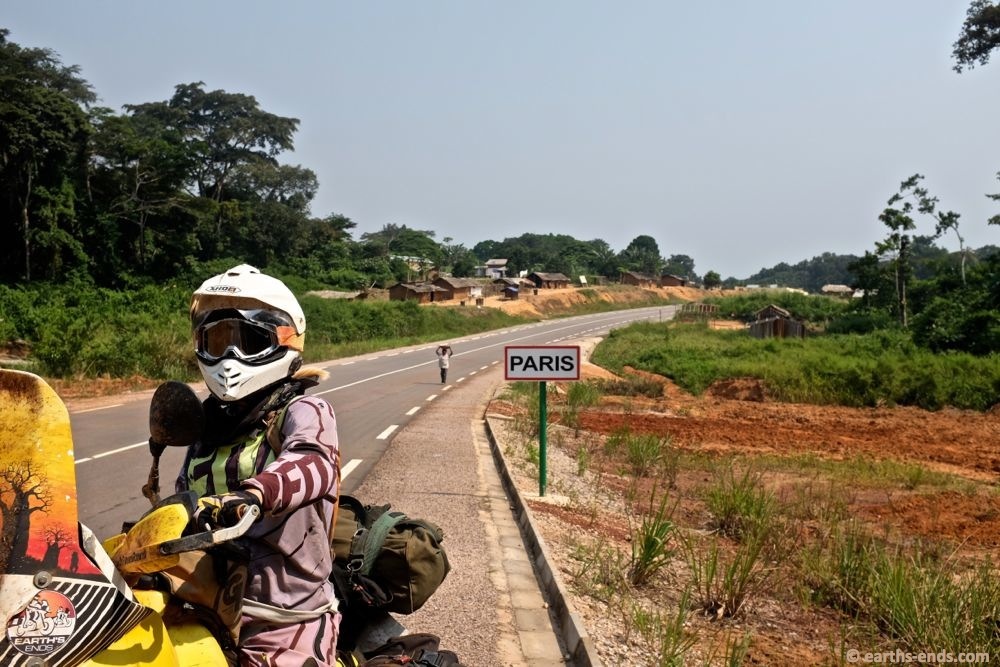
Mick enjoying pointing out that he took me to Paris. Wrong Paris.
So half the day was over by the time we were fuelled and moving which made a border crossing unlikely for that day. On the bright side Mick had succeeded in getting his bike to run a bit cooler than before. But it was still outside the realms of the norm and running a few degrees hotter than mine. We ended up making 275km for the day before finding a nice little auberge for the night in Souanke.
Tomorrow a new country awaited us.
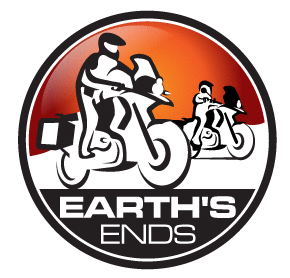 Earths-Ends
Earths-Ends
Recent Comments